THE CONFIDANT

For Danielle Sheer of Bottomline Technologies, trust is a guiding star, shaping her approach as an advisor to the business P56
 Michael Lanza innovates in the insurance industry with Selective Drive P10
Kate Kelly talks acquisitions and thinking forward at Bristol-Myers Squibb P108
Michael Lanza innovates in the insurance industry with Selective Drive P10
Kate Kelly talks acquisitions and thinking forward at Bristol-Myers Squibb P108
Inclusion Lives Here.
Work(place)Forward underscores Arrow’s commitment to innovation, powered by global inclusion and diversity. We bring together employees from all over the world who have unique perspectives, experiences and varied backgrounds to help us all innovate and grow our Arrow business and our careers.

Together, our global community fuels technology innovation that inspires and drives our shared success, now and Five Years Out. This is Work(place)Forward. Join us.
careers.arrow.com
“I’VE HAD THE BENEFIT OF WORKING IN A SPACE WHERE THERE HAVE BEEN A LOT OF FIRSTS, AND WE’VE SEEN THAT BUSINESS SCALE, MATURE, AND EVOLVE TO BE THIS HIGHLY FUNCTIONING, WELL- OILED MACHINE.”
IRIS CHEN, GOOGLE

TECHNOLOGY NETWORK
“BEING ABLE TO ADVISE A COMPANY ON THESE CUTTINGEDGE FORMS OF TECHNOLOGY IS EXCITING AND ALSO A CONSTANT CHALLENGE; IT NEVER GETS STALE.”
GREG ANSEMS, HONEYWELL
A dozen future-facing legal leaders in the tech industry detail their accomplishments and lessons learned
 Cover: Gillian Fry; Courtesy of Honeywell (Ansems), Jay Tsai (Chen)
Cover: Gillian Fry; Courtesy of Honeywell (Ansems), Jay Tsai (Chen)
P54
Contents Implement Feature
P22
A former educator with an engineering background, Daniel Kelly protects Vista Outdoor’s IP across nearly forty brands
P31
Prudential Financial’s Deborah Wright on how meaningful engagement leads to remarkable outcomes
P66
Iris Chen turned her career doubts into a position at Google despite having no prior tech experience
P85
Toshiba America Electronic Components’ Suzy Lee ensures that the people around her have the mentoring, learning, and development opportunities they need to excel
P89
Eric Lentell is doing everything he can to keep up with Fitbit’s exponential growth, all while keeping the company’s mission at the center
P34
To win any competition, you must stand out from the crowd. That’s why Hoyt (CJ) Davis III of PUMA has enjoyed such great wins.
P46
After living on a sailboat, marrying his high school sweetheart, and becoming an elite attorney in private practice, Steve Sparks thought he’d achieved it all. A tragic diagnosis helped him reprioritize his life.
P96
Rob Rieders spent years with 20th Century Fox, LucasFilms, and Pixar before trading it all in for on-demand delivery company Postmates

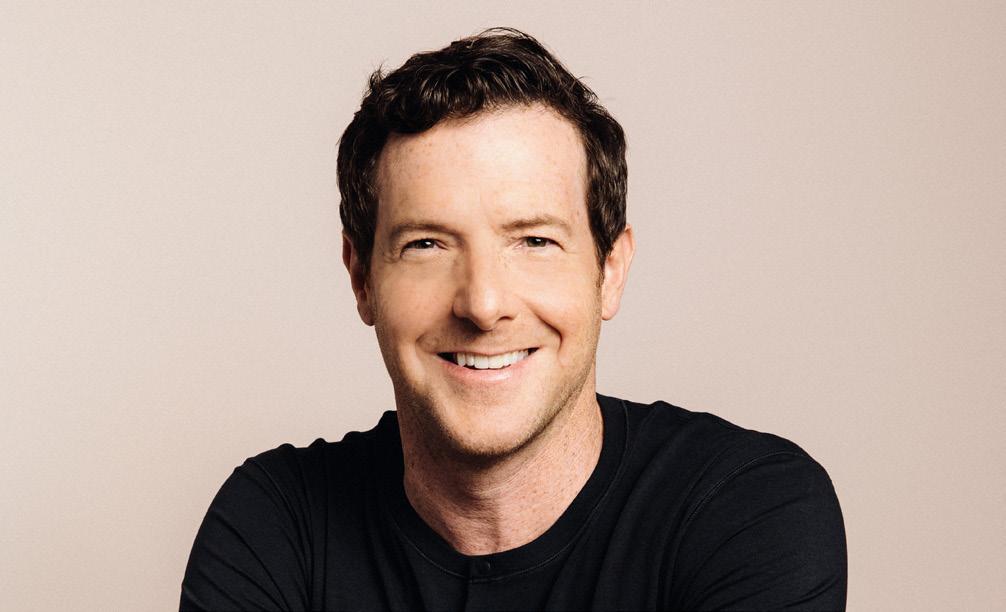 P96
P96
Contents 4
P34 Courtesy of PUMA North America (Davis III), Courtesy of Postmates (Reiders)
Lead Evaluate
P114
Deryl Ward takes his leadership role at Builders FirstSource seriously, mentoring and developing his team as the company expands
P119
Becoming a lawyer was in Jacqueline Hobbs’s blood. Today, at Duke Energy, collaboration and strong relationships are critical to her outstanding record of achievement.
P144
Stephanie Plasse helps A+E Networks maintain its place at the forefront of the television industry
P148
Brian Friedman on working for JetBlue Airways, a “values-driven company” where caring for customers, the communities they serve, and one another is key
P164
Stephanie Gayden helps Goldman Sachs go deeper than the tip of the iceberg when it comes to fintech
P128
Fifth Third Bank’s Christopher Garvey shares the secrets to his success, both in private practice and in-house

P138
Megan Ryan worked hard to become a high-level executive at Nassau Health Care Corporation. Today, she works harder still to manage her 3,300 employees.
P168
JPMorgan Chase’s Eileen Shin speaks to why she loves the challenge of understanding the ever-changing investment banking field as well as global financial affairs
 P128
P128
Courtesy of Fifth Third Bank (Garvey), Courtesy of JPMorgan Chase & Co. (Shin) Modern Counsel 5
P168
Creative VP, Creative Kevin Beauseigneur Director, Editorial Kevin Warwick Managing Editor Hana Yoo Senior Editor Frannie Sprouls Editors Melaina de la Cruz KC Esper Contributing Editor Julia Thiel Designer Gretchen PeGan Contributing Designer Mary Delaware Staff Writers Sara Deeter Billy Yost Corporate CEO & Publisher Pedro A. Guerrero Chief of Staff Jaclyn Gaughan VP, Sales Kyle Evangelista VP, Hispanic Division Vianni Lubus VP, Finance David Martinez Director, Client Services Cheyenne Eiswald Senior Client Services Manager Rebekah Pappas Client Services Manager Brooke Rigert Director, Talent Acquisition Elyse Schultz Senior Talent Acquisition Manager Haylee Himel Director, Business Development Jenny Vetokhin Manager, Business Development Elif Negiz Director, Strategic Partnerships Krista Horbenko Director, Strategic Accounts Taylor Frank Senior Events Manager Jill Ortiz Senior Director, Sales Ben Julia Sales Training Manager Alexa Johnson Content & Advertising Managers Megan Apfelbach Abby Levitsky Kemp Pile Kara Thomas Alex Tomalski Stuart Ziarnik Facebook: @ModernCounselConnect LinkedIn: @modern-counsel Twitter: @ModernCounsel Modern Counsel is a registered trademark of Guerrero, LLC. © 2020 Guerrero, LLC guerreromedia.com 825 W. Chicago Ave. Chicago, IL 60642 Reprints Reprinting of articles is prohibited without permission of Guerrero, LLC. Printed in China. For reprint information, contact Reprints & Circulation Director Stacy Kraft at stacy@guerreromedia.com Editorial Intern Blythe Long Contributors Joseph Charney Lori Fredrickson Will Grant Chip Hooper Russ Klettke Kathryn Kruse John Larrabee Keith Loria Bridgett Novak Zayvelle Williamson Andrew Wilson Jacob Winchester Clint Worthington Brianna Wright A.J. Zak Stephanie Zeilenga Photo Editors & Staff Photographers Cass Davis Gillian Fry Production Assistant Andrew Tamarkin 6 Masthead
Technology affects every facet of modern life.
It widens access to information, knowledge, and essential resources. It grants us opportunities for ongoing learning, training, and both personal and professional development. Technology also has the potential to bring greater convenience, unprecedented personalization, and unexpected joy to our lives. Whether we are looking for a playlist, a fitness regimen, a date, our next meal or getaway, decoration inspiration, or a group with a shared hobby, lifestyle, or cause, we trust technology to connect us with curated recommendations. Options abound. Answers await.
As transformative as technology can be, a foundation of trust remains vital if we are to tap into its tremendous promise. Our cover star, Danielle Sheer of Bottomline Technologies, speaks to the importance of trust as an advisor to the business and in building relationships with clients and colleagues. Technologies from algorithms to robots to vast communication systems are built by human beings. They are used by human beings. They work in concert with human beings, complementing and enhancing our activities. As Jerry Levine of IPsoft notes of artificial intelligence, “We want to augment, not replace, people.” Technology increases efficiency, automates menial tasks, and gives us more time to concentrate on the things we care about—but only if we trust it to do so.
This issue’s feature section, Network, spotlights legal executives working in the rapidly iterating realm of technology. Thanks to technological advancements, employees scattered across the country and the world can communicate and collaborate with each other and build trust. Companies can develop data-driven strategies to attract and retain personnel and clients alike. And leaders can harness technology to forecast and manage risk.
But there will always be some risk.
As a whole, we human beings remain unpredictable and, in many ways, mysterious to ourselves and each other. We can vet our would-be partners, babysitters, entertainment choices, and employers through exhaustive analyses, building meticulous profiles of our ideal matches. Technology is a powerful tool in this respect. At a certain point, however, we must make a decision, an act of faith based on what we know now.
Trusting in our judgment, we blaze forward in full career, into an unknowable future.
Editor’s Letter
 Hana Yoo Managing Editor
Hana Yoo Managing Editor

Gillian Fry
Modern Counsel 7
You’ve Built It Now Share It American Builders Quarterly highlights leaders and projects on the cutting edge of today’s US building industry. For editorial consideration, contact info@americanbuildersquarterly.com
Implement
Celebrating legal leaders and their latest departmental and corporate efforts and achievements, including transactions, expansions, negotiations, inclusion initiatives, and more
Michael Lanza EVP, General Counsel, and Chief Compliance Officer Selective Insurance
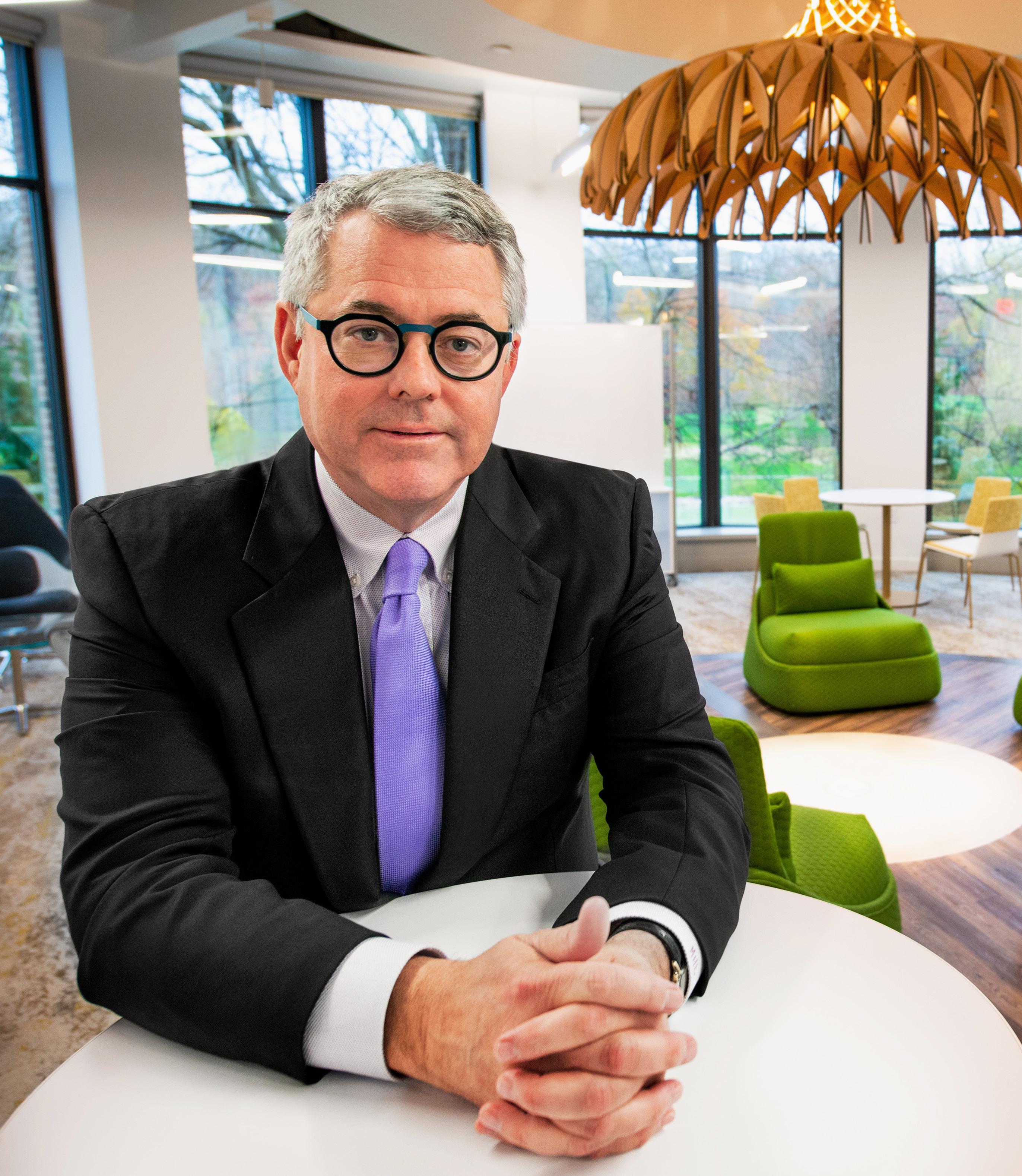 Peter Vidor Photography
Peter Vidor Photography
10
General Innovation
Michael Lanza has expanded the traditional role of general counsel over the past fifteen years, finding innovative ways to benefit both Selective Insurance customers and American society as a whole
 By Sara Deeter
By Sara Deeter
11 Modern Counsel
MICHAEL LANZA IS
REDEFINING
WHAT
IT MEANS
to be a legal leader. As executive vice president, general counsel, and chief compliance officer at Selective Insurance, a Fortune 1000 company that is one the most respected commercial property and casualty insurance holding companies in the nation, Lanza naturally has oversight of the company’s legal strategy, government affairs, and compliance matters.
Throughout his fifteen years at Selective, Lanza has pushed beyond the scope of a traditional general counsel role, committing himself to finding innovative and inspiring ways to create the best possible experience for Selective customers as well as for the communities it serves across the United States.
A graduate of the University of Connecticut and University of Connecticut School of Law, Lanza spent years honing his expertise in private practice and in domestic and international in-house counsel roles before coming to Selective in 2004. Since then, Lanza has coordinated with teams from all across the company on an array of different projects, from the development of a seven-acre solar facility to the creation of a cross-functional Innovation lab that looks for new insurance and risk management products and services.
But one project in particular has stood out from the crowd: the development of an innovative “Insurtech” risk management product and service that detects distracted driving called Selective Drive.
“Insurtech—insurance-tech—is kind of like fintech for banks,” Lanza explains. “It’s about using technology to innovate and find ways to deliver efficiencies and innovations for our customers within a regulated environment.”
The winner of the 2019 Business Insurance Innovation Award, Selective Drive is “essentially a telematics device—it connects to the driver’s car and can detect speed, location, harsh turning, fast acceleration, braking, and whether or not there’s been an accident,” Lanza says. “But the really cool part is that, in addition to those capabilities, it can detect when drivers use their phones. Distracted driving is one of the biggest dangers on our roads today; Selective Drive is one way we are working to help make people and communities safer.”
Each driver using Selective Drive connects their phone to the system, enabling it to recognize when a driver texts, takes a call, or even when they use Bluetooth. Each driver receives a score based on their driving performance, and that score is negatively impacted every time the driver uses their phone.
“The National Highway Traffic Safety Administration says that any sort of distraction is a problem and talking on the phone—even using a Bluetooth device—is distracting,” Lanza points out. “An estimated 25 percent of car accidents involve phone usage, and car accidents are the number one cause of workplace deaths. Until drivers are as vigilant about putting down their phones as they are about wearing a seatbelt, Selective Drive is vital.”
But the impact of Selective Drive was designed to extend beyond the driving skills of any one individual, Lanza says. Rather, it is specifically geared toward corporate-owned fleets of vehicles. If a florist, for example, owned half a dozen different delivery cars and vans, they could use Selective Drive to see how their drivers were doing and evaluate whether those drivers were being safe. As Lanza points out, “It’s bad for business as well as for individuals on the road when drivers aren’t responsible.”
Of course, Selective is not the only institution committed to making roads safer. Lanza has worked with the National Center for State Courts to address this issue. “We thought that if courts were going to have an alternative sentencing mechanism for drivers charged with moving violations, the program should involve learning the ramifications of distracted driving,” Lanza says. This led to Selective’s funding of the driving simulators.
Typically classified as misdemeanors, moving violations can include infractions such as speeding, running a stop sign, failure to use a seat belt, or driving in the carpool lane with no other passengers in the vehicle. Drivers with moving violations are frequently required to pay a fine as a penalty. But some people, Lanza notes, are not always easily able to pay those fines.
“Courts were having issues where people were being thrown in jail because of their inability to pay the fine,” Lanza says. “State courts are extremely overburdened and crowded due to funding issues, and we saw the driving simulator as a way to help
Implement 12
alleviate that burden for court administrators as well as to help make sure that people don’t go to jail just because they can’t pay a fine.”
Through the alternative, simulation-based sentencing program, drivers with moving violations are able to “go through the simulator and prove that they can handle certain scenarios” instead of paying the fine.
“If we can help the courts be more efficient, prevent deaths on the highway, or make our customers safer, it’s important that we do that,” Lanza emphasizes. “To me, part of the role of the general counsel of any publicly traded company is to make sure that the company is able to do things that benefit society.”
Extraordinary Service
In support of the National Task Force on Fines, Fees, and Bail Practices—a project of the Conference of Chief Justices, the Conference of State Court Administrators, and the National Center for State Courts—Michael Lanza and Selective sponsored a driving simulator safety training pilot project, testing whether simulators are an effective sanction in traffic-related cases where people are unable to pay their fines and fees.
In recognition of his extraordinary work, the National Center for State Courts inducted Lanza into the Warren E. Burger Society, which honors individuals who have demonstrated an exemplary commitment to improve the administration of state court justice. Other Society members include esteemed politicians and legal minds such as Nicholas de B. Katzenbach, Judith S. Kaye, Howell T. Heflin, and Ellen Ash Peters.
Lanza also serves as a board member for the Newton Medical Center Foundation and as president of the Selective Insurance Group Foundation.

“Distracted driving is one of the biggest dangers on our roads today; Selective Drive is one way we are working to help make people and communities safer.”
13 Modern Counsel
Peter Vidor Photography
Expanding Knowledge
To Robert Mignanelli, innovation is a critical component of a Pearson’s success and realizing its mission
By Sara Deeter
Implement 14
ROBERT MIGNANELLI HAS MANY titles: senior vice president; chief operating officer, legal; and associate general counsel, technology, operations, and strategy. You could call him a facilitator, an agent of change, and a liaison between business and legal leaders. But according to Mignanelli, what he actually does is look around corners.
“One of my primary jobs is to continue to innovate, to see what’s out there, what’s coming next, and how we can get better,” the SVP explains. And at Pearson, the world’s leader in learning products and services, Mignanelli has spent the last several years innovating and strategically transforming the legal department so that it better serves both the business and its global mission.
A graduate of the Columbus School of Law at the Catholic University of America, Mignanelli spent just a few years in private practice before he realized that he wanted to learn more about business functions. And soon after earning an MBA from the University of Arizona’s Eller College of Management, Mignanelli was offered the perfect opportunity to cultivate the skills he needed to operate at the intersection of law and business: a position as corporate counsel at an Arizona-based start-up company called LeapSource.
“A start-up is where you want to be if you want to understand how businesses get created, how they’re financed, how they’re run and operated, and how they’re creating marketing offerings,” Mignanelli explains. And those lessons have paid dividends at Pearson, where Mignanelli has worked since 2001.
Throughout his nearly two decades at the company, Mignanelli has continued to evolve professionally, serving in a variety of business-facing roles and
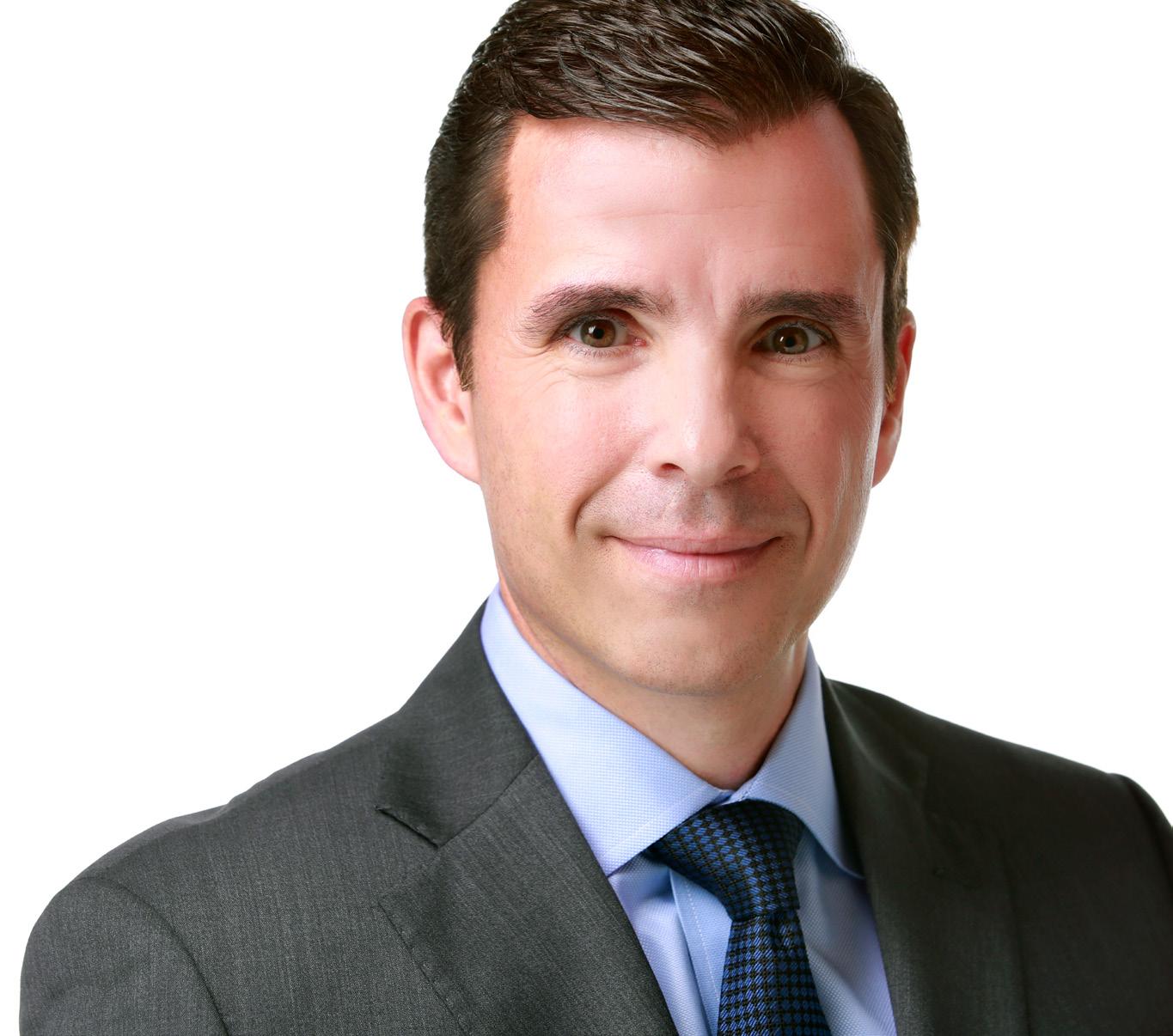
expanding his knowledge of the company, its purpose, and its people. And the company is extremely purpose driven, Mignanelli says. “Pearson’s mission is to help people make progress in their lives through learning, to change people’s lives through education,” he says. “At sales conferences or corporate events, we often have the opportunity to hear from people who have used our products or services.
“They talk about how their lives are much better and how the lives of their families have dramatically improved because of our offerings,” Mignanelli continues. “It’s incredibly powerful.”
But a strong mission has to have a strong foundation, Mignanelli notes. “It all starts with our people,” he emphasizes. “We have absolutely world-class people who are radically passionate about providing products and services and educational tools that really help people.”
Joy Saphla, president at Morae Global and close partner of Pearson’s, attests to Mignanelli’s high priority for Pearson’s people. “Bob’s vision, leadership, and internal advocacy for change were instrumental in the transformation of Pearson’s legal department,”
David H. Smith Modern Counsel 15
Robert Mignanelli SVP, Chief Operations Officer, and Associate General Counsel of Technology, Operations & Strategy Pearson
she says. “He recognized early on the value of embracing our partnership as a critical part of Pearson’s legal function, and he led the charge in bringing us all together as a unified team with laser focus on shared objectives.”
The next layer of the foundation, to Mignanelli’s mind, is achieved when all departments at the company, including the legal department, embody business principles. “We want to be as efficient as the business itself,” Mignanelli says. “We need to use resources to their maximum potential and make sure that our operations are in line with how the other business functions in the organization are operating.”

How do we make sure that the right resource is delivering the right service at the right time so that the business can meet its objectives? How can the legal department deliver services to the business in the most efficient and cost-effective way? These are the questions that Mignanelli asks himself as a leader of both the legal department and the business.
During Mignanelli’s tenure at the company, he has found technology to be a critical means of answering those questions. But technology is never the sole answer, he warns. “Technology is a piece of the answer,” says the SVP. “You often hear that applying technology to a bad process just gets you a technology-enabled bad process. Instead, you have to identify the problem and understand and optimize the current processes, and only then can you
Clutch Information Management & Discovery Litigation, Regulatory and Investigations Phoenix Business Solutions Digital Transformation Specialists Morae Legal Innovation and OnDemand Resources Morae Global Corporation www.moraeglobal.com
WE’VE BEEN WHERE YOU ARE & WHERE YOU STRIVE TO BE.
info@moraeglobal.com
“We don’t want to transform for the sake of transformation. Everything that we do as a legal department should line up in support of the company’s mission and strategic objectives.”
16
look for technologies that facilitate the processes and make them better.”
One of Mignanelli’s major efforts to use technology to improve processes and meet the needs of the business has been the creation of a transactions services center, underpinned by an enterprise legal managaemnet system. The system includes a a web portal that allows business users to submit requests for contract-related legal services and contract management functionality that allow for the processing of the requests. “The portal intakes requests and automatically routes the request to the appropriate person within the Center for handling,” Mignanelli says. “Both the portal and contract management system provide my legal team with real-time data regarding the type of demand coming into the center and how that demand is being handled, which helps us determine whether we have the right people and resources in place to meet the needs of the business. It also provides us with data to improve our operations and provide strategic insights to the business.”
Expertise Spotlight
In 2017, the Pearson legal department committed to deliver £300 million in annualized savings by the end of 2019. It partnered with Morae Global to transform its legal department from a high-touch, concierge-style Center of Excellence (COE) to a world-class Transaction Services Center (TSC). The TSC manages the intake, delivery, and management of transactional legal services through effective use of tools, resources, processes, and standards. Pearson and Morae Global assessed, designed, and rolled out the TSC, including the implementation of its demand and contracts management systems. These systems, in conjunction with Morae’s on-demand resources, serve as an extension of the Pearson legal team.
“Reducing costs by £300 million is no small feat, and it cannot be accomplished by making small tweaks,” says Morae Global President Joy Saphla. “We had to change the way the department works and interfaces with its clients. This was only possible due to Bob’s leadership, vision, and commitment to transformation.”
But the more Mignanelli learns about the business’s needs and all the cutting-edge processes and technologies on the horizon, the more he works to be intentional about changes within the legal department.
“We don’t want to transform for the sake of transformation,” Mignanelli says. “Everything that we do as a legal department should line up in support of the company’s mission and strategic objectives.”
Its close collaboration with Pearson is just one example of how Morae Global is leading transformation in the legal services industry. Law firms and law departments see Morae as a trusted advisor that can help them design, build, and operate concrete business solutions, integrating people, processes, technology, and data.
“Technology is a piece of the answer . . . applying technology to a bad process just gets you a technologyenabled bad process.”
Modern Counsel 17
From the Ground Up
Chief Legal Officer Howard Hirsch was given the freedom to create a legal department from scratch as the first corporate general counsel at Griffin Capital. Now he instills that same sense of autonomy and independence in his team members.
By Sara Deeter
HOWARD HIRSCH KNOWS THAT BUILDING A LEGAL department from scratch is about more than just hiring new employees. It’s about fostering an agile mind-set, providing opportunities for learning and development, and establishing a culture that inspires employees to work toward community impact with the same energy and commitment that they bring to each and every business interaction. And as chief legal officer (CLO) at Griffin Capital Essential Asset REIT, a publicly held real estate investment trust, and before that at Griffin Capital, a nationally renowned investment asset manager based in California, that’s exactly what Hirsch has been able to accomplish.
Implement 18
Something New
Hirsch has always wanted to “be involved in working towards legal solutions that make good business sense,” he says. And after graduating from the John Marshall Law School, Hirsch remained true to his solutions-oriented ideals as a corporate attorney.
“I really tried to focus my practice on being more of a practical lawyer,” the CLO offers. “I looked at the law but also the business side whenever I gave advice to clients. And that attitude landed me at Griffin Capital.”
Howard Hirsch Chief Legal Officer Griffin Capital Essential Asset REIT

Edward
Carreon
“It’s been a challenging move, certainly, but also an exciting one—I’m invigorated every day by the work I do.”
Modern Counsel 19
According to Hirsch, he worked quite closely with Griffin for several years while in private practice. So closely, in fact, that in 2014, when the company’s leaders asked him to leave his firm and come to Los Angeles from Atlanta to be their general counsel, Hirsch knew and worked with not only all of the executive officers but “just about every single employee at Griffin.”
“I had a great deal of institutional knowledge of the company, and I believed in their vision. And they were also just very persistent,” he adds with a laugh. “I was happy where I was, but they were very determined that I should come work for Griffin.”
“One of the things that’s most important to me is making sure my team has flexibility, authority, and some autonomy,” Hirsch says of his team. Of course, that autonomy-focused approach would not work without high-caliber external legal teams, notes the CLO.
“I have a very simple strategy,” Hirsch says of his coordination with those external teams. “I expect the same level of legal service and attention that I provided when I was in private practice and that my team provides to our business functions. I rely on outside counsel for different matters, and I need to have complete trust in their abilities and responsiveness. There are only two types of outside counsel, one that makes my life easier and one that makes my life harder. You can easily figure out which type I prefer.”
But when Hirsch was hired, there were no other corporate or securities lawyers working in-house at Griffin. As a result, he had the responsibility—and the freedom—to create his own legal department.
“I got to create the procedures and standards that I wanted,” Hirsch recalls. “I didn’t have to fall in to how it was being done before and was able to create them from scratch. It’s been a challenging move, certainly, but also an exciting one—I’m invigorated every day by the work I do.”
A Team Effort
Hirsch wants his team to feel invigorated, too. “I never want my team to be bored or complacent,” he says. To help empower his team to grow and develop, he encourages them to handle some of the legal projects they find interesting and engaging and then employ outside counsel to manage some of the remaining matters.
To achieve that level of complete trust, Hirsch always makes a point of hiring lawyers, not law firms, he explains. “Not every firm has great lawyers in every single area—they like to tell you they do, but that’s not always the case,” he points out. “You’ve got to find people who are comfortable working with your team, who understand the work, and who think your business is important.”
The Griffin Community
In addition to building and developing the legal team, Hirsch has also worked with the company’s leadership team to cultivate a culture that is “open and welcoming.”
Griffin’s Women’s Initiative, for example, includes all women working at the company—not just the lawyers. As Hirsch notes, an open and welcoming community is one that not
“I expect the same level of legal service that I provided when I was in private practice . . . I rely on outside counsel for various matters, and I need to have complete trust in their abilities and responsiveness.”
Implement 20
Initiating Good
To Howard Hirsch, Griffin’s Charitable Initiative is one of the company’s greatest achievements: it brings together a cross-functional unit of volunteers who promote and participate in community activities throughout the year, from building houses with Habitat for Humanity to organizing backpack drives at schools and volunteering at food banks.
“It’s a very popular initiative here,” Hirsch says. “It’s all about creating activities and selecting causes where people want to participate, and it’s been helpful for building company morale and also being a part of doing good in the communities around us.”
Venable Celebrates Howard Hirsch
Chief Legal Officer
Griffin Capital Essential Asset REIT, Inc.
We are delighted to recognize the great work of our client and friend.
only embraces employees themselves but also the things that are most important to those employees.
“We have a monthly grant program where the firm donates $1,000 to a cause that’s important to one of our employees,” he says. “The approval process is thorough but not intimidating and includes writing a short essay explaining why that charity is worthy of the grant.”
That program and many other initiatives have seen great success at Griffin, Hirsch says. And after helping build a culture and team capable of sustaining that kind of success, Hirsch feels revitalized and ready to take on the future.
“I’ve been practicing law for more than twenty years,” he says, “but sometimes it feels like it’s only the beginning.”
More than a law firm, Venable is a network of trusted advisors serving businesses, organizations, and individuals in many of the most important aspects of their work. With more than 850 professionals delivering services around the world, we help clients connect quickly and effectively to the experience, insights, and advice they need to achieve their most pressing objectives.
CA | DC | DE | MD | NY | VA Sharon
Christopher
750
A. Kroupa, Esq.
W. Pate, Esq.
East Pratt Street, Baltimore, MD Attorney advertising.
21
 Daniel Kelly
Deputy General Counsel, Corporate Services
Vista Outdoor
Daniel Kelly
Deputy General Counsel, Corporate Services
Vista Outdoor
Implement 22
Nicki Griffith Photography
Teaching Is His Trademark
Deputy General Counsel Daniel Kelly draws on his background as an educator to protect Vista Outdoor’s IP
By Andrew Wilson
INTELLECTUAL PROPERTY LAW IS MORE complex than many people realize: while both patents and trademarks fall into the category of IP, they’re so different that few lawyers are well versed in both. Daniel Kelly is one of the few. As deputy general counsel, corporate services, with chief responsibility for intellectual property, he oversees the patent and trade -
mark portfolios at Vista Outdoor, the company behind brands such as CamelBak water bottles and Bell bicycle helmets. “Patents are all about protecting inventions, and trademarks really are all about protecting brands,” he explains. “In my experience, it’s rare in big firms that you find people who regularly practice both patent and trademark law.”
Modern Counsel 23
Kelly started his law career in an IP boutique firm. “I was exposed to all forms of intellectual property law. I litigated and prosecuted on both sides of patent and trademark, so I got a broad exposure,” he says. He also had an undergraduate degree in engineering, which is one requirement for eligibility to take the patent bar exam. “Throughout law school, anybody who learned that about me said, ‘Oh, you should consider becoming a patent attorney,’” he recalls.
Kelly’s experience is put to good use at Vista Outdoor, which owns nearly forty brands, each with their own product lines and new products always in development. “The product development teams involve me fairly early in the process when they’re aiming to develop a product that would have new features or new capabilities,” Kelly says.
The goal is to understand whether a patent can be obtained, which is difficult when dealing in mature and highly specialized consumer product markets. “Optics have been around for a long time, so to get something that’s patentable in the optics space, usually you’re working on a fairly novel edge of optics technology,” Kelly explains. “To find patentable ideas there and to get them protected is usually challenging.”
When addressing a legal challenge, “I strive to be a bit of a consultant, and I also can’t help being a bit of an educator,” Kelly says. That makes sense for a former teacher: prior to attending law school, he worked in a junior high and high school teaching everything from seventh-grade music to twelfth-grade physics.
“Clients especially, but even coworkers, appreciate hearing the ‘why’ behind the legal opinion, because it empowers them to make good decisions,” he adds. “That’s how I always try to manage laterally towards clients: empowering them with information. And I found that generally works.”
As a manager, Kelly tries to stay informed without micromanaging. Occasionally that means his team will spend time on a question that he already knew the answer to, but he’s learned that’s not always a bad thing. “It allows your direct reports opportunities to learn on their own,” he says. “In my experience both as a manager and someone who’s been managed, I’d prefer that environment to one where you have the supervisor constantly looking over your shoulder.”
As a mentor, Kelly says there’s no magic—it’s all about being friendly and available, especially to young lawyers recently out of law school. “They’re often put in these environments—either a corporate environment or an in-house or a private practice environment— where they’re tasked with giving legal advice to people who have been in business for years, and it’s daunting,” he says. “I owe it to the next generation of lawyers just to be accessible—to help pass on and ease that transition.”
Kelly has two pieces of advice for what might be called “impostor syndrome.” “One is ‘fake it till you make it.’ Put a different way, some friends of mine and I used to talk about ‘the confident walk’—if you just walk confidently, like you’re supposed to be in any particular place, you can walk into almost any environment and be convincing,” he says.
“The second element is just a good dose of humility; being willing to learn from your mistakes. When you do go in with confidence and you blow it, you embrace the failure and learn from it so that you don’t make the same mistake again,” he says.
Confidence is also an invaluable trait when it comes to working with clients, Kelly says, because many aspects of the law can feel urgent or frightening to people who don’t routinely deal with them.
“For a business or a person running a business to find out that they’ve been sued is generally not good
“I strive to be a bit of a consultant, and I also can’t help being a bit of an educator.”
Implement 24
news. The one thing a lawyer who’s seen hundreds of lawsuits can do is, you can immediately walk in and say, ‘OK, this is survivable, this happens to a lot of companies, and here’s the game plan,’” he says. “It’s a great thing to be able to calm down a business stakeholder or client when they’re facing any legal risk.”
Kelly says calm is the preferable mode when practicing law, rather than excitement—though he admits that he will “geek out” over a new invention that he’s working on. Still, his favorite part of his job is educating those around him. “It’s always exciting to be involved in the development of a new invention, or brand, or marketing campaign. But as fun as that can be, I get the most satisfaction out of helping people navigate the legal issues and solve problems.”
Integra IP NZ Ltd.:
“Integra IP NZ Ltd works with Dan on complex Brand Protection Investigations and Enforcement actions, often in challenging environments. Dan’s understanding of Intelligence led solutions drives successful operations. A strategic thinker and consummate IP professional.”
—Simon C Greatorex, Managing Director
Protect your reputation, revenue and customers from trademark abuse, caused by intellectual property infringement and counterfeit sales with our innovative online brand protection solution. DON’T LET INFRINGERS PROFIT AT YOUR EXPENSE +1 857 880 2067 welcome@yellowbp.com DALLAS, US • NEW YORK, US • SHANGHAI, CN VARBERG, SE • LONDON, UK • MECHELEN, BE • PARIS, FR THE LARGEST CHINA BASED BRAND PROTECTION TEAM AND THE BROADEST ONLINE SEARCH IN THE INDUSTRY. Do you know exactly how vulnerable your brand is to online IP infringement? yellowbrandprotection.com/modern-counsel FREE REPORT 1,000 online marketplaces 35 social media platforms 50 mobile app stores and communications apps World-wide Websites & Domains Contact us to get a free brand protection status report or visit YellowBP_Advert_ModernCounsel_2,3x10,2_WORK_2.indd 1 2019-11-13 17:32
25
Building Perspective from the Inside
At NGL Energy Partners, Ryan Collins seized the chance to help develop the company’s legal department. In the process, he grew as a lawyer in ways he never expected.
By Jacob Winchester
Implement 26
IN 2015, RYAN COLLINS GOT THE OPPORTUNITY TO dive into something new: helping build the fledgling in-house legal department of NGL Energy Partners, a Fortune 500 diversified midstream master limited partnership (MLP).

“Early in my career, I worked with Kurston McMurray—our current general counsel—at a private firm where he was a partner,” Collins recalls. “We seemed to hit it off and work well together, so later, he offered me a position as an in-house attorney with NGL.” At the time, Collins was working as outside counsel at another private firm, which left him both weary of tabulating his career in billable hours and seeking a different challenge.
Today, as vice president of the legal function and assistant general counsel for NGL, Collins says he has grown exponentially as a lawyer since undertaking his current role at the MLP. The career path he has forged centers around M&A and transactional work but also involves identifying large-scale risks for the business.
“In my view, our role as an in-house department is to review documents, situations, and facts, then apply the law to those and communicate internally in a way that helps fully inform our senior management,” Collins explains. “We’re here primarily to identify and analyze risks or opportunities, and ultimately, we’re helping the businesspeople make very informed decisions, as opposed to simply saying ‘yes’ or ‘no.’”
Prior to recruiting McMurray in February 2015 and Collins in August 2015, NGL employed a single lawyer, relying largely on the help of outside counsel. This approach proved costly, Collins says, and lacked the strategic benefits of a full in-house legal department.
“One of our specific goals in the beginning was to establish a centralized point of communication
Ryan Collins VP of Legal and Assistant General Counsel NGL Energy Partners
Collins
Lindy
Modern Counsel 27
for all of the outside counsel. Different departments would hire outside counsel, so we didn’t have a complete picture of who was working with the company, and NGL was paying for that in the form of inflated legal expenses every year,” Collins says. “We wanted to drastically shrink the list of specialized outside counsel that the company utilized to a smaller group that we knew we could count on and was familiar with NGL and our goals and vision.”
McMurray, Collins, and the team also set about instilling the importance of building legal considerations into the daily operations of other NGL departments. “We really have worked to educate the more business-facing departments—those who might not have a legal knowledge base—about certain considerations and outcomes that we, as lawyers, maybe have already run into in the past so that they can utilize that knowledge in future dealings,” Collins explains.
This helps the business avoid potential problems before they occur as well as limit unnecessary and expensive litigation. “I’ve always been more interested in transactional law, rather than litigation,” Collins says. “Working together with a team to build something bigger than yourself has always been more appealing to me than trying to clean up a mess.”
As far as career philosophies, Collins says he simply channels hard work and practicality to yield the most ideal outcomes for the company. “If you have a foundation based on hard work and respect—whether that’s respecting the work you’re doing, the people you’re working with, the processes of the company, or the law in general— then things are normally going to work out for you,” he says.
Implement 28
“If you have a foundation based on hard work and respect . . . then things are normally going to work out for you.”













We are proud of your feature in Modern Counsel magazine for your work at NGL Energy Partners LP. Your commitment to the legal profession has earned you the respect as a leader and role model. We look forward to our continued relationship. GTLAW.COM Greenberg Traurig is a service mark and trade name of Greenberg Traurig, LLP and Greenberg Traurig, P.A. ©2019 Greenberg Traurig, LLP. Attorneys at Law. All rights reserved. Attorney Advertising. °These numbers are subject to fluctuation. ¬Greenberg Traurig’s Berlin o ce is operated by Greenberg Traurig Germany, an a liate of Greenberg Traurig, P.A. and Greenberg Traurig, LLP. *Operates as a separate UK registered legal entity. +Operates as Greenberg Traurig, S.C. »Greenberg Traurig’s Milan o ce is operated by Greenberg Traurig Santa Maria, an a liate of Greenberg Traurig, P.A. and Greenberg Traurig, LLP. ∞Operates as Greenberg Traurig LLP Foreign Legal Consultant O ce. ^Operates as a branch of Greenberg Traurig, P.A., Florida, USA. ¤Greenberg Traurig Tokyo Law O ces are operated by GT Tokyo Horitsu Jimusho, an a liate of Greenberg Traurig, P.A. and Greenberg Traurig, LLP. ~Greenberg Traurig’s Warsaw o ce is operated by Greenberg Traurig Grzesiak sp.k., an a liate of Greenberg Traurig, P.A. and Greenberg Traurig, LLP. Images in this advertisement do not depict Greenberg Traurig attorneys, clients, sta or facilities. 33211 GT_Law Greenberg Traurig, LLP GT_Law GreenbergTraurigLLP GREENBERG TRAURIG, LLP | ATTORNEYS AT LAW | 2100 ATTORNEYS | 41 LOCATIONS WORLDWIDE ° Iskender H. Catto | Chair, Power Industry Projects and Restructuring Practice MetLife Building | 200 Park Avenue | New York, NY 10166 | 212.801.9200 Albany, Amsterdam, Atlanta, Austin, Berlin , Boca Raton, Boston, Chicago, Dallas, Delaware, Denver, Fort Lauderdale, Houston, Las Vegas,London*, Los Angeles, Mexico City+, Miami, Milan», Minneapolis, Nashville, New Jersey, New York, Northern Virginia, Orange County, Orlando, Philadelphia, Phoenix, Sacramento, San Francisco, Seoul∞, Shanghai, Silicon Valley, Tallahassee, Tampa, Tel Aviv , Tokyo¤, Warsaw , Washington, D.C, West Palm Beach, Westchester County Congratulations to our friend and client,
Collins
Ryan
McAfee & Taft salutes our friends at NGL Energy Partners

We are honored to be a part of your strategic transactions team.
Since our founding in 1952, McAfee & Taft has been the go-to law firm for successful businesses seeking high-quality service, superior value, and innovative legal solutions.
www.mcafeetaft.com
AVIATION | BANKING AND FINANCIAL INSTITUTIONS | BANKRUPTCY, BUSINESS
RESTRUCTING & WORKOUTS | BUSINESS
TRANSACTIONS & FINANCE | CORPORATE & SECURITIES | EMPLOYEE BENEFITS
ENVIRONMENTAL LAW | HEALTHCARE
INTELLECTUAL PROPERTY | LABOR & EMPLOYMENT | LITIGATION | OIL & GAS
REAL ESTATE | TAX & FAMILY WEALTH
It’s also important to approach situations with an inside perspective and an eye on practicality, he says. “When you’re working as outside counsel, a lot of times you don’t see things until they get to litigation. As in-house counsel, you get to see things while they’re on a potential path to litigation,” Collins says. “And you get to say, ‘Hold on, can we stop this thing before we get to a point where there really aren’t any winners from a business perspective?’”
Looking back at the course of his time with NGL as a member of the in-house team, Collins says he’s glad he took on the challenge of becoming assistant general counsel relatively early in his career.
“I’ve been really pleasantly surprised at how much better of a lawyer I think I’ve become. That’s not just from working with some incredibly talented and smart lawyers and seeing how other firms handle different transactional procedures, but because I’ve been able to work with other aspects of the business, from commercial to accounting to insurance to tax to HR,” he says.
“I feel like I’ve become a much more complete lawyer, and I’m not sure I really expected that.”
30
“We’re here primarily to identify and analyze risks or opportunities, and ultimately, we’re helping the businesspeople make very informed decisions, as opposed to saying ‘yes’ or ‘no.’”
Building Relationships That Matter
Prudential Financial’s Deborah Wright on the importance of engaging meaningfully with others both in and outside of the office
By Sara Deeter
Deborah Wright Prudential Financial VP–Corporate Counsel and Prudential Asset Resources General Counsel
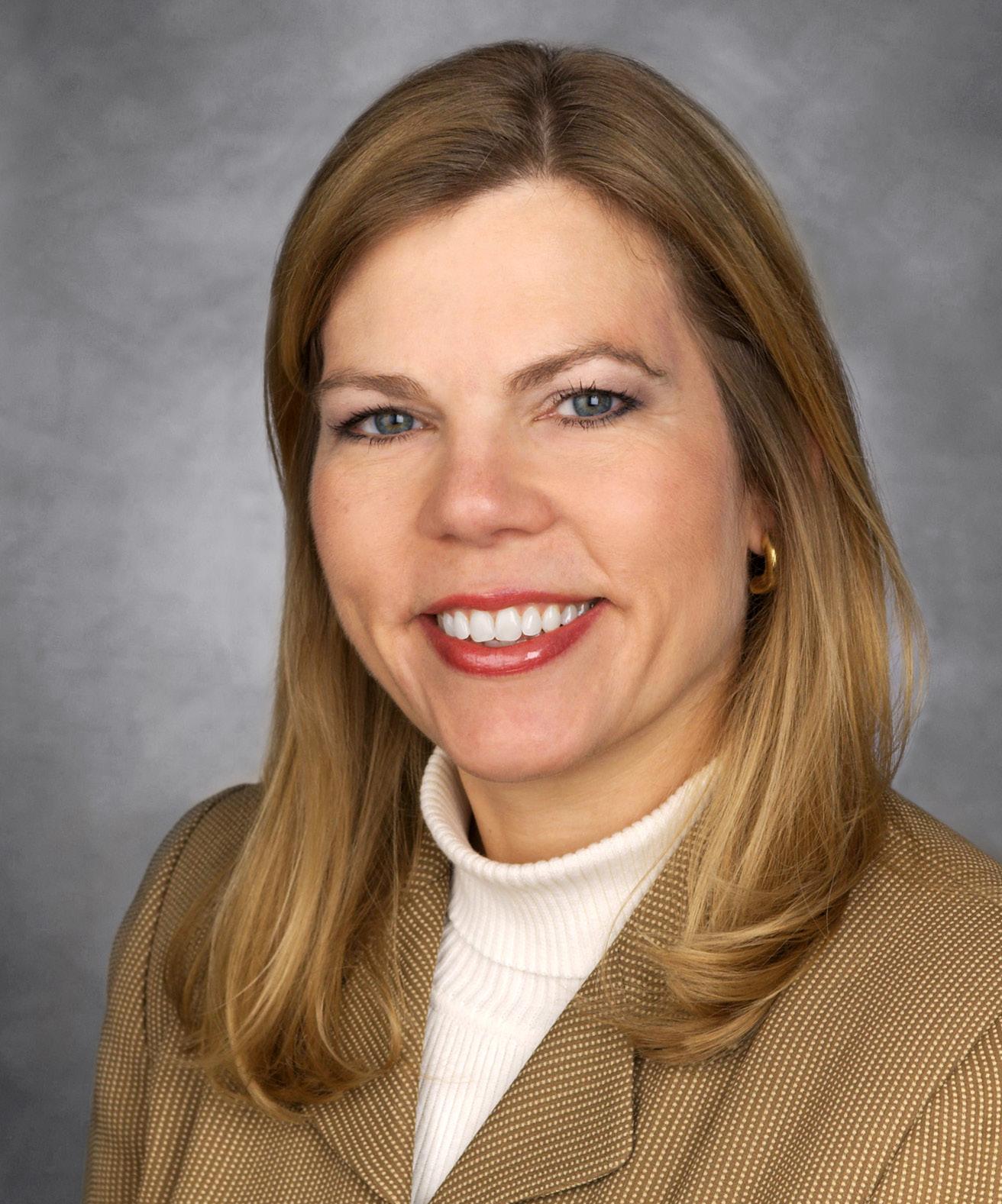
Prudential Asset Resources Courtesy of Deborah Wright 31
WHEN YOU GET TO A CERTAIN POINT IN YOUR career, you’re often asked who helped you get there. Who were the mentors who helped you climb up the ranks to the C-suite, the leadership team, the board of directors? But Deborah Wright, Prudential Financial’s vice president and corporate counsel and the general counsel of Prudential Asset Resources (PAR), doesn’t really have an answer to that question.
“I can’t really say that I had any direct mentors— when I started my career in Corpus Christi, there were maybe ten women attorneys in the entire county,” Wright says of her years as an associate at Texas law firms Meredith, Donnell, and Abernethy and Kleberg and Head. “There just weren’t a lot of potential role models for me.”
But Wright did have “mentors by observation,” as she calls them: people she saw all around her whose behavior she wanted to emulate, and who still inspire her to this day. One example is a coworker who went with Wright and several of her colleagues on a business trip to New York City.
“We were all a little self-absorbed because we had struck a humongous deal,” Wright says with a laugh. “We were out until three o’clock in the morning at the closing, and when we got back to the hotel, this guy— who was known to be ‘a bit difficult’—stopped and engaged on a real, personal level with the front desk clerk. The clerk that all the rest of us were ignoring while we grabbed our keys.
“It made me stop and think about how much people matter,” Wright continues. “Whether it’s the people you work with, people you see on the street, or people in a restaurant, everyone deserves to have you stop, look them in the eye, and say hello.”
Meaningful engagement with those around you is critical for success inside as well as outside the office, Wright notes. A Fortune 500 company with operations all over the world, Prudential Financial helps both institutional and individual customers protect and increase their wealth.
As a leader at Prudential, Wright not only oversees PAR’s $100 billion portfolio of commercial real estate loans but also projects like PAR’s compliance and privacy efforts. Understanding and empathizing with other people is critical to that work, Wright explains, as it constantly requires her to “find the right balance between the interests of investors versus the interests of the company versus the interests of the borrowers versus the interests of the employees.”
Of course, Wright and her legal team are not expected to shoulder those responsibilities entirely on their own. Over the course of her fifteen years at the company, Wright has developed close partnerships with outside counsel and firms who advise Prudential on certain matters.
“We work with several go-to firms, two of which are owned by women,” Wright says. “And the primary law firm we work with is a large, international firm,
“Eighty to eighty-five percent of the attorneys (in the primary law firm) we use are women, members of the LGBTQ community, or members of another minority community.”
Implement 32
“Whether it’s the people you work with, people you see on the street, or people in a restaurant, everyone deserves to have you stop, look them in the eye, and say hello.”
Extraordinary Giving
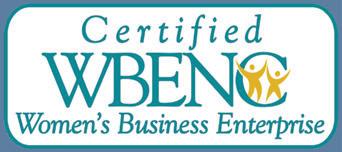
Prudential Financial’s entire legal department has very strong feelings about giving back to the community, Deborah Wright says, and she herself often participates in truly “extraordinary” events such as the National Association of Women Lawyers’ Night of Giving.
“It’s technically a networking event for women, but the ‘price’ of admission is donations—like children’s books or school supplies—for the chosen beneficiary,” Wright explains. “It’s so special to combine women’s professional growth with our desire to help the less fortunate.”
and the group within that firm that we work with is overwhelmingly diverse—80 to 85 percent of the attorneys we use are women, members of the LGBTQ community, or members of another minority community.”
Wright prizes these relationships with outside counsel, not just because of their business value to Prudential but also because of their wider meaning and impact on the legal community.




“There’s been a big push across the legal industry within recent years to make meaningful changes to increase diversity,” explains Wright, who sits on the board of the National Association of Women Lawyers (NAWL) and serves as a liaison between that organization and the Prudential legal department. “This includes a drive to get women attorneys into higher levels of responsibility in law firms and corporations, and also to advocate for women’s issues in general throughout the country.”
Wright has also been heavily involved in organizing NAWL’s annual General Counsel Institute, a two-day program held in New York City for women in-house counsel across the country, which she’s worked with for many years but had the opportunity to chair in 2018. The event unites women attorneys from every industry who have broken new ground for themselves as well as being committed to helping those around them get where they need to go.
Deborah Wright is an intelligent and practical lawyer as well as a strategic thinker. She pays attention to the issues that matter and calmly resolves tough problems. It’s always a pleasure to work with her.
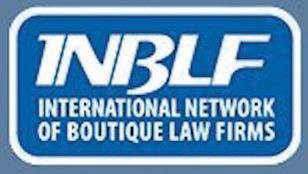
213-236-3624 oconnorcochran.com First class skills, boutique price, personal attention. Closing your real estate loans and workouts efficiently. Congratulations from Maura O'Connor and Jim Cochran
O’Connor Cochran LLP:
33
Assistant General
 Hoyt (CJ) Davis III
Counsel, Sports Business and Legal Affairs
PUMA North America
Courtesy of PUMA North America
Hoyt (CJ) Davis III
Counsel, Sports Business and Legal Affairs
PUMA North America
Courtesy of PUMA North America
Shooting for the Top
CJ Davis on PUMA’s goal of standing out in a crowded field of basketball and lifestyle brands
By Sara Deeter
TO WIN ANY COMPETITION, YOU HAVE TO STAND out from the crowd. That’s why PUMA partners with some of the fastest athletes on the planet— athletes known for their ability to jump farther, leap higher, and play harder than any other. That’s also why Hoyt (CJ) Davis III, PUMA’s assistant general counsel for sports business and legal affairs, has seen such great success across his ten-plus years at the company.
Davis knew the challenges of establishing a career within the sports space. “Getting into a career connected to sports in general is very competitive, whether it’s working for a team or on the corporate legal side,” he explains. “But if it’s something that makes you passionate about going to work, then it’s worth pursuing.”
He began his pursuit of a career in sports in college, planning out the steps he needed to take to make that career happen, learning the importance of hard work, thinking outside the box, networking, and remaining persistent in his efforts to build relationships. Those
Modern Counsel 35
tactics led him to PUMA, which in turn laid the groundwork for his career to date.
“When I joined PUMA, I was a new attorney, so a lot of the work I did was general corporate legal work,” Davis explains. “But as time went on, I started working on more and more US sports marketing initiatives across all PUMA’s core sports categories: football [or soccer], golf, track and field, and auto racing, and now I do that work in addition to working on some of our global sports marketing related matters, like our Olympics programming, Cobra PUMA Golf [PUMA’s golf equipment business], and now basketball.”
The legal team at PUMA is relatively small, Davis notes, so everyone does some general corporate work in addition to their areas of expertise. The size of the legal team allows attorneys to develop and grow into their own specialties, and Davis’s specialty on the sports side of the business has been of particular value to the company in recent days, as PUMA has begun reentering the basketball market.
“Back in the seventies, eighties, and nineties, PUMA was one of the bigger brands in basketball,” Davis says. “We were working with stars in the basketball league, like Ralph Sampson and Walt ‘Clyde’ Frazier. Clyde was the brand’s first ever signature athlete and the first player to have his own signature shoe in the game—the ‘Clyde.’”
PUMA transitioned out of basketball in the late nineties, Davis says, but is now looking to leverage its history as it re-enters that market. “Having that strong heritage was really important for us in the relaunch,” Davis says of the company’s partnerships with legacy athletes like Frazier and Sampson.
“We’ve been out of basketball for two decades, but now we’re taking that heritage and relaunching it into the modern game. We’ve come out strong signing five first-round draft picks in 2019, including DeAndre Ayton and Marvin Bagley III, and two in 2020, including RJ Barrett, in addition to a number of veteran NBA players.”
But it’s not just about recruiting basketball players as PUMA ambassadors. Modernizing PUMA’s basketball heritage requires highly creative thinking, Davis points out, especially given how crowded the basketball market is.
“At PUMA, our basketball division seeks to stand out by creating great on-court performance products, but also by connecting to other areas that resonate with consumers,” the AGC says. “For us, that means connecting with fashion culture, basketball culture, music, and all sorts of other elements that factor into in the deals we do.”
In his role, Davis has spent a great deal of time overseeing those deals—negotiating and drafting all endorsements, partnerships, and sponsorships. Open communication with the company’s marketing and business teams has been critical to those efforts, Davis says, as well as staying constantly in tune with the company’s goals and priorities.
“That business alignment is crucial in helping us go from step to step and keep the business moving and adapting quickly,” he remarks.
“PUMA has grown immensely since I started, and we want to continue growing in coming years, continue building on our heritage.”
Implement 36
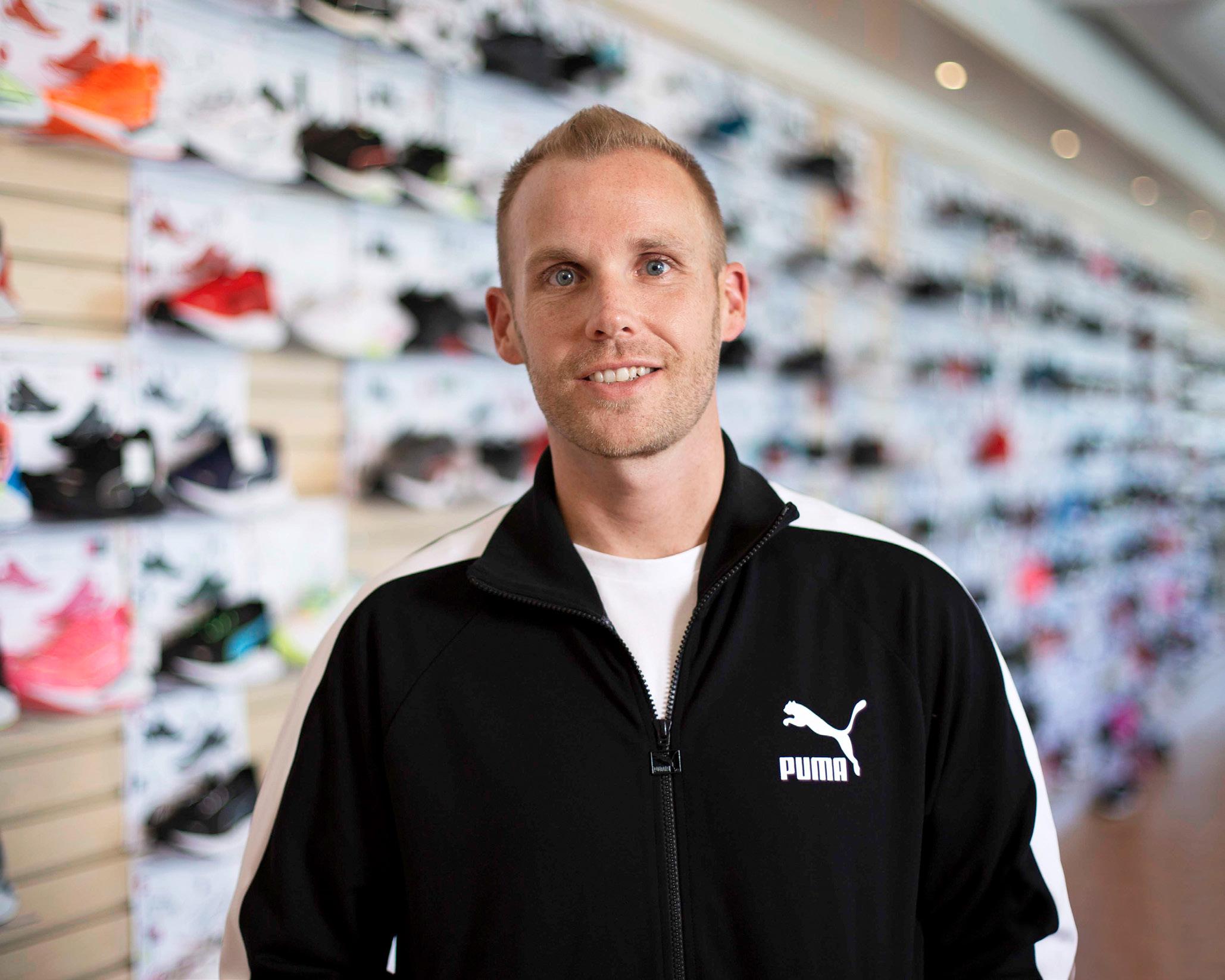
Courtesy of PUMA North America Modern Counsel 37
“Getting into a career connected to sports in general is very competitive . . . But if it’s something that makes you passionate about going to work, then it’s worth pursuing.”
According to Davis, there is one more skill that has allowed him to so effectively support the company as it reintroduces itself to the basketball market. And for a sports enthusiast like him, that skill is by far the easiest—and most fun—to cultivate.

“A great part of the job is just staying up to date on who and what’s relevant in each sport, what other players, leagues and the industry are doing, and how I can use that to help the business accomplish its goals,” Davis says. “For basketball in particular, you have to have an understanding of the basketball landscape and the legal issues that go with that, from youth basketball all the way up to the NBA, and there was a learning curve for all of us as we educated ourselves on basketball.”
And even after a decade at PUMA, and an entire career in the sports space, Davis is still eager to learn more about the industry and help the company evolve.
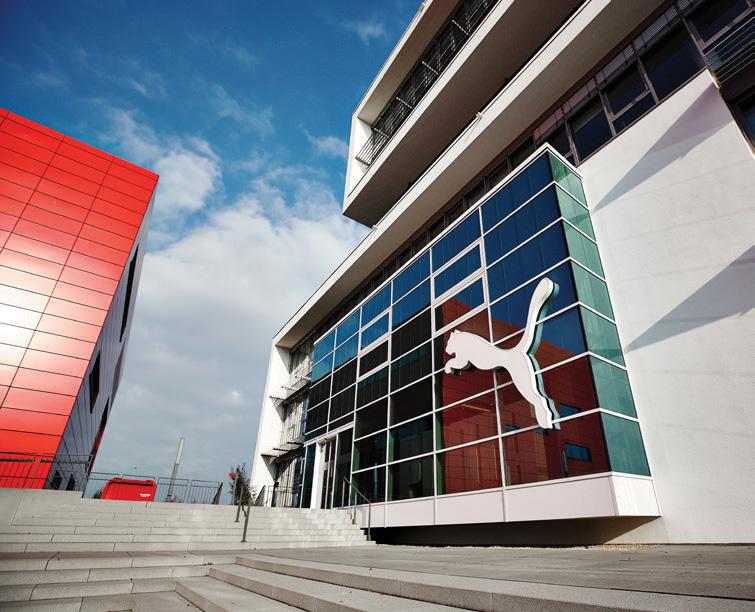
“PUMA has grown immensely since I started,” he says, “and we want to continue growing in coming years, continue building on our heritage. It’s very exciting to be a part of that.”
Nelson Mullins:
“C.J. continuously assesses emerging trends and applies best practices to all PUMA transactions. He does an exceptional job of identifying and mitigating risks while remaining solution-driven, helping PUMA achieve its business objectives.”
—Jay W. Fee, Partner
Brown Rudnick salutes
BOSTON HARTFORD LONDON NEW YORK ORANGE COUNTY PARIS PROVIDENCE WASHINGTON, DC ATTORNEY ADVERTISING brownrudnick.com ingenuity
C.J. Davis on this well-deserved recognition. We are honored to have the opportunity to work closely with C.J. and PUMA North America’s exceptional legal team.
inspires connects creates embraces wins
38 Nelson Mullins Riley
Scarborough LLP Attorneys and Counselors at Law Jay W. Fee, Partner & Chair of Sports Law Group One Post Office Square 30th Floor | Boston, MA 02109 617.217.4700 | nelsonmullins.com 25 Offices located in 11 states and Washington, D.C. 800+ Attorneys and Legal Professionals Practice Areas 100+ Strong commitment to leadership & service
and
&
Our Sports Law Practice is honored to collaborate with C.J. to achieve exciting
successful results for PUMA.
Nelson Mullins congratulates
C.J.
Davis, Assistant General Counsel, PUMA North America, Inc.
Eyes on the Ice Cream
Randy Sharbono is helping keep Schwan’s drivers safe with new camera technology
By Billy Yost
FOR MILLIONS ACROSS THE MIDWEST of the United States, the big yellow truck meant one thing: Schwan’s was on the way. The Minnesota-born-and-based food company initially began as a means for founder Marvin Schwan to distribute his family’s homemade ice cream to rural western Minnesota.
Today, Schwan’s Shared Services, a CJ Foods affiliate, offers popular brands such as Red Baron, Freschetta, Tony’s, Mrs. Smith’s, Edwards, and Pagoda to retail stores and food service venues, while Cygnus Home Service offers its nearly 400 products through its home delivery business, with 4,500 trucks in the field. Those trucks got an aesthetic makeover in 2010, but that overhaul wasn’t the only addition to the food delivery fleet.
Modern Counsel 39
Vice President and Assistant General Counsel
Randy Sharbono oversees safety for the companies and says the new Drivecam initiative is just finishing up a pilot program. The initiative includes both front- and rear-facing cameras that record and save the eight seconds before—and four seconds after— any force that is exerted outside of vehicle norms.

“This isn’t Big Brother,” Sharbono says. “It’s a tool that helps us identify and correct unsafe behaviors.” The VP says some drivers may not even be aware of certain unsafe behaviors, and in many instances, simply recognizing the behavior is all that is necessary to make a correction.
The Drivecam initiative is just one example in a series of progressive moves Schwan’s and Cygnus are making to protect their drivers, their customers, and the communities in which the companies operate. Twenty years into a career at Schwan’s that includes safety, Sharbono continues to keep the companies operating at their best but always prepares for the worst.
Trying to Do It All
Sharbono spent ten years in a firm dedicated to insurance defense work before going in-house at Schwan’s in 2000 in a litigation management role that was crafted specifically for him. Prior to his joining, the company had passed off its litigation to its insurance company and had little involvement with its legal function from then on. Serendipitously, that’s how Sharbono eventually got the in-house role—an odd opportunity for the lawyer, who had done so much work on behalf of Schwan’s but interacted minimally with anyone from the organization.
Upon going in-house, Sharbono was determined to stay as close to the pure lawyering part of his job as possible. “When the general counsel asked me what my vision would be, I said I would not only manage the litigation but do the litigation,” the VP says. “I loved the strategy of it and trying to figure out how to position the case to put the client in the best possible situation.” There was only one problem. It wasn’t remotely possible.
“The demands of the in-house role started to consume me,” Sharbono says. “Litigation is just one small part of the other responsibilities and business
“When we engage outside counsel, we’re looking for true partners that we’re able to work hand in hand with to create the most effective strategy.”
Courtesy
Implement 40
Randy Sharbono VP and Assistant General Counsel Schwan’s Shared Services
of
Schwan’s Shared Services
objectives of the role.” The lawyer now had internal clients who needed his help, often daily, for matters running a wide gamut. Stepping back to purely manage litigation was a tough transition but would prove the right move for the rising lawyer.

Zero Dollars Spent
The Drivecam initiative may be the latest in Schwan’s efforts to stay at the forefront of safety technology, but Sharbono has helped maintain rigid safety standards for close to two decades. “We carry large deductibles in each of our programs, and our view is that nobody can effectively manage that risk better than we can,” Sharbono says.
The in-house legal team takes a hands-on approach because outside counsel can’t be expected to understand the complicated inner workings of their business. “When we engage outside counsel, we’re looking for true partners that we’re able to work hand in hand with to create the most effective strategy,” Sharbono says.
Our team delivers quality and value with exceptional client service SYRACUSE | ITHACA hancocklaw.com Congratulations to RANDY SHARBONO on his achievements and recognition in Modern Counsel.
41
“I want everyone to always go home in the same shape as they came. Real success is zero injuries and dollars spent on vehicle accidents.”
Since 1997 the law firm of Margolis Edelstein has had the distinct privilege of representing one of the finest companies in the US and working with an outstanding leader, RANDY SHARBONO OF SCHWAN’S COMPANY.
We are delighted to congratulate Randy on his recognition by Modern Counsel. We value our relationship with Schwan’s Company, Randy, and his team, and we are grateful for their confidence in our firm.
Strategy remains a passion point for the VP, and he says working to craft it at a more advisory level is the perfect role for him. He takes the relationships he’s cultivated with select outside counsel very seriously.
“We’ve switched insurance carriers from time to time, and we’ve always made it a priority that the carrier has to agree that panel counsel is our list, not theirs,” Sharbono says. “We want experienced lawyers in that space.”
www.margolisedelstein.com
While he knows it may not be entirely realistic, Sharbono maintains the same hope for all of Schwan’s fleet employees, rain or shine. “I want everyone to always go home in the same shape as they came,” Sharbono says. “Real success is zero injuries and dollars spent on vehicle accidents.”

42
Aim for the Moon
As global vice president of legal, Matías Hercovich is guiding the explosive international growth of hospitality start-up Selina
 By Kathryn Kruse
Matías Hercovich Global VP of Legal Selina
By Kathryn Kruse
Matías Hercovich Global VP of Legal Selina
Manuel Hernández Modern Counsel 43
WHEN MATÍAS HERCOVICH LEFT HIS SILK TIE AT
home and first walked into his new office in the Casco Viejo section of Panama City, he thought he was following his boss’s instructions to dress down. Coming straight from the buttoned-up legal world of New York and Miami, used to suits and institutionalized formalities, he was shocked to find the CEO of Selina, his new employer, in T-shirt and flip-flops. “Flip-flops,” he says. “I thought, ‘Can I work in a place like this?’”
Years before, Hercovich had departed his native Chile to learn best practices at Columbia Law School and find opportunity in the US—dreams he had been fulfilling while working in immaculate offices with well-dressed people. Now he found himself the global vice president of legal at Selina, a hospitality and experiential start-up with a great track record. It also, apparently, came with flip-flops.
When he closed his first deal, a property in Nicaragua, he not only used his legal expertise but also demonstrated the cultural competency needed to gain the sellers’ trust. That proved Hercovich’s utility, and his blend of people skills and systems development has continued to be a huge benefit to Selina.
The company now holds more than fifty-five properties across fifteen countries on three different continents and is valued at around one billion dollars. “Almost a unicorn,” Hercovich says.
Founded in 2007 and named after the Greek goddess of the moon, Selina has been on a rocket-like trajectory, with locations throughout Latin America. And the company is continuing to expand: in 2019 it launched in the US (New York and Miami) and Europe (Portugal, Greece, and Germany), and is also on track to open properties in Asia and the Middle East in 2020.
Hercovich, who has been key to this growth, says his job is “to manage a talented group of lawyers to achieve company goals.” The legal department, which ran on a bare-bones staff of three when he arrived, is now thirteen strong. His role spans both supporting business development and gatekeeping.
“You don’t want to be the naysayer, but you don’t want to take risks that will hurt the company,” he says. Rather than letting those potentially contradictory functions conflict, Hercovich brings them together in a cohesive system.
Hercovich’s previous position had been general counsel for a Blackstone-backed corporate telecom infrastructure company. “It was very sophisticated,” he says. “But we were building towers. Our most important asset was steel. Steel—it has no feelings.” Selina offered a welcome change. “This company is about people making meaningful connections,” he says.
Despite the initial shock, he stuck it out, saw how well his coworkers treated each other, and fell in love with the company—informal footwear and all.
The feeling may not have been entirely mutual at the beginning. “I think the CEO felt that things would be better without lawyers. Like the world would be better without lawyers,” says Hercovich, laughing. He accepted the challenge of demonstrating his necessity, which took just a few months.
When Hercovich arrived at the company it mostly lacked standardized legal assessments, relying instead on instinct to achieve commercial growth. Unlike his previous employers, Selina had no existing framework to lean on. Hercovich applied the experiences gleaned over the course of his career to build a new structure, leading transformation to what he describes as a “faster and safer” method, utilizing standardized contracts and focusing on legal risk assessment.
This framework has facilitated the company’s scaling up. Before his arrival in 2017, the founders averaged one property closing every four months, whereas Hercovich says Selina now negotiates an average of 4.2 deals per week.
Along with changing contract systems, Hercovich insisted on other remodels after joining the company. Attorneys, both in-house and outside counsel, no longer receive incentives to close, and no attorney
“If you want an IPO, you need the house to be organized in a way it can be understood and fulfill promises.”
Implement 44
reports to a department outside of legal. “This was about ensuring the quality of evaluation and documents,” Hercovich says.
These shifts reflect a focus on the big picture. “If you want an IPO, you need the house to be organized in a way it can be understood and fulfill promises,” Hercovich explains. As Selina expands to the US, Europe, and Asia—areas where regulations are generally tighter—his systems will be tested. So far, his work has buoyed growth and supported the advantage of a detailed risk assessment.
“Every country is a different world,” Hercovich says. Most of the contract work in Latin America can adhere to a single legal backbone that runs through the region. Now, with the expansion into other continents, Hercovich must manage a team working in vastly different time zones, with varying cultural norms and legal traditions.
Still, he welcomes the challenge of replicating his previous success. “Ninety percent of the work is setting up structures that will function in more regulated and sophisticated systems,” he says.
As Selina grows, Hercovich’s department continues to oversee a long list of functions: corporate law, real estate law, labor, litigation, compliance and risk management, corporate governance, transactional work, and M&A—a dizzying array of duties that doesn’t seem to daunt him one bit. He subscribes to the company’s sensibility, which he describes as “taking their work, but not themselves, seriously.”
While Hercovich still hasn’t come around to doing this exploration in flip-flops, he admits that when working from home, he now sometimes does it in his socks.
Eversheds
“Matías’s strong commercial acumen, dedication, and drive to succeed are inspirational. He is an excellent lawyer who leads by example, and we congratulate him on his welldeserved recognition in Modern Counsel.”
–Wesley Pydiamah, Partner

Helping you take the advantage The local lawyers with global connections eversheds-sutherland.com © Eversheds Sutherland 2019. All rights reserved.
Sutherland LLP:
45
The Spark for Change
An unthinkable diagnosis spurred Steve Sparks to make a broader impact on children’s lives at the Hershey Trust Company
By Jacob Winchester
Implement 46
AFTER HAVING LIVED ON A SAILBOAT, MARRIED HIS high school sweetheart, and worked his way to a successful position as a private practice attorney, Steve Sparks thought he’d achieved it all. But then, in 1993, tragedy struck.

“My daughter was diagnosed with leukemia,” Sparks says. “I would say that before the diagnosis, I lived my life by the motto that he who has the most toys wins. While we were in the hospital, I realized that most of the stuff I had mattered very little and that I really needed to reprioritize to figure out how to make my life more meaningful.”
The realization was almost instant, he says, but structuring the implementation of this change in his life would take time. “She was in treatment for about three years. And when you’re dealing with a child with cancer, you’re in survival mode. You’re focused on every day as it comes. You’re not focused on how to find another job or change a career,” Sparks says. “It took a little while and a little courage to decide to do something I really hadn’t done before and institute this change in my professional life.”
After his daughter emerged successfully from treatment, Sparks decided to dedicate his career to improving the lives of children. He relocated his family to take an in-house position with the Nemours Foundation. One of the nation’s leading nonprofit children’s health systems, Nemours was established by philanthropist Alfred du Pont in 1936.
“I was their very first in-house attorney at Nemours. Prior to that, they didn’t have a legal function, so we had to establish a legal function, build a legal team, and demonstrate value. After we were successful in building a legal team, I was asked to oversee compliance and audit in addition to legal,” Sparks says. From there, he was asked to oversee aspects of government relations and was eventually tasked with overseeing the organization’s philanthropy efforts as well.
“When I started at Nemours, we were primarily in Florida and Delaware, and by the time I left, we were in seven states. That was due to a focused strategic plan, a commitment to the mission of serving children, and an amazing and truly collaborative effort
Steve Sparks SVP and General Counsel Hershey
Trust Company
Courtesy
Modern Counsel 47
“While we were in the hospital, I realized that most of the stuff I had mattered very little and that I really needed to reprioritize to figure out how to make my life more meaningful.”
of Hershey Trust
Defeating the Cycle of Poverty
The Milton Hershey School Trust was established in 1909 with the purpose of funding and overseeing a home and school for children in need. Over the course of a century, the school has grown to currently serve more than 2,100 girls and boys of diverse backgrounds.
In addition to his role as senior vice president and general counsel for the Hershey Trust Company, Steve Sparks has played a vital role in helping set the School Trust’s strategic direction and priorities as senior advisor to the board overseeing the Milton Hershey School. “In serving Mr. Hershey’s legacy, our mission is to provide children in need with a home and education through the school. Our ultimate goal is, through education and a nurturing home, to break the cycle of poverty,” Sparks says.
He has also worked to define success for the School Trust. “Success for a trust organization is not a question of just growing the organization. It’s about how many more children we are able to serve through growth and how many more children will get the benefit of a wonderful education, a safe place to live, and being surrounded by love and support,” he says.
“Those kids will go on to college, have successful careers, and have their kids and grandchildren go to college. That’s how Mr. Hershey’s legacy defeats the cycle of poverty.”
between all of the Nemours associates,” he says.
Sparks also undertook a nine-day, nine-hundred-mile bicycle journey from Florida to Delaware in an effort to honor those who had helped his daughter. In the process, he raised more than $100,000 for the foundation.
After years of working with the teams at the Nemours Foundation, Sparks set his sights on making an even greater impact. This led him to seize an opportunity to serve as senior vice president and general counsel for the Hershey Trust Company. “With the kind of funding available through the trusts, I think there’s tremendous potential to impact the lives of children for the better, and that potential is what brought me here,” he says.
Today, Sparks oversees the legal activities of the Hershey Trust Company and the three trusts for which it serves as trustee: the Milton Hershey School Trust, the MS Hershey Foundation Trust, and the Hershey Cemetery Trust.
“The most important part of my role is to work with the boards to help determine our strategic direction,” Sparks says. “Advancing Mr. and Mrs. Hershey’s legacy in serving children and the communities they so loved is the focus of the mission.”
In addition to oversight, Sparks and his team are tasked with a regulatory function. “As a state-chartered trust company, the Pennsylvania Attorney General and the Pennsylvania Department of Banking also have oversight over our institutions, and managing relationships with those offices is important,” he says.
Though his role is nuanced and fraught with complexity, Sparks says he works overall to align his team around one simple principle. “The culture and
Implement 48
the focus of our legal and governance function is to always remember the kids. We’re here to serve the kids, and whatever we do is aimed at furthering that mission,” he says.
Sparks also relies on a collaborative philosophy to ensure the best outcomes for his organization. “I don’t believe in using the law as something for power. I would rather, through relationships, discussion, and collaboration, have us come to the decision of what the right thing to do is,” he says. “If you identify what the right thing to do is, it will almost always be lawful.”
Looking back on his career, Sparks says the perspective he gained during his daughter’s illness was crucial in influencing how he operates both personally and professionally.
“I learned to put kindness and relationships as priorities in my life in a way I don’t think I did before,” he says. “As far as leadership, I was able to see that there’s a part of everyone that has genius, and my job as a leader is to figure out how to create an opportunity and space for that genius to come out.”
Potter Anderson & Corroon LLP:

“Steve is a savvy lawyer, a skilled diplomat, and an inspirational leader. He thrives in mission-driven organizations where he can lead diverse teams through complex legal issues without losing sight of the big picture.”
—Kathleen Furey McDonough, Chair
profilemagazine.com For editorial consideration, contact info@profilemagazine.com THAT MEANS YOU Share your story of exceptional leadership with our network of powerful business leaders. Profile shares the stories of the modern executive. PRO_1-3_MCsized.indd 1 2/12/20 10:51 AM 49
“If you identify what the right thing to do is, it will almost always be lawful.”
What to Do for the Company That Makes Everything
GE’s Roland Schroeder has helped the company’s lean legal operation evolve to meet the needs of one of the world’s most diverse businesses
By Will Grant
Implement 50
FOR
THE GENERAL ELECTRIC COMPANY,
2019 WAS an extremely challenging year. GE experienced a downturn in its renewable energy profit margins, GE Aviation had to deal with the grounding of the Boeing 737 MAX fleet, and the company ran into difficulties with its overall financial health.

But late in 2019, the signs of CEO Larry Culp’s efforts to right the ship became more apparent. GE Power continues to show improved numbers, and despite the Boeing fleet worries, GE Aviation’s numbers remain strong. At press time, the year 2020 was forecasted as a potentially strong year for GE, and after an extensive period of transition, CEO turnover, and setbacks, the shifting of the tide is right on time.
Global Executive Counsel Roland Schroeder has been with GE since 2005, and in that time, he has been a part of the extensive evolution of the corporate litigation team. As GE has diversified and grown, it’s created unique challenges for the litigation team,
requiring considerable adaptation to meet the new needs of the company in the twenty-first century. Schroeder’s purview is wide. His corporate counsel role means sitting atop the larger law organization and handling securities, presorting, FCC filings, firm relationships, logistics, risk and reputation, legacy matters, M&A, and the other million or so issues that can instantly become legal problems. Increased legal need didn’t necessarily mean the growth of the legal function. In fact, Schroeder says his team is leaner than when he started, requiring more individual efficiency and responsibility. But for the global executive counsel, it’s simply provided a chance to embrace the wide diversity of working at a company like GE, whose breadth of interests range from 30,000 feet up in the air to far below the Earth’s surface.
Since Schroeder came to GE, the company has essentially flipped its revenue. Initially a 60/40 split
Mike Fuchslocher/Shutterstock.com Modern Counsel 51
GE’s exceptionally large and powerful turbofan jet engine is one of many products made by global leader GE Aviation.
favoring stateside-based revenue to the rest of the globe, GE has now shifted so that a majority of revenue is generated from outside the US. For the legal team, that has meant an extensive increase in litigation for international arbitration.
Despite this increased volume, Schroeder says the team has managed to successfully drive greater speed and efficiency even as the company’s needs have increased. The litigation’s goal is clear: create a new vision that takes into account the significant number of divestitures and aid in GE’s operating at the top of its game.
At GE, each business segment has its own legal team, requiring effective communication and collaboration to balance the individual business needs with the overall vision of the larger legal organization. Schroeder says the legal team is particularly collaborative at GE due to the different legal practices and disparate businesses of such a diverse company.
The extensive legal needs of a company as large as GE requires adept and agile outside counsel. GE chooses to either renew or engage new representation with outside counsel every four years for each practice area. The process includes negotiating rate structures and oftentimes alternative fee arrangements.
As GE pushes forward in 2020, it’s clear that the legal operation behind the company’s most pressing business continues to evolve to meet the needs of a company whose slogan may as well be, “We make everything.”

Weil,
Weil,
“Roland
—Diane
Weil congratulates Roland Schroeder and the wonderful in-house team at GE
Gotshal & Manges LLP
Gotshal & Manges LLP:
Schroeder is an outstanding strategic thinker, leader, and in-house partner.”
Sullivan, Partner
52
Feature Purpose
Feature
Through the lens of these leading attorneys’ stories, we explore what corporate responsibility and social good look like in the legal sphere
Taking a microscope to unique niches, specialties, regions, and regulations in the legal field and the high-profile lawyers who confidently and expertly navigate them
PC
KNOWING YOUR NETWORK
In an increasingly complex and interconnected world, technology has the power to simplify and enhance our lives. Introducing twelve executives who work in that sphere:
56 DANIELLE SHEER , BOTTOMLINE TECHNOLOGIES
66 IRIS CHEN , GOOGLE
71 JERRY LEVINE , IPSOFT
74 AMANDA DITTMAR , VIAVI SOLUTIONS
54
OWNING YOUR NETWORK 77 DIANE HONDA , BARRACUDA NETWORKS 80 KERITH DAVIES KNECHTEL , PRICELINE 85 SUZY LEE , TOSHIBA AMERICA ELECTRONIC COMPONENTS 89 ERIC LENTELL , FITBIT 92 BRIAN LEVEY , UPWORK 96 ROB RIEDERS , POSTMATES 100 GREG ANSEMS , HONEYWELL 104 RONALD PRAGUE , SYNCHRONOSS 55
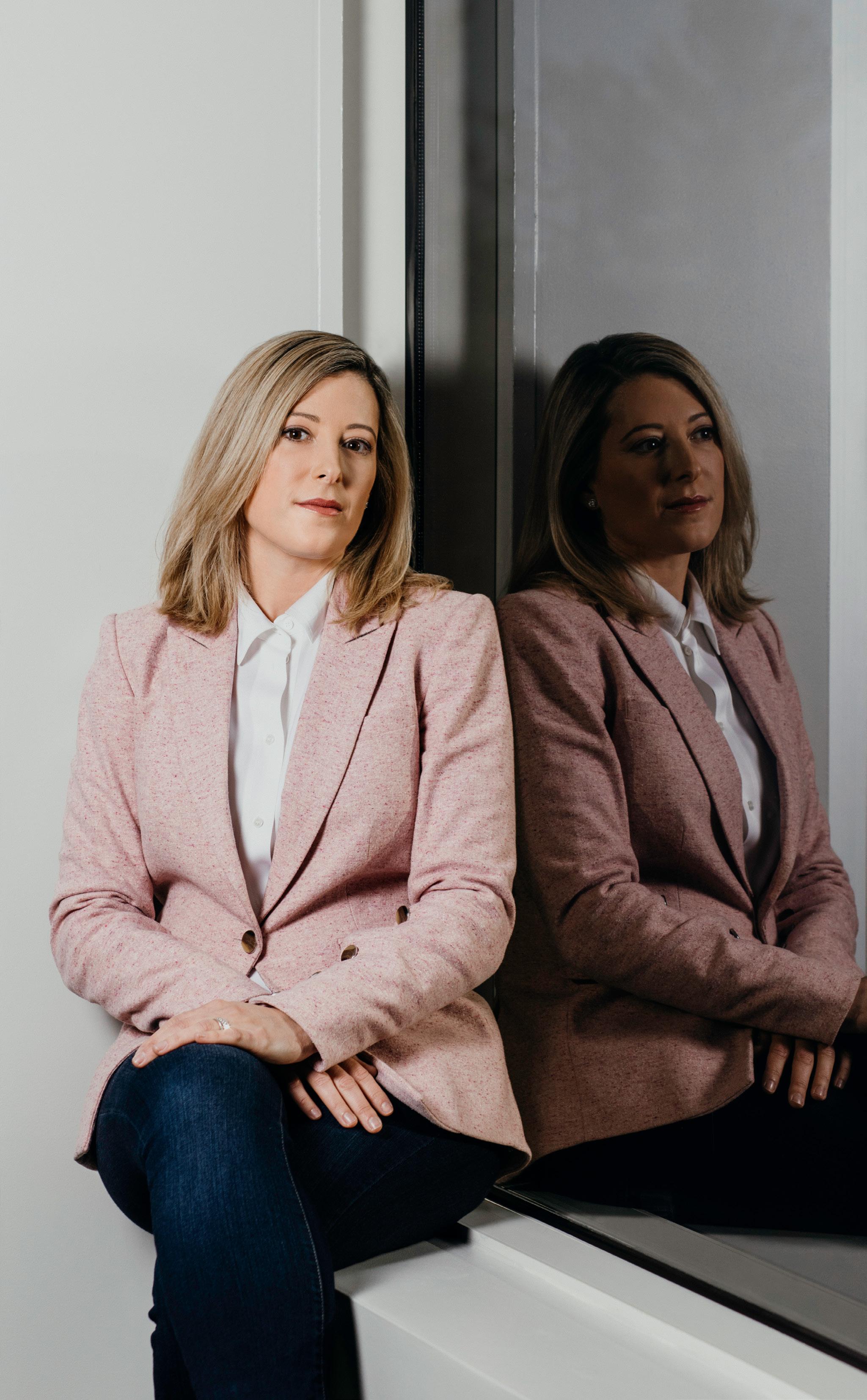 Danielle Sheer General Counsel
Danielle Sheer General Counsel
56
Bottomline Technologies
THE VALUE OF TRUST
BOTTOMLINE TECHNOLOGIES’ DANIELLE SHEER BELIEVES
THAT GENERAL COUNSEL HAVE A UNIQUE ROLE TO PLAY IN BUILDING TRUST ON TEAMS
BY BILLY YOST
PHOTOS BY GILLIAN FRY
57 Modern Counsel
Bottomline Technologies. “When I think of the general counsel role, building trust with others is fundamental to serving as a trusted advisor to a business. We have a unique ability that can extend beyond ourselves and help teams develop trust amongst each other.”
Sheer spent a decade as general counsel at Carbonite, which provides cloud backup and data protection, before joining the team at Bottomline in late 2019. “I spent the first half of my career becoming a trusted advisor to the business,” Sheer says. “What I learned is that the skills I use to build trust between myself and others are skills that can be distributed to help strengthen a team.”
To Sheer, helping her clients build relationships is the key to her success as a general counsel as well as the success of the organization she serves.
“Imagine,” Sheer says, “as general counsel, you learn about an upcoming product release delay.” She describes a hypothetical example involving a product release that’s a big deal for a company. Everyone is running hard to hit the release date—sales, marketing, engineering. One of the project managers needs a safe place to think out loud and comes to the general counsel for advice. “What do you do

WHEN MOST PEOPLE THINK about trust, especially with their lawyer, they think of being in a safe place to speak their minds,” says Danielle Sheer, general counsel at
Feature 58

59
Expertise Spotlight
LinkSquares is the leader in contract management and analysis. Understand your company’s risks and liabilities in minutes, not months. Stop reviewing contracts manually and start saving time with powerful text search, automated metadata extraction, and custom reporting.
Powerful Insights
Know what’s in your contracts without having to read them one by one with best-in-class OCR, metadata extraction, and proprietary QA process.
Security
Ensure your data is always protected and secure with enterprise-level controls built into each step of the contract management process.
Speed
Find exactly what you’re looking for and create customized reports easily. Get started in weeks, not months, with our white-glove onboarding.
LinkSquares improves key business activities, including M&A, financing events, due diligence, budgeting and forecasting, reporting, and crisis management.
Our customers include VMware, Wish, Pendo, Carbonite, Asurion, and Twilio. LinkSquares was founded in 2015 and is headquartered in Boston, MA.
with this information?” Sheer asks. “You have several options. You can notify your peer executive, the head of engineering. You can discuss with others at your peer level—the head of marketing or the head of sales. Because you know it’s a critical release for the company, you might even mention the conversation to the CEO or CTO. Think for a minute: what do those conversations look like? What problem are you solving? Have you helped the project manager?”
Sheer’s philosophy is not to solve her clients’ problems for them, but to help them find their own solutions. She suggests helping this project manager think through key allies in the organization they can work with to solve this particular issue for the business.
“Follow-up is essential because checking in to see how the matter is progressing is like lending confidence to someone who is trying to do the right thing before they’ve learned how to build their own internal networks,” she says.
Sheer believes the general counsel can help strengthen cross-functional relationships throughout the organization—particularly in times of high stress. “The best way for an organization to succeed is to empower its employees to work toward finding their own solutions with their colleagues,” she says. “Fixing problems on behalf of others may, in the short term, be more efficient. But in the long term, you are not enabling your team to build allies and relationships across the organization, and you as a leader are not demonstrating that you have faith in them to accomplish the company’s goals.”
It’s a simple concept that’s not so easy in practice because it takes time and patience. “The rewards,” Sheer says, “are a vastly strengthened team and a company culture of people working with and for each other.”
Sheer’s colleagues recognize her leadership and the many ways in which it strengthens her team.
“Danielle is a true leader, and we at Simpson Thacher feel fortunate to have the opportunity to work with
Feature 60
Danielle Sheer on her recognition with Modern Counsel.
her,” says Simpson Thacher partner Roxane Reardon. “She possesses a keen intellect, is very thoughtful, and displays a principled commitment to excellence that also extends to her team and the company as a whole.”
Vishal Sunak, CEO and cofounder of LinkSquares, says, “Danielle embodies what modern GCs should strive to be. Her dedication to innovation, making data-driven decisions, and elevating the role of the legal team within the organization is admirable. These qualities make her a trusted leader not just within her company, but also the industry as a whole.”
BUILDING A FOUNDATION
Sheer was hired at Carbonite by the company’s founders as the first general counsel and became part of the team




It is our pleasure to work with her.
MERGERS & ACQUISITIONS

TECH TRANSACTIONS & LICENSING
IP STRATEGY & PROSECUTION





VENTURE CAPITAL & PRIVATE EQUITY
DATA PRIVACY & CYBERSECURITY
“WHEN I THINK OF THE GENERAL COUNSEL ROLE, BUILDING TRUST WITH OTHERS IS FUNDAMENTAL TO SERVING AS A TRUSTED ADVISOR TO A BUSINESS. WE HAVE A UNIQUE ABILITY THAT CAN EXTEND BEYOND OURSELVES AND HELP TEAMS DEVELOP TRUST AMONG EACH OTHER.”
GTC LAW GROUP Congratulates
GTCLAWGROUP.COM 61
“A GENERAL COUNSEL’S PRIORITY IS TO PROTECT THE COMPANY, AND ONE OF THE MOST EFFECTIVE WAYS I HAVE FOUND TO FULFILL THAT CHARTER IS TO USE OUR UNIQUE SKILLS AND VANTAGE POINT TO STRENGTHEN THE TEAM AS A WHOLE.”

62
Simpson Thacher
Proudly Supports the Work of Danielle Sheer
General Counsel of Bottomline Technologies
We Applaud Danielle on Her Vision and Industry Leadership

NEW YORK BEIJING HONG KONG HOUSTON LONDON LOS ANGELES PALO ALTO SÃO PAULO TOKYO WASHINGTON, D.C.
Expertise Spotlight
Simpson Thacher is proud to have partnered with Danielle Sheer across a range of corporate finance transactions. Widely recognized as one of the preeminent law firms in the world, Simpson Thacher offers clients a world-class team of lawyers with decades of experience in structuring, negotiating, and completing some of the most complex and transformative transactions. With a uniquely balanced practice of both issuers and underwriters, the firm is a market leader in advising on IPOs and other equity offerings as well as offerings of high-yield, investmentgrade, and convertible debt. A remarkable array of clients, from large multinationals to Fortune 500 companies to smaller and closely held private companies to emerging companies, turn to Simpson Thacher for our commercial and business-like advice and personalized, value-added solutions. A hallmark of our practice is our ability to assemble multidisciplinary teams across our ten global offices and provide an integrated suite of services to our clients with premier practice groups that regularly lead the rankings, including in capital markets, financing, M&A, corporate governance, antitrust, regulatory, intellectual property, tax, and executive compensation.
that saw the company go public and graduate from scrappy upstart into an M&A machine, consolidating the cloud backup market. “The global legal team supported the business through rapid growth, complex transitions, challenging corporate events like a hostile takeover, and plenty of M&A transactions,” Sheer says. “In the beginning, our legal team had to build trust in order to serve as advisors to our business colleagues. The more we helped others build trust with their teams, the more trust we gained from our businesses colleagues.” Sheer found that creating the opportunity to enable productive problem-solving to take place fit squarely within the legal team’s wheelhouse.
After her tenth anniversary with Carbonite, Sheer was recruited to Bottomline to help build the company’s global legal presence. She was drawn to Bottomline’s strong culture of working with and for each other, and the timing was fortuitous: a day before her interview with Modern Counsel , Carbonite announced it had been acquired by OpenText.
THE EVOLUTION OF A GENERAL COUNSEL
“It’s important to remember that everyone has their own goals and objectives, and that’s a good thing,” Sheer says. “A general counsel’s priority is to protect the company, and one of the most effective ways I have found to fulfill that charter is to use our unique skills and vantage point to strengthen the team as a whole.” Sheer says that often, capitalizing on new business opportunities involves getting people on the same page, with their minds open to new ways of thinking.
“The CFO might be thinking about the bottom line, HR is thinking about resources, sales is thinking about the numbers, and we as lawyers are trained to think through a variety of possible solutions,” Sheer says. “By and large, what most of us love to do more than anything is solve a really tough problem.” It’s in the weeds of problem-solving that this general counsel says she’s able to be most effective.
Feature
64
“I have evolved my thinking from wanting to be the person with the right answers to wanting to be the person with the right skills who can help develop a productive team,” she says. Her colleagues have come to rely on her to be an essential ingredient of the team’s success. “It’s simple: a strong culture translates into strong business results,” Sheer says.
Since coming to Bottomline, Sheer says the company’s culture of transparency, trust, and teamwork has been evident from the get-go. “I worked hard to cultivate that kind of a culture over ten years at Carbonite, and walking into a place where it just is the culture is incredibly special. I’m excited to be here and to be part of this team.”
We are proud to join in recognizing the accomplishments of our client-par tner
 Danielle Sheer
Danielle Sheer
“The ultimate success as a trusted advisor is when the GC enables teams to build trust with each other, crossfunctionally, and with customers and shareholders. Danielle is the consummate trusted adviser.”
–Scott Semel, former multicompany CLO and board member

TRUST. INTEGRITY. RESU LT S .
The source of highly specialized insurance advice and unmatched navigation of the corporate insurance marketplace.






























































A trusted provider of unconflicted market intelligence.






The name of the game is risk optimization, not risk minimization.
Robinson International Risk Management Consultants, Inc. www.aririsk.com




 Andrew
Andrew

65
DESPITE HAVING NO PRIOR TECH EXPERIENCE
IRIS CHEN TURNED A CAREER CRISIS OF FAITH INTO A POSITION AS VP OF LEGAL FOR GOOGLE,
RISE, SHINE, LEAD
BY BILLY YOST
Feature
66
 Jay Tsai
Jay Tsai
67
Iris Chen VP of Legal Google
T 3:30 A.M., WHEN MOST OF CALIFORNIA IS fast asleep, Iris Chen might just be baking bread from scratch. She describes herself as an “extreme morning person,” a quality she shares with many a CEO and successful entrepreneur. “That’s my quiet time,” Chen says. “I do a lot of thinking and it gets me energized for the rest of the day.”
For the past thirteen years, the rest of Chen’s day has been spent at Google’s Mountain View, California headquarters. As a vice president in the legal department, she oversees legal support for the company’s digital advertising business, along with many of the company’s well-known products such as Google.com, Google Maps, Google Pay, as well as newer offerings in the research and health space.
In total, 135 lawyers report to the VP. Chen came to Google right around the time the company transformed from “that search engine company” to, simply, Google. But working for a tech giant wasn’t originally part of Chen’s career plan.
While many people dream of working at Google, it just wasn’t on Chen’s radar at first. “I didn’t know anything about tech,” she says. “There wasn’t a huge tech presence in New York, where I got most of my legal experience.” After a number of years doing private fund and then broader investment management advisory work practice, Chen says she wasn’t even sure if she wanted to be a lawyer anymore. “I kind of had this moment where my heart just wasn’t in it and I needed to figure out what I wanted to do,” Chen says. “I had gotten married and was thinking about having children and just wasn’t sure private practice and the work I was doing was where I belonged in the long run.”
After randomly applying for a job with Google’s lean New York team, she had a conversation with a hiring manager that convinced her the company might just be where she belonged. There was one problem: “They said it was great meeting me, but they already had another candidate in final stages for the job,” Chen says. “I was heartbroken. I really thought I had found my dream job.”
The story could easily have ended there. But when another position opened at Google’s New York office, Chen went after it hard. Nearly six months of interviews followed, and she eventually got the job.
She came on board supporting the growing advertising business, and after a departmental reorganization in 2010, she was asked to move to California to take on a role managing two different legal functions. Her responsibilities continued to expand from there. Along with the teams supporting Google’s myriad commercial interests, Chen oversees product counsel working with product, engineering, and other functions on product launches, which can involve a variety of issues, such as privacy, data use, copyright, and consumer protection.
Chen says part of the reason her duties have continued to increase is because of the skill she has shown in supporting Google’s advertising business, the company’s original major source of revenue. “We have a lot of very mature business models and expertise in commercialization that have evolved in ads and experience building teams to support them. It’s something that some of our newer product areas might still be figuring out,” Chen explains. “I’ve had the benefit of working in a space where there have been a lot of firsts, and we’ve seen that business scale, mature, and evolve to be this highly functioning, well-oiled machine. Being part of that experience has allowed me to take on other areas of the business because, internally, people see me as someone
Feature 68
who understands how we grow businesses at Google and knows how to scale support.”
The lawyer’s reputation for taking on difficult challenges doesn’t stop at business. Chen says that working to increase diversity and inclusion at Google have been essential parts of her role. “From the hiring perspective, my hiring mangers know that I feel strongly about and expect a diverse pipeline of candidates,” she says. “If they’re not seeing that, tell me, and I will help remove obstacles so we can get there.”
Chen says she also encourages networking outside of company walls. “Whether it’s bar associations or other communities, it’s important that we’re not seeing the same profiles over and over again, and it’s another way to bring more diversity into the pipeline.”
As an Asian American, Chen says she sees her role as a woman in leadership as an opportunity to mentor those
PC
“I’VE HAD THE BENEFIT OF WORKING IN A SPACE WHERE THERE HAVE BEEN A LOT OF FIRSTS, AND WE’VE SEEN THAT BUSINESS SCALE, MATURE, AND EVOLVE TO BE THIS HIGHLY FUNCTIONING, WELLOILED MACHINE.”
69
Your Partner In Business
who are looking to elevate their own careers. “I often get contacted for advice, sometimes from people I don’t even know, but I try to make the time to meet, because they might not have someone else they can reach out to,” Chen says.
She’s lucky, she says, that the majority of VPs in legal at Google are women, and considers it a strong motivator for her to help others find their way. Chen’s team is in the early stages of piloting what they’re calling the Voyager Program, providing contract legal opportunities for attorneys who have taken time out of their legal careers and are looking to re-enter the workplace. As a mother herself, Chen says it’s imperative to offer those who have taken time for their families (or for other reasons) to jumpstart their careers again.
For
Thirteen years in, Chen says that what keeps her at Google is the group she’s surrounded by. “I’m fortunate to be able to work with really smart, team-oriented people who work hard, but also don’t take themselves too seriously,” she says. “These are people who are interested in putting good into the world and genuinely believe in the power of technology to improve our lives. That positive energy is something you just want to be around.”
Haynes and Boone, LLP logo size: 2.5”(width)
Austin Charlotte Chicago Dallas Denver Fort Worth Houston London Mexico City New York Orange County Palo Alto Richardson San Antonio Shanghai The Woodlands Washington, D.C.
We congratulate
our
client and friend, Iris Chen, Vice President, Legal, Google, for her recognition in Modern Counsel.
modern-counsel.com 70
editorial consideration, contact info@modern-counsel.com
JERRY LEVINE KNOWS THE PROBLEMS
TECHNOLOGY CAN SOLVE FOR IPSOFT’S CUSTOMERS AND CONSUMERS. THAT’S WHY HE HAS BUILT A LEGAL DEPARTMENT THAT ENSURES SMART BUSINESS PRACTICES FOR THE FAST- GROWING COMPANY.
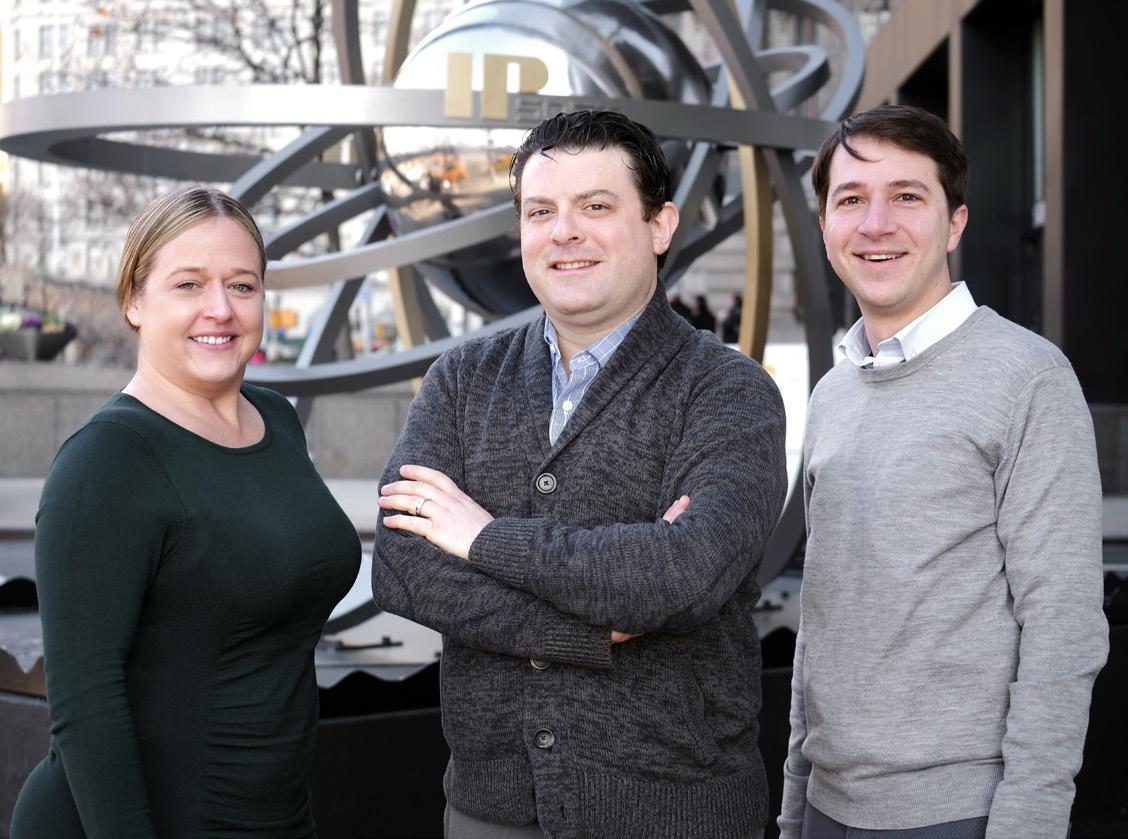
LEGAL AUTHENTICITY IN ARTIFICIAL INTELLIGENCE
By Russ Klettke
Jerry Levine
General Counsel and Corporate Secretary
Gene
Modern Counsel 71
Aquino
L-R: Lauren Pukacz, JD, Global Head of Procurement; Levine; and Richard Lear, Esq. (Counsel, Immigration & HR Policy)
IPsoft
(center)
O ONE ENJOYS BEING PUT ON HOLD WHEN phoning in a question to a service provider. Even worse is when the call goes to the wrong department—or to a dead end. Fortunately, callers have noticed these frustrating moments occurring less frequently. Why? Most likely because artificial intelligence (AI) and machine learning are doing you a favor.
That voice you’re interacting with over the phone might be Amelia, a “digital colleague” invented by IPsoft, a technology company based in New York. She is a technological creation adept at listening to consumers with questions and helping them find answers with greater efficiency. Callers are on hold a lot less frequently and for shorter periods of time because, well, Amelia can handle thousands of callers at a time. The fact that Amelia isn’t a flesh-and-blood human is far less disconcerting to most people than the past frustration of not getting answers in short order.
Jerry Levine, general counsel and corporate secretary for the multinational firm, helps illustrate how all this came to be—and quite recently, at that. He’s been with the twenty-one-year-old company for the past four years and was its first in-house counsel. That has a lot to do with company growth, but also with how IPsoft has evolved from providing remote IT infrastructuremanaged services to primarily focusing on AI and cognitive and autonomic solutions for enterprises.
“We are now a product company with ancillary services,” says Levine. “We became more dependent on lawyers because everything changed, including how legal approaches contracts and customers.”
It also meant the legal staff that Levine has developed—in the US and Europe—have had to be more tech savvy in such matters as contract management. They have to be versatile in broadening their functions, curious about where it’s all going, and accepting of how regulations have trouble keeping up with the advances in technology and what it does.
The legal technology they use is ContractPodAi. The UK-based service enables a repository of legal
documents that streamlines how IPsoft works out agreements with its customers.
“The search function goes beyond keywords and key terms,” says Levine. “The goal is to find documents that are related. It, too, is an AI-based recognition tool. It makes it easier to answer questions on the spot instead of turning pages.” He explains that such tools assist the sales function, leading to better understanding between parties that ultimately helps manage expectations and create stronger relationships.
When Levine came on board with IPsoft, in late 2015, none of these tools and structures were in place. “We were experiencing costs when problems would escalate because certain issues were not addressed upfront,” he says. “Software and professional services— the direction in which the company was heading— are much more complex and create a greater need for contracts.” Levine effectively sold his peers in management on investing in more tools and, ultimately, more people.
Part of the sell was the benefits of in-house lawyers. “We got to know the business and the people,” he says. “We had to earn our position with several departments, showing how we could manage their risks even while we help them grow. We now have the business sense
72
“I’VE SEEN RESEARCH THAT SAYS AI WILL CREATE FIFTEEN MILLION NEW JOBS. WE WANT TO AUGMENT, NOT REPLACE, PEOPLE.”
to manage risk with opportunity, to show our commitment to building solutions.”
That knack for problem-solving required having adaptable and versatile attorneys on staff. A staff attorney who specializes in immigration law, for example, helped write the company’s human resources policies. Levine says he often asks his attorneys to develop new skills, work with the team, and be adaptive to whatever needs come their way.
The stickier problem facing all technology companies, including those in the AI space, is dealing with lagging regulation issues. “Some of it is actually designed to slow down development,” Levine says, referencing DNA cloning in health sciences. But if the problem is broken down into components—asking if Amelia can serve as a notary on legal documents, for instance—it identifies something that can be lobbied for.
“Humans are capable of becoming comfortable with digital assistants,” he says, noting how digital signatures are becoming more common. Indeed, notarizing via AI is now legal in several states.
Levine takes a high-level perspective on what Amelia and other IPsoft products like 1Desk and IPcenter can ultimately do. “I’ve seen research that says AI will create fifteen million new jobs,” he says. “We want to augment, not replace, people.”
If that means less time on hold with customer service, we have tech-forward attorneys like Jerry Levine to thank.
73
It is a privilege to work with our friend, Jerry Levine, whose vision and leadership at IPsoft continue to propel the company to new levels of success.
We applaud Jerry’s accomplishments and congratulate him on this well-deserved honor.
Eric D. Wong | Of Counsel
Philip R. Sellinger | David Jay Co-Managing Shareholders 500 Campus Drive | Suite 400 Florham Park, NJ 07932-0677 973.360.7900
WWW.GTLAW.COM

Greenberg Traurig is a service 2100 ATTORNEYS | 41 LOCATIONS˚
mark and trade name of Greenberg Traurig, LLP and Greenberg Traurig, P.A. ©2019 Greenberg Traurig, LLP. Attorneys at Law. All rights reserved. Attorney advertising. No aspect of this advertisement has been approved by the Supreme Court of New Jersey. °These numbers are subject to fluctuation. Images in this advertisement do not depict Greenberg Traurig attorneys, clients, staff or facilities. 32995
Greenberg Traurig offers its heartfelt congratulations to Jerry Levine on this recognition by Modern Counsel featuring his leadership, vision, and accomplishments.
AMANDA DITTMAR LEADS WITH RESPECT™

THE INTELLECTUAL PROPERTY COUNSEL AT VIAVI SOLUTIONS MAKES
SURE THAT EVERYONE
AT THE COMPANY GETS THE RECOGNITION THEY DESERVE
By Billy Yost
Feature JCPenney Portraits
74
Amanda Dittmar Intellectual Property Counsel Viavi Solutions
here’s an adage that goes, “Treat the janitor with the same respect as the CEO.” It’s a philosophy that Amanda Dittmar took to heart early in her education as a lawyer. “I had friends at other firms who would go out to dinner with partners, and the partners would treat their clients with so much respect and kindness, but they’d treat my first-year associate friends like dirt,” Dittmar says. “That says a lot about those people and also showed me right away how I wanted to be treated.”
Dittmar, now intellectual property counsel at the technology company Viavi Solutions, says she found that respect in her private practice days at DC IP firm Finnegan, particularly from her supervisor, Anthony D. Del Monaco. “I immediately saw that respect when I was working at Finnegan. Even though it was my first year, I would get credit for my good ideas and the work I did,” Dittmar recalls. She was encouraged to call her bosses “colleagues,” and the higher-ups would gently remind her to avoid the “‘b’ word” whenever possible.
Dittmar brings that respect and appreciation to her own leadership; those principles form the foundation of her work at Viavi. She gives credit, though, to the optics engineers who have gone out of their way to teach her about the technology of the business. “One of my favorite parts of my job and what keeps it interesting is working with the R&D scientists here,” Dittmar says. “They have gotten me excited about our technology and made me feel like a member of a larger team. That has made such a difference for me.”
Dittmar has been effective not just because of her partnership in intellectual property, but her efforts in the legal department as a whole: the attorney has
assumed responsibility for the internal legal department’s continuing education program. Finding common ground for the entire legal team can be challenging, she says. “We have twenty-five team members who cover different parts of the business, but risk tolerance has been one area that we’ve been able to work on together. As attorneys, we were likely trained to be more conservative when it comes to risk, but in the more general business, that approach doesn’t always work.”
Dittmar says that in-house lawyers have a duty to not just shoot down ideas. “You have to show them a path forward. You may not be able to do x , but what about y?”
Dittmar has also helped provide support to the female engineers at Viavi by facilitating better communication among employees. “Only 12 percent of inventors at the US Patent and Trademark Office are women,” she explains.
Modern Counsel 75
“IT’S MY GOAL TO MAKE SURE THAT NO ONE’S SPOTLIGHT IS STOLEN AND THAT PEOPLE ARE RECOGNIZED FOR THEIR CONTRIBUTIONS. I’VE BEEN TREATED SO WELL, AND PASSING THAT ON HAS ALWAYS BEEN MY GOAL.”
“And only 20 percent of engineers in the US are women, so we’ve been looking for ways to get these engineers together and talk about patents.” An R&D lunch gives engineers a chance to interact with each other and encourages engineers of all experience levels and genders to submit patent ideas.
“We just want to get the idea of submitting patents for their ideas [out there],” Dittmar says. The get-together was so well received by company leadership that the lunch got built into the legal budget.
Encouraging the female engineers at Viavi is just one example of the importance Dittmar places on making sure that those around her receive the credit they deserve.
“I’m sure we’ve all been in that situation where we aren’t recognized for the work that we do, and it winds up being inefficient, disheartening, and just bad policy,” Dittmar says. “It’s my goal to make sure that no one’s spotlight is stolen and that people are recognized for their contributions. I’ve been treated so well, and passing that on has always been my goal.”
Harrity & Harrity, LLP:
“Amanda has the rare ability to understand technology and strategy at a global and individual matter level, which enables her to provide strategic guidance that continues to cement Viavi’s position as an industry leader. She is a joy to partner with, both professionally and in the community.”
—Paul Gurzo, Partner
Venable LLP:
“Amanda Dittmar brings technical talent and unassuming leadership to Viavi, a leading-edge company in optical security products. Venable is a proud member of the team, and we look forward to our continued partnership with both Amanda and Viavi.”
–Megan Woodworth, Cohead of IP litigation
76
ALL THE RIGHT MOVES
BOLD STEPS TO TURN
HER ENGINEERING BACKGROUND INTO A CHIEF ADMINISTRATIVE OFFICER, GENERAL COUNSEL, AND

SECRETARY POSITION AT BARRACUDA NETWORKS
By Billy Yost
PC Modern Counsel 77
DIANE HONDA TOOK
Diane Honda Chief Administrative Officer, General Counsel, and Secretary Barracuda Networks
Kellan Rogers
WHEN AN
OPPORTUNITY
PRESENTS itself, I embrace the challenge and go for it,” says Diane Honda, the chief administrative officer, general counsel, and secretary at Barracuda Networks. It’s this mentality that not only pushed Honda to start her career in the field of software engineering but also helped propel her into more business-facing roles, law school, and eventually general counsel leadership.
Honda demonstrates a willingness to march confidently into the unknown—but not before thinking strategically about the path she needs to take. That’s how she became who she is today: a multitalented general counsel and business leader willing to tackle challenges using her tech background and strong business acumen.
She first distinguished herself as a software engineer after joining a project that was behind schedule. Within months, she was leading its worldwide deployment at every Hewlett Packard location. “That experience taught me the value of a clear strategy executed with passion,” Honda says. “We worked incredibly hard to transform complex technology into a business solution.”
Before becoming an attorney, she delivered successful engineering projects, managed business services, and established international operations. When you look at her accomplishments, it is quickly evident that Honda seeks out and boldly seizes the path in front of her.
Honda has spent the past seven years at the IT security company Barracuda Networks. Honda was a strategic legal hire as Barracuda’s first in-house attorney. “They wanted to take the company public and needed my help to do it,” Honda says. “My previous experience in technology, business, legal, and compliance really made a difference.”
Honda has been able to make an especially effective impact on Barracuda’s start-up culture. “We had such a great entrepreneurial culture, but if you want to take a company public, you need discipline around financial reporting and other important processes,” Honda says. “It was a delicate balance of introducing the compliance mind-set but not harming the special aspects of Barracuda’s culture, where people had been empowered to be innovative and push the envelope.”
PUBLIC SCHOOL PRIDE
Diane Honda is a proud proponent of public school education and has put in extensive time at the Las Lomitas Education Foundation as a board and executive committee member—now serving as a member of the Las Lomitas School District’s governing board. “It’s no longer just about excelling in academic subjects. All students, regardless of their personal circumstances, need to be prepared for the challenges of a globally competitive and information-rich environment. They must be discerning problem-solvers and resilient to change,” Honda says. “Anything I can do to help ensure everyone receives a high-quality and inclusive education, I will do.”
She has since led Barracuda through several transformative restructures, including simultaneously divesting a product line, acquiring a company, and taking Barracuda private, which, according to Honda, “was one of the most challenging and fun times in my career.”
Honda has experience in a stunning range of areas: building out and developing HR, legal, and compliance teams from the ground up; leading information security, payroll, technology finance, and real estate groups; and taking patent and employee litigation through trial to protect the company’s and employees’ best interests.
Additionally, her software engineering background is well utilized at the technology companies she has helped grow. “I understand the different product engineering and operations roles and the difficulties they face from personal experience,” Honda says. “I can have meaningful conversations with the teams providing technological solutions to customers’ problems.”
Feature 78
Barracuda’s legal and compliance department is now recognized for both its ability and its approachability—not always the hallmarks of a legal department. “We are there to serve the business and recognize that we have to be smart in how we evaluate every situation,” Honda says. “One of my proudest accomplishments is developing a legal team that people feel comfortable coming to for help all of the time.”
Honda strives to do what is best for the company while empowering and challenging her team. She ensures that there is always some portion of each person’s job that is uncomfortable and a stretch. “If you are completely comfortable, you are not growing or pushing yourself,” Honda says. The constant challenge, combined with honesty and trust, allows her team to make tough decisions with confidence.
She views employee focus as critical. “Most general counsel do not focus on employee satisfaction as a strategic way to manage company-wide risk,” Honda says. “But engaged, happy employees take ownership of the company’s success and do not take unnecessary risks. They also are more willing to share concerns with their manager or their legal team so that you can get ahead of situations before they become problems. This is most important in times of rapid change and growth.”
Recently, Honda engaged employees to unify and refine Barracuda’s corporate values through a process that included crowdsource polling and focus groups. “Businesses are increasingly being asked to solve societal and environmental concerns, and employees are a key stakeholder in this change,” Honda says. “The more employees that believe in the company’s purpose and values, the faster we will see a positive impact.”
Honda approaches each situation holistically, using her engineering and legal mind to see the complete picture. She also uses her unique perspective, developed from her experience as an executive leader in multiple disciplines, to mentor and guide young woman to think broadly about their aspirations and the benefits of taking a chance.
Her next move is onto corporate boards. Honda observes that “boards today are grappling with big issues which require diversity of thought and experience.” Another right move and another opportunity for Honda to embrace a challenge.
Rimon:
“Diane is pragmatic, strategic, and intelligent. Diane has an amazing ability to quickly and easily solve complex matters using her broad business, technical, and legal expertise. She is a leader, a mentor, and a consensus builder.”
 –Karineh Khachatourian, Partner
–Karineh Khachatourian, Partner
WE ARE PROUD TO PARTNER WITH DIANE HONDA and the entire legal team at Barracuda Networks.
orrick.com 79
Diane’s tenacity, practicality and collaborative spirit serve as an example for us.
Davies Knechtel Senior Corporate Counsel Priceline

80
Kerith
IN - HOUSE
KERITH DAVIES KNECHTEL ALWAYS WANTED TO BE AN IN - HOUSE COUNSEL.
By Paul Synder
NOW, WITH THAT AMBITION FULFILLED AT PRICELINE, SHE’S HELPING STEER AN EFFORT BETWEEN PRICELINE’S PARENT COMPANY AND SISTER BRANDS ACROSS THE GLOBE TO INCREASE LEGAL EFFICIENCY.
Meredith Flynn
WORLDWIDE AND Modern Counsel 81
VEN AS A JUNIOR ASSOCIATE with New York–based law firm Debevoise & Plimpton, her first job out of law school, Kerith Davies Knechtel says she knew she wanted to become an in-house counsel—though her ambition sometimes outweighed her more practical instincts.
“Within my first couple years at Debevoise, I interviewed for a couple in-house jobs and realized pretty quickly I didn’t yet have enough experience,” she recalls. “But the more responsibility that I took on, the more confident I became in my ability to be a lawyer. When you start out at a big firm as a junior associate, it takes a while. You have to grow into the role, and fortunately, I was working every day with brilliant lawyers.”
She was also making no secret of her ambition. She took on secondee roles for JPMorgan Chase and Christie’s Real Estate while working at Debevoise, where—in addition to her litigation and employment work—Knechtel assisted with due diligence for M&A transactions and worked on employee benefits. This abundance of well-rounded experiences prepared her nicely for her current role as senior corporate counsel for online travel agency Priceline.
“We’re a small team, but we’re all the jack-of-all-trades type,” she says of the company’s legal department. “We’re asked to advise on a lot of things that might be outside of our own individual experience bases, but that’s what all those hours working with brilliant lawyers on your way up gets you. When you are in-house, you often don’t have
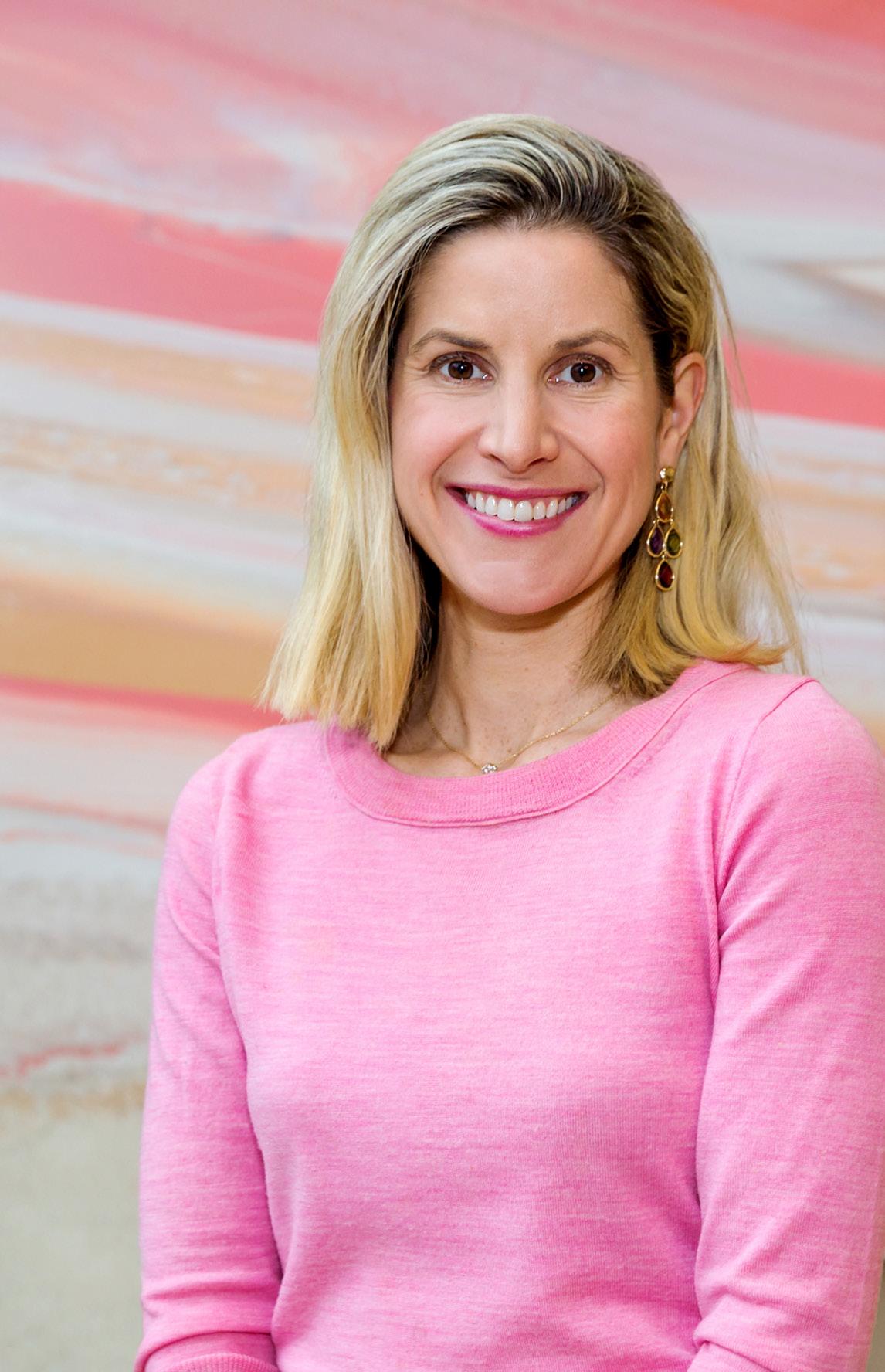
Feature 82
“WE’RE ASKED TO ADVISE ON A LOT OF THINGS THAT MIGHT BE OUTSIDE OF OUR OWN INDIVIDUAL EXPERIENCE BASES, BUT THAT’S WHAT ALL THOSE HOURS WORKING WITH BRILLIANT LAWYERS ON YOUR WAY UP GETS YOU.”
Michelle Williams
the advantage of hours to research. You have the confidence in your own judgment and the knowledge that you can provide good advice on the spot.”
That kind of confidence and knowledge base is particularly important as Priceline’s parent company, Booking Holdings, makes strides to pull the legal teams of all of its brands—located all over the world—into a more cohesive, streamlined way of working. Where once many small brands worked in their own silos, Knechtel is now one of the many legal minds being called upon to advise and help guide efforts impacting not only Priceline but also its sister brands around the globe.
“The biggest challenge I’ve faced has been getting to a place where we’re all truly working together on the legal front, across brand lines, as the world becomes more global and we begin facing similar issues regardless of where our home office is based,” she says. “It’s an ongoing effort.”
Currently, the legal teams from Priceline and its sister companies participate in quarterly calls on topics including employment law, IP, tax, and short-term rentals, which affect everyone. Reflecting on these many moving pieces, she says, “Legal issues in one country can quickly become issues in another country.”

Nevertheless, Knechtel says she finds neither the scope nor weight of such a global effort to move multiple brands particularly daunting. As she put in her years of work targeting an in-house role, she came to realize that these kinds of multipronged efforts toward streamlining operations would undoubtedly be part of her job description. One of the earliest lessons she learned was that the more brands you can have working in concert, the more leverage you can provide clients in terms of market power and improved efficiencies.
Add to that the fact that Knechtel has never backed down from a challenge. She says she has never been scared of hard work, dating back to childhood, when she worked through daily therapy to overcome early speech impediments.
“I would not let obstacles get in my way,” she says. “Throwing everything you have into your work—
More
New York,
1 866
2744 | Attorney Advertising
nortonrosefulbright.com
than 50 locations, including London, Houston, Minneapolis,
Toronto, Mexico City, Hong Kong, Sydney and Johannesburg.
385
Law around the world.
83
Norton Rose Fulbright joins Modern Counsel in recognizing Kerith Knechtel Senior Corporate Counsel at Priceline.
Better Together
At Bradley, our attorneys understand that legal matters are often more than contests of critical thought; they have real-world implications, which is why we prioritize integrity. It is this integrity that inspires all of us to go above and beyond our clients’ expectations by providing innovative solutions, dependable responsiveness and a deep commitment to success.

Bradley congratulates Kerith Knechtel of priceline.com LLC
whether it’s research, writing motions, or whatever else defines your work ethic—is critical to being a good lawyer. The best lawyers are the ones who find every fact and run down every question. So that tenacity that I developed from a really young age has played out well in my legal career.”
Knechtel says she’s also thankful that Priceline has a history of legal stewardship at its most senior levels. Both the former and current CEO of Priceline’s parent company have law degrees, and the lead ethics officers at Priceline and Booking Holdings are also lawyers. That kind of built-in, counsel-friendly culture is not always a given, as she has learned from experience with other companies that faced a high volume of business on a daily basis.
“Priceline recognizes the value of its in-house lawyers as business partners, and I think that’s made a huge difference in mitigating some of the day-to-day challenges that in-house counsel face,” she says. “My general counsel is a brilliant lawyer and a great manager. She lets us be autonomous thinkers, but we all support each other.
“On our legal team, we recognize that each one of us has insight to add, even though each of us has different areas of responsibilities,” Knechtel adds. “It’s good to bounce ideas off each other and know that we’re working stronger as a team than just a group of individuals.”
—Anne
No representation is made that the quality of the legal services to be performed is greater than the quality of legal services performed by other lawyers. ATTORNEY ADVERTISING. Contact: John D. Watson, Esq., 205.521.8436, jwatson@bradley.com, Bradley Arant Boult Cummings LLP, 1819 Fifth Avenue North, Birmingham, AL 35203. © 2019
bradley.com
Bradley Arant Boult Cummings LLP: “Kerith knows what her business clients need and looks for practical and intelligent solutions. In reaching her recommendations, she quickly absorbs and evaluates legal advice while working as a true partner with her outside counsel.”
84
Marie Seibel, Partner
VP AND GENERAL COUNSEL
SUZY LEE EXPLAINS WHY SHE
PRIORITIZES MENTORING AND LEARNING OPPORTUNITIES AT TOSHIBA AMERICA ELECTRONIC COMPONENTS AND BEYOND
THE MEANING OF MENTORSHIP
By Sara Deeter
Modern Counsel 85
UZY LEE HAS SPENT THE BETTER PART of her career—and the entirety of the last ten years—working as a general counsel at leading companies in the US and across the globe. Naturally, she has learned many things along the way. But most of all, Lee says, she has realized the importance of learning itself. As vice president and general counsel at Toshiba America Electronic Components—an independent operating company owned by Toshiba America, the US-based electronic components business of Toshiba Electronic Devices and Storage Corporation—Lee ensures that the people around her have the mentoring, learning, and development opportunities they need to succeed.
An alumna of Cornell University and Fordham University School of Law, Lee wasn’t really sure what she wanted to do early on in her legal career. She certainly didn’t know that she wanted to become a general counsel. “But I was very fortunate to have the opportunity to work in Asia at some of the largest law firms in Korea,” Lee says. “While I was there, I was approached about working at Otis Elevator Company, Korea as their first general counsel.
“It was a wonderful experience and a great first in-house experience,” Lee continues, “but it’s really not the norm to be a general counsel as your first in-house position.”
Lee attributes her successful transition into the GC role to the guidance she received from her mentors at the company. No matter your position, she notes, transitioning from a law firm to an in-house legal department is a significant and often confusing change.
“Business models at law firms and business models of corporations are very different, which means that the way that employees develop at law firms and corporations is also very different,” Lee says. “At Fortune 500 companies, there is a very detailed grooming and development process with many different types of training, but at law firms, there’s really just a focus on being a great attorney.”
To Lee’s mind, mentoring is the best way to navigate the differences between those business and training models. Even the best attorneys can’t be expected to learn everything on their own, she says.
“It’s very much like learning to ride a bicycle,” Lee remarks. “I may have been able to learn on my own, but it would have been much harder and taken longer, and I would have made many more mistakes if my dad hadn’t taught me to ride.”
Lee helps others learn to ride by serving as a mentor to her fellow attorneys and even to law students. Of course, Lee says, that help often needs to be more subtle than simply telling someone what to do. “We cannot control anyone but ourselves,” she emphasizes. “We’re all hardwired, maybe as part of the survival instinct, to not accept what people tell us at face value. A top-down approach really doesn’t work anymore.”
Instead, Lee says, she focuses on working one-onone with people, asking provocative questions, and “allowing others to make their own decisions as well as their own mistakes because we only learn through our mistakes.”
One of the most common mistakes that Lee sees is simply a lack of awareness of other people. “You can be the smartest person in the world, the most skilled person in the world, but if you don’t have people skills, your success is going to be limited,” she asserts. “Sometimes, I’ll ask a person, ‘What did you notice in that
Feature 86
“YOU CAN BE THE SMARTEST PERSON IN THE WORLD, THE MOST SKILLED PERSON IN THE WORLD, BUT IF YOU DON’T HAVE PEOPLE SKILLS, YOUR SUCCESS IS GOING TO BE LIMITED.”
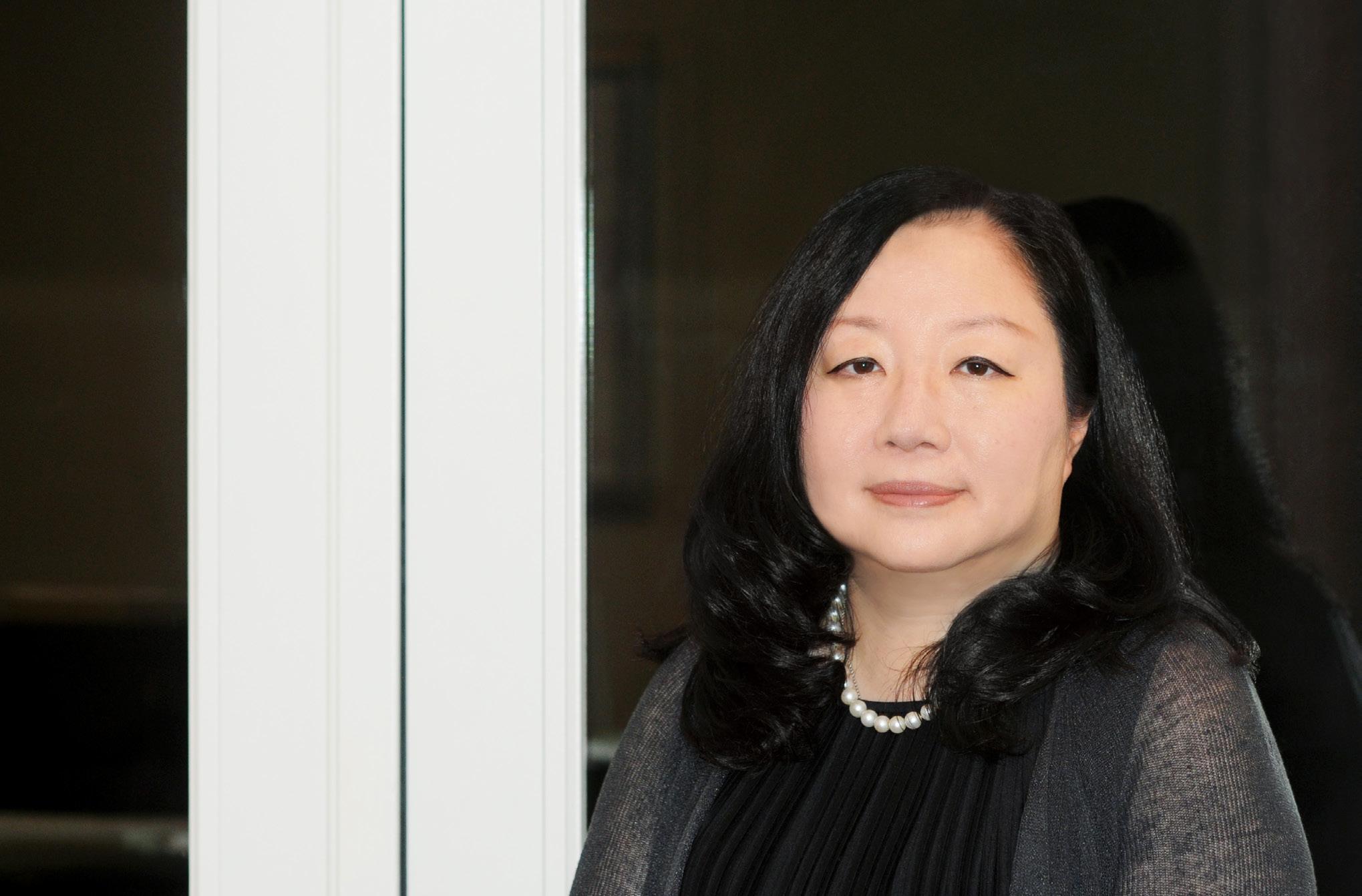
Andrew Park
“
[ W ] E NEED TO DO MORE MENTORING IN THE LEGAL PROFESSION, ESPECIALLY EARLY ON, BECAUSE IT LEADS TO BETTER ATTORNEYS, TO NICER ATTORNEYS, AND IMPROVES OUR PROFESSION AS A WHOLE.”
Suzy Lee VP and General Counsel
Modern Counsel 87
Toshiba America Electronic Components
White & Case congratulates
meeting? How were some of the other folks showing that they liked or didn’t like the speaker’s ideas of how to roll out this program?’”
“I often find that junior individuals in particular simply haven’t had the experience of working with many different types of people or functions,” Lee continues. “Even if they’re aware of these things on some level, they do not focus on them like they need to.”
In addition to her efforts as a mentor and team leader, Lee capitalizes on her roles as head of HR and a member of the company’s core leadership team to create critical learning and development opportunities for TAEC employees. Lee believes that learning and development are ongoing lifelong processes and that the most successful professionals are constantly learning.
Lee emphasizes that the importance of learning and mentoring extends far beyond any individual company or firm. “I love my profession and I love being an attorney,” Lee says. “But we need to do more mentoring in the legal profession, especially early on, because it leads to better attorneys, to nicer attorneys, and improves our profession as a whole.”
88
White & Case is proud to congratulate and support Suzy Lee. It has been an honor and a privilege to work with her over the years.
whitecase.com
Suzy Lee, Vice President & General Counsel of Toshiba America Electronic Components, Inc., on being recognized for her outstanding achievements.
We are proud to support Suzy and her exceptional career accomplishments.
White & Case is a global law firm with longstanding presence in the markets that matter today.
PUTTING FITNESS FIRST
VP AND DEPUTY GENERAL COUNSEL ERIC LENTELL
HAS AUTOMATED MANY PROCESSES AT FITBIT TO HELP HIS TEAM KEEP UP WITH THE COMPANY’S EXPONENTIAL GROWTH
By Sara Deeter
Eric Lentell VP and Deputy General Counsel Fitbit

Modern Counsel
Courtesy of Fitbit
89
RIC LENTELL PUTS HIS TEAM FIRST. OVER the past five years, Lentell has seen Fitbit become a true sensation within the tech industry, inspiring and enabling people all over the world to reach their health and fitness goals by tracking their physical activity, quality of sleep, heart rate, and much more.
But that kind of exponential growth does have certain downsides, and Lentell never wants his legal team to feel burnt out or disconnected from the company because of Fitbit’s expansion efforts. As a vice president and deputy general counsel at Fitbit, Lentell helps his people spend their days focused on the things they enjoy doing so that they, in turn, can help Fitbit execute its mission to help its customers live more active, healthy lives.
CONNECTING LAW, TECHNOLOGY, AND ENTREPRENEURISM
Lentell has spent years working in prominent in-house roles, including a position as corporate counsel at Dish Network. But his path was rather unusual, says the VP.
“I went right from law school to an in-house role,” Lentell shares. And while that kind of trajectory has become somewhat more normal within the past few years, “thirteen years ago, it was pretty rare,” the lawyer says with a chuckle. According to Lentell, the key to
that path was the University of Colorado School of Law’s Silicon Flatirons Telecommunications Program.
“I got a lot of hands-on experience with small start-up companies,” Lentell says of his participation in that program. “I wanted to understand what kind of legal support they needed so they could shape and move their business along. It was amazing to see the real impact of that work, to see how you can help those businesses formulate how they’re going to put their company together and where they’re going to take it.”
THE FITBIT VISION
At Fitbit, Lentell continues to be amazed by both the impact of his work and the impact of the company as a whole. “We’re probably the only player in this space whose primary focus, every day, is on the health and wellness of customers,” he says. “When we develop products, we keep that ethos close to our heart—we think about how we can positively impact as many people as possible in the world as we’re working on our products and services.”
Of course, everyone’s journey to health and wellness is different, Lentell notes. Fitbit’s platform gives people choices, he explains, providing the hardware, software, and a safe space that allows customers to do what they want with their health and fitness data. It’s about giving people a “nudge along the way,” Lentell explains, rather than mandating that people take a certain path to fitness and well-being.
This strategy has been very effective for the company: in recent years, Fitbit has increased its workforce from 300 employees to more than 1,500 to keep up with market demand.
“For a while, we had about fifty new hires starting each week,” Lentell remarks. “And it’s been a real challenge—how do you make sure they all see and believe in the long-term vision? How do you make sure that the things you value and the things that are important to the company are being translated to the new people joining the company?”
Feature
90
“WE’RE PROBABLY THE ONLY PLAYER IN THIS SPACE WHOSE PRIMARY FOCUS, EVERY DAY, IS ON THE HEALTH AND WELLNESS OF CUSTOMERS.”
TECHNOLOGY HELPS THE TEAM






But even once you answer those questions, Lentell says, you still have to find creative ways of managing increasing workloads. “When I started, we had about fifty contracts in total under review,” he says. “Now we do about five to seven thousand contracts a year.”





Lentell has enacted new, automated processes to help mitigate the stress that the additional workload creates for his team. Those processes not only automate many commonplace legal operations but also filter through the seven thousand contracts to identify the 30 percent that actually require in-depth focus, time, and attention, he explains.




















“We only want to spend our time negotiating and working on the things that are going to really add value to the company,” the VP emphasizes.


But Lentell doesn’t rely exclusively on technology to make sure that he and his team members are adding value. He also spends time familiarizing himself with his team’s dayto-day projects and tasks. When he understands what his team members are spending their time on, Lentell explains, he can identify areas where they’re frustrated, where they’re not adding value through their work, or where they simply don’t like the work.
“I try to automate that frustrating work and help people spend their time working on things they want to work on, learning the things they want to learn,” Lentell says. “That’s when you get the most out of a team: when you hire smart people, come up with a vision collaboratively, and help them with what they need along the way to execution.”

“WHEN I STARTED, WE HAD ABOUT FIFTY CONTRACTS IN TOTAL UNDER REVIEW. NOW WE DO ABOUT FIVE TO SEVEN THOUSAND CONTRACTS A YEAR.”
Connect everything so you can find anything eDiscovery built for the apps of today and tomorrow onna.com 91

Russ Jang
92 Feature
Brian Levey Chief Business Affairs and Legal Officer Upwork
CRITICAL CONNECTIONS
BRIAN LEVEY, UPWORK’S CHIEF BUSINESS AFFAIRS

AND LEGAL OFFICER,
ALSO AIMS TO ACT AS THE COMPANY’S CHIEF PROBLEM - SOLVER,
ELIMINATING CONVENTIONAL BLIND
SPOTS ACROSS THE COMPANY
By Sara Deeter and Hana Yoo
Modern Counsel 93
RIAN LEVEY HAS TAKEN THE UPWORK mission to heart. A global hiring platform with hundreds of thousands of active customers in more than 180 countries, Upwork connects businesses around the world with talented freelance professionals seeking new work opportunities. And as chief business affairs and legal officer at Upwork, Levey spends his days ensuring that his team members are connected to the business, but also to each and every other team at the company.
Since the beginning of his legal career, Levey says, he has been conscious of the negative opinions that many people have of attorneys. Traditionally, attorneys have been seen as roadblocks, as disciplinarians, or as individuals often in conflict with the businesses they work for. But Levey has always sought to turn those perceptions on their head.
“I have always been interested in the business side, in problem solving and enabling, as well as the legal side,” says the attorney, who majored in economics and completed a short stint at the Federal Reserve Board before transitioning into law school and the legal sector. “In the Upwork legal department, we have our own mission, which is to enable, accelerate, and protect the Upwork business in a collaborative and innovative manner.”
As Levey explains, the Upwork legal department is the department of “how” instead of the department of “no” because he and the other legal team members use a relationship-based approach to solving problems with the business units, using tools like AdvanceLaw’s feedback mechanism, to improve performance and constantly strive to avoid traditional, unproductive legal approaches. The team’s accomplishments have earned it several notable legal industry recognition awards.
Often, he says, this strategy comes down to asking questions like, “How can we avoid the ‘Chicken Little the-sky-is-falling’ approach? How can we avoid the ivory tower academic approach when looking at business issues?”
Levey and his team have come up with their own unique answer to those questions. “We like to use a sort of Mick Jagger approach with our business partners,” Levey says with a chuckle. “We always say, ‘You can’t always get what you want, but we’ll give you what you need.’”
But it’s not just the legal team’s performance that Levey wants to optimize—he helps teams all over the company fulfill their potential by “connecting the dots” across those teams and the legal team to further the company’s best interests.
“We assign a legal liaison to be the primary point of contact for most of the business teams and primary company initiatives to reduce the ‘blind spots’ among various functions that affect all companies,” he explains. “That allows us to better ensure that our business partners have the tools they need to succeed—which hopefully speeds up decision making, results in more informed decisions and fewer surprises, and increases trust.”
Levey’s commitment to keeping Upwork’s teams connected to each other and to its global footprint of users is key to the company’s dayto-day success, especially given the remote knowledge work performed via the Upwork website between the various professionals and businesses that use Upwork’s platform. As Levey notes, approximately 97 percent of all Upwork transactions are negotiated and conducted between third-party users who are located at least fifty miles apart, a testament to how the Upwork
94 Feature
site provides new opportunities to those living outside major cities.
This approach has proven especially critical during the major transitions the company has seen since its initial public offering (IPO) in 2018. “We’re obviously on a larger stage now,” Levey says of those changes. “We need to raise the bar every day for what is expected of us and try to leverage the recent IPO to create more credibility with businesses who are looking to use our website.
“But we’re still essentially operating the same way,” Levey continues. “We still do the right thing. We still prioritize and invest in legal compliance across the business—and ultimately try to use compliance as a competitive advantage.”
In other words, Levey says, Upwork’s core business and core values have not changed—just the scale at which Levey and his teams are expected to enable those opportunities for skilled professionals on a global basis. “Talent is everywhere, and we’re trying to unlock potential in more places than ever before,” he remarks. “And when you’re doing things that have never been done before, the work is really fast-paced and we have to be nimble.”
Fortunately, Levey feels he and his team are more than up to that challenge. “I’ve always loved solving problems in a collaborative and relationship-based way. I like to think of myself not just as Upwork’s chief business affairs and legal officer but, along with the rest of the legal team, act as its chief problem solver as well,” he says.
95
“HOW CAN WE AVOID THE ‘CHICKEN LITTLE THE - SKYIS - FALLING’ APPROACH? HOW CAN WE AVOID THE IVORY TOWER ACADEMIC APPROACH WHEN LOOKING AT BUSINESS ISSUES?”
Rob Rieders General Counsel Postmates
 Courtesy of Postmates
Courtesy of Postmates
96 Feature
FROM STARS TO START - UPS
AFTER YEARS IN ENTERTAINMENT LAW, ROB RIEDERS SHIFTED GEARS AND BECAME GENERAL COUNSEL AT POSTMATES, WHERE HE HAS HIRED A FLEET OF LAWYERS TO NAVIGATE ALL THAT COMES WITH BEING A FAST- GROWING TECH COMPANY
By A.J. Zak
Modern Counsel 97
N ROB RIEDERS’S NEARLY THREE DECADES AS an attorney, his work has spanned industries and ranged from litigation to transactional practice. He handled securities cases at a major firm in New York City in the 1990s before returning to his native California to join a boutique law firm in beachy Santa Monica, where he represented writers, directors, producers, and actors in disputes with their networks and studios.
He spent years in entertainment law—including positions at 20th Century Fox, Lucasfilm, and Pixar—before joining app-based delivery company Postmates as general counsel four years ago. In his time there, he has worked on everything from disputes around employment law to figuring out what the future of robotics means for business. He has also hired a fleet of attorneys to tackle all that comes with being a rapidly growing company that straddles multiple industries.
A native of Irvine, California, Rieders earned a degree from the University of California Berkeley before heading to the East Coast, where he graduated from the Boston University School of Law in 1991. After working in New York City for a few years, he found himself wanting to return to the West Coast. A friend who worked in entertainment law told him about the benefits of working at a smaller firm, includ-
ing opportunities to work more closely with clients and learn about the business side of the industry.
That led Rieders to take a job at a Santa Monica firm run by Stanton “Larry” Stein, a renowned entertainment litigator who has represented a variety of well-known Hollywood names. (Rieders once saw the cast of The Brady Bunch walk through the office, he recalls.) Eventually he craved a shift away from litigation and took a job with 20th Century Fox, working on transactional deals and then on the business affairs side, helping to put together television shows including King of the Hill , Judging Amy, and Dharma & Greg.
“It was high-paced, really fun work, including allnight negotiations to get actors signed with the studio by Monday morning. And then—boom—Monday night, they’re filming the pilot,” Rieders says.
A passion for bringing creative ideas to life is a common thread that runs through much of his work, including four years as general counsel at George Lucas’s company Lucas Digital (which includes the famous visual effects house Industrial Light + Magic and the audio postproduction studio Skywalker Sound) and eight years at Pixar Animation Studios. After leaving Pixar, he shifted gears and entered the world of tech, first at a private social networking company called Path and then, in 2015, at Postmates.
“When you go to one of these start-ups, you really hope the product is going to stick—the next super cool dog leash or toothbrush or mattress or car that is really going to be amazingly groundbreaking, but you don’t know until you know,” he says. “So what I really look for is the team. With Postmates, I thought these guys had what it takes to revolutionize on-demand delivery. They had a vision, they’re hugely motivated, and they seem like smart guys who are going to do something great.”
The shift from entertainment law to a tech company that exists in the logistics space as well as the food and beverage industry was in some ways “tremendous,” Rieders says. He’s had to learn about issues related to insurance, employment and labor law, robotics, and laws that govern delivery of alcohol. But Postmates also has agreements with influencers
Feature
98
“WHEN YOU MATURE AS A COMPANY, YOU CAN’T BREAK THINGS. THE CONSEQUENCES ARE STEEP. PEOPLE SAY, ‘YOU’LL DEAL WITH THAT DOWN THE ROAD.’ WE ARE DOWN THE ROAD.”
and celebrities, and the company does some brand integrations with Hollywood studios, so he still gets a taste of the entertainment world.
His work as general counsel at Postmates has also involved building his department up from a one-man show into what is now a team of eight lawyers and four paralegals. As a leader, Rieders puts great value on hiring ethical trailblazers who are willing to learn new things.
“There’s not always lot of case law or other precedent for what we do. I don’t necessarily hire subject matter experts,” Rieders says. “I also hire people who are better lawyers than I am. The worst managers are the folks who really aren’t brave enough to be challenged by smarter people with differing opinions. I’m totally fine being a Toyota, but I hire Ferraris.”
As a leader, he makes sure people on his team feel encouraged to ask questions if they don’t know the answer. There’s never a need to feel pressure to guess. He feels that work should be as much as an opportunity to learn new things as it is a task to simply knock out contracts. And at a company that has grown from a start-up at its founding in 2011 to a massive business that earlier this year confidentially filed paperwork for an initial public offering, there is plenty of new territory to steer through. That includes closer attention from lawmakers and regulators.

“We’re more under the microscope now because we’re a substantial business and a bigger part of the economy,” Rieders says. “Everything’s on steroids because of our growth.”
As the volume and scope of the deliveries on Postmates’ platform has accelerated, there is also a renewed focus on customer and courier safety, Rieders says. Finesse and thoughtfulness—rather than shooting from the hip—is key when things are growing quickly, even if that approach might seem to clash with the Silicon Valley mentality to “move fast and break things,” he says.
“When you mature as a company, you can’t break things. The consequences are steep,” he says. “People say, ‘You’ll deal with that down the road.’ We are down the road.”
Deli vering for Postmates





Faegre Drinker joins Modern Counsel in saluting Robert Rieders for his role in advancing the ambitious legal and business objectives of Postmates. An accomplished attorney and businessman, Rob’s unshakable integrity, coll aborative spirit and proactive approach to the l aw further amplify his contributions to Postmates and the broader legal community.

faegredrinker.com © 2020 Faegre Drinker Biddle & Reath LLP. All Rights Reserved.
Faegre Drinker: “Rob has a proven track record as a visionary, smart, and strategic general counsel. Postmates is well served by his legal guidance and trust he puts in his team and outside counsel. “
99
–Cheryl D. Orr, Partner
Divisional Chief
TRANSFORMING IP THROUGH TECHNOLOGY
GREG ANSEMS, CHIEF
INTELLECTUAL PROPERTY COUNSEL OF HONEYWELL BUILDING TECHNOLOGIES, HAS HELPED THE INDUSTRIAL GIANT PIVOT TO A POSITION ON THE CUTTING EDGE OF TECHNOLOGY
 By Lori Fredrickson
By Lori Fredrickson
Feature
Greg Ansems
Intellectual Property Counsel
100
Honeywell International Courtesy of Honeywell
OR HONEYWELL INTERNATIONAL, THE PAST
twenty years have been an era of significant transformation. Long known as a manufacturer, the company has expanded into industrial software, investing in new and innovative forms of technology. Meanwhile, it’s tripled the value of its stock while completing dozens of acquisitions and divestitures.
Greg Ansems, chief intellectual property counsel of Honeywell Building Technologies, has been pivotal to that transformation. Since joining the company in 2002, he has helped drive Honeywell’s intellectual property (IP) culture across both new and existing businesses, navigating acquisitions while helping build it into a global organization operating in more than one hundred different countries.
Looking back on his eighteen years at the company, Ansems recalls something that Honeywell’s general counsel often told him: that a bored attorney is never good for business.
“In the time I’ve been here, I’ve never been bored,” Ansems says. “Being able to advise a company on these cutting-edge forms of technology is exciting and also a constant challenge; it never gets stale.”
Ansems began his career in the midst of the late’90s dot-com boom, working with Qwest Communications and Merchant & Gould on internet-based IP—including one memorable case representing Venus Williams against a domain squatter. As that era drew to a close, he began looking for ways to transition to a more technology-focused company, and was attracted by an offer from Honeywell, which was then located in his home city of Minneapolis. Honeywell had merged with AlliedSignal a few years earlier, and a planned merger with GE had recently fallen through, which had left it with gaps in management. As the company worked to increase efficiency and re-establish itself in the market, Ansems saw an opportunity to lead in those areas.
“The immediate challenge was to figure out how to provide levels of IP support on a much more
efficient basis while also trying to re-establish Honeywell in better and better industries,” Ansems says. In his first year alone, he was able to help steer that growth, working on a major divestiture alongside several new technology-driven acquisitions.
Over the years, Ansems has not only handled more than fifty divestitures and acquisitions but also become well versed in the ways that new technology affects IP laws and culture. “As you go from a manufacturing world to a software world, the barriers to entry are much lower, and the opportunities are much greater,” Ansems says. “To protect a company’s IP, you have to stay up with the changes in the law and in different countries, and you also need to stay very much on top of what your business is doing.”
Ansems’s savvy has led to some notable victories over the years, particularly as Honeywell has increasingly faced challenges from nonpracticing entities (NPEs). In one case that was
Modern Counsel 101
“BEING ABLE TO ADVISE A COMPANY ON THESE CUTTINGEDGE FORMS OF TECHNOLOGY IS EXCITING AND ALSO A CONSTANT CHALLENGE; IT NEVER GETS STALE.”
congratulates Greg Ansems
filed by an NPE in eastern Texas seeking hundreds of millions in damages, Ansems was able to obtain the first ever summary judgement dismissal via a patent claim construction hearing before a federal judge. In 2012, shortly after the passing of the America Invents Act that redefined patent law, Ansems made Honeywell one of the first companies to file an inter partes review (IPR) to successfully invalidate a patent.

Ansems says one of the keys to being a successful in-house IP counsel is to leverage your network, know your technology, and always treat adversaries with respect. “The IP legal community is relatively small and very sophisticated,” says Ansems. “By treating all with respect, you are better able to leverage your network and knowledge to help drive successful outcomes.” Ansems has leveraged his network and technology knowledge to obtain dozens of favorable settlements and mutually beneficial cross licenses including negotiating a cross-license with Google in 2016.
“Since Honeywell is constantly acquiring new companies, it’s always this constant learning process,” Ansems says. As Honeywell has expanded into the global market, particularly China and India, Ansems has worked to build diverse IP teams to help support the company—often by consulting with local firms. His knowledge of foreign IP laws also recently helped Honeywell defeat an NPE in Germany and force that NPE to pay Honeywell’s attorney’s fees.

www.alston.com
Honeywell provides smart building technology and services to help drive facility oversight and efficiency, streamline complex functions, and deliver savings across an enterprise. Courtesy of Honeywell
CHEIF IP COUNSEL on the many business contributions he has made to Honeywell Building Technologies
102
We are proud to partner with Greg and the rest of the outstanding team at Honeywell, and we look forward to assisting with their continued business success.
Honeywell is currently making strides in rapidly evolving areas of technology—particularly in artificial intelligence (AI), data protection, and cybersecurity. With AI, Ansems notes that the company has built expertise to best protect its investment in AI and software throughout the world. And as more and more companies experience data breaches that result in the theft of critical information, Honeywell has invested in cybersecurity technology. “We have services now that help companies to be protected, whether in their commercial buildings or to help them better secure their networks,” Ansems says.


While these advances bring with them new IP challenges, Ansems is confident that Honeywell will be able to handle it. He’s excited, too, to be at the forefront of some of the most cutting-edge forms of technology in the world. “When I first started, very few people had cell phones; now everything is connected,” Ansems says. “Honeywell’s products and services match what people are doing in the real world.”
Kirkland & Ellis:
“Greg
Kirkland & Ellis:
“Greg

supplier
bet-the-company
brings the combination of a wealth of IP experience and a practical, businessminded worldview to all of his matters. From
disputes to
litigation, Greg delivers creative solutions and meaningful value to Honeywell.”
–Gregg F. LoCascio, Partner
Kirkland & Ellis LLP 300 North LaSalle, Chicago, IL 60654 +1 312 862 2000 | www.kirkland.com Kirkland & Ellis is proud to join in recognizing our friend and client Greg Ansems of Honeywell
IS PROUD TO CELEBRATE OUR LONG PARTNERSHIP WITH GREG ANSEMS AND CONGRATULATE HIM ON HIS LEADERSHIP AND CONTRIBUTIONS TO HONEYWELL AND THE LEGAL COMMUNITY
ROBINS KAPLAN
brings the combination of a wealth of IP experience and a practical, businessminded worldview to all of his matters.
From supplier
disputes to bet-the-company litigation, Greg delivers creative solutions and meaningful value to Honeywell.”
103
—Gregg F. LoCascio, Partner
CHARTING A COURSE THROUGH COLLABORATION
RONALD PRAGUE WAS THE SOLE ATTORNEY
DURING HIS INITIAL YEARS WITH SYNCHRONOSS.
THANKS TO HIS COLLABORATIVE STYLE, HIS LEGAL TEAM NOW SPANS THE GLOBE.

HEN RONALD PRAGUE WAS FIRST HIRED at Synchronoss in 2006, he didn’t join the legal department at the telecommunications and technology company—he was the legal department.
“I was actually the first lawyer the company ever had. They had worked with outside counsel before, but never had established an actual in-house department,” says Prague, who now serves as the company’s chief legal officer at its headquarters in Bridgewater, New Jersey. “And the reason that I decided to join was ultimately because of the people. I thought it was a great opportunity because the people were very entrepreneurial and collaborative; it was a growing, publicly held technology company.”
By Jacob Winchester
Over the years, Prague has been able to build the Synchronoss legal team from scratch; it’s now com-
Feature
Courtesy of Synchronoss
104
posed of eight individuals who work in New Jersey, California, and Europe. But that didn’t happen right away: for the first several years that he worked at the company, he remained its only in-house lawyer. “The first couple of years I was here, I really worked to become part of the executive team and to gain the trust of those executives and my peers,” he says. “That was my first challenge here, and we worked together to eventually form a really strong bond and build a legal department.”
Building rapport was especially important because Prague’s arrival at the company coincided with a pivotal time in the growth of the organization. “Right before I started, Synchronoss had just gone public, and for regulatory reasons, when you’re a public company, there are certain things you need to put in place from a legal perspective,” Prague explains.
“I think that process went as well as it did because the management was very receptive to the things we wanted to do. We have a compliance program now. We do a lot of legal training. I started a patent program, and I oversee risk management,” he says. “The ability to make those things happen was enhanced by the willingness of the management and its support.”
As chief legal officer, Prague is, of course, in charge of the many legal, compliance, regulatory, and risk management facets of the business. But he says the role also goes beyond simply managing and operating the legal function.
“Even though I’m a lawyer to the business aspects of the company, this is also a leadership role, so I try to focus on the fact that I’m a leader of the company as a whole. Because of that, I make sure I meet with people from across the different organizations—including

Modern Counsel 105
Ronald Prague Chief Legal Officer Synchronoss
here in New Jersey—in order to make sure we understand each other, are on the same page, and are able to build relationships,” Prague says.
“Overall, I’m also aware that every decision made in the company is a business decision. So if there’s a liability, my role is to advise and explain the risks and ramifications of what could potentially happen. If the management decides to go ahead with that risk, then we will be here to strategize and advise them along the path they choose,” he says.
In building his teams, Prague actively avoids micromanaging and has made it his goal to emphasize a harmonious and collaborative environment. He likes to give his team members considerable latitude in their roles and opportunities for growth; he also makes himself available for mentoring.

“One thing I do when I meet with my team is ask them what areas they’d like to be more involved in at the company. One individual might want more securities work. Another might want more litigation experience. So we’ll try to set those people up with more of those types of responsibilities,” Prague says.
“From a hiring standpoint, I’m also a firm believer that, when you build a team, you need to look for people who not only can work well with others but also people who fit within the specific team,” he adds.
Now that Synchronoss has grown, its customers and acquisitions span the globe. Prague has been able to ensure growth by building relationships across borders and by working to keep everyone on the same page. “We have done a tremendous number of acquisitions and those acquisitions come with international subsidiaries and a variety of different cultures, so we make sure everyone understands everyone’s perspective through training,” Prague says.
“I think the key to any acquisition is: when you buy the company, you should understand the company.”
106
“I THINK THE KEY TO ANY ACQUISITION IS : WHEN YOU BUY THE COMPANY, YOU SHOULD UNDERSTAND THE COMPANY.”
Lead
Portraits of today’s top legal executives, the remarkable careers they have cultivated, and the management strategies and best practices they employ to succeed both individually and collaboratively
Mission Critical
Kate Kelly discusses her career path at Bristol-Myers Squibb, the recent Celgene acquisition, and why she’s excited for the future of the company
By Keith Loria | Photos by Cass Davis
Lead 108

Modern Counsel 109
Kate Kelly VP, Associate General Counsel, and Corporate Secretary Bristol-Myers Squibb
GROWING UP, KATE KELLY HAD TWO MAIN passions—law and music. She realized in college that the latter, which she enjoyed, might not be the best career path, so she decided on law school. It turned out to be a good choice: after earning her BA from Yale University, she went on to get a JD from Columbia Law School, and notes that she “loved every minute of it.”
That doesn’t mean, however, she immediately knew what type of lawyer she’d become. “At first, I thought I wanted to be a litigator, appearing in court like you often see on TV,” she says. But while doing a summer internship, she became familiar with the corporate side of things and discovered that she not only liked helping clients find resolutions to problems but also enjoyed figuring out how puzzle pieces could fit together for a transaction.
She was hired as an associate at the New York City headquarters of the firm Davis Polk & Wardwell, specializing in securities law—where she discovered the importance of partnering with a client to understand the business, along with the ways in which various factors can affect a company.
“That’s where I found a real interest and passion,” she says. “I realized I enjoyed having a close partnership with the business, and that’s the reason I started looking at in-house roles. I wanted to find a position where I could be passionate about what the company does and advance a mission.”
In 2005 Kelly found what she was looking for, joining the team at the biopharmaceutical company Bristol-Myers Squibb. She worked first in the office of the corporate secretary before rising to lead the corporate governance and securities group in 2011 and being named corporate secretary in 2015. Today she is vice president, associate general counsel, and corporate secretary.
“I really love the company’s mission,” she says. “Coming to work every day, knowing that I am helping patients, and seeing the direct impact our work has on patients’ lives is inspiring. It’s nice to feel that I’m making a difference.”
Kelly has seen some dramatic changes at Bristol-Myers Squibb during her tenure: within her first two years with the company, the CEO and general counsel were both fired overnight, and she saw her boss rise to general counsel. It was then that Kelly
moved from the corporate governance space to doing the company’s securities and disclosure work.
“This was a sweet spot for me, given my background and my passion for helping clients disclose issues appropriately,” she says.
In 2008, she adopted the responsibilities of a chief disclosure officer of the company—she led the disclosure function, sat in audit committee meetings, and presented to the CEO and CFO on disclosure decisions. Three years later, Kelly added the responsibility of corporate governance as well, augmenting the work she had done when she first joined the company with her disclosure work.
“At that point, I was able to really build out my team,” she says. “There were a number of benefits to uniting those two areas under one person, including closing any gap between how we communicate with shareholders on the governance side versus on the investor relations side and in our financial disclosures.”
The board approved Kelly to become corporate secretary in 2015, and since then, she’s been much more involved in core areas that affect the board. “We’ve had some great opportunities over the last couple of years to enhance those discussions and take a hard look at key issues facing the board and management,” she says. “The corporate governance world is advancing in ways that put a spotlight on the board, and our shareholder engagement program has significantly expanded over the last few years.”
The past year has brought its own challenges as Bristol-Myers Squibb acquired Celgene in a $74 billion transaction. That process began in 2018, when the Bristol-Myers Squibb board made the decision to explore acquiring Celgene. That fall, Kelly was brought in to facilitate the financing aspects of the acquisition.
“As a multibillion-dollar transaction, we had to make sure we could pay for it with cash plus equity and line up all the financing commitments in advance,” she said. The Bristol-Myers Squibb board approved
Lead 110
“There’s nothing like working alongside a trusted team of people when there’s a critical matter.”
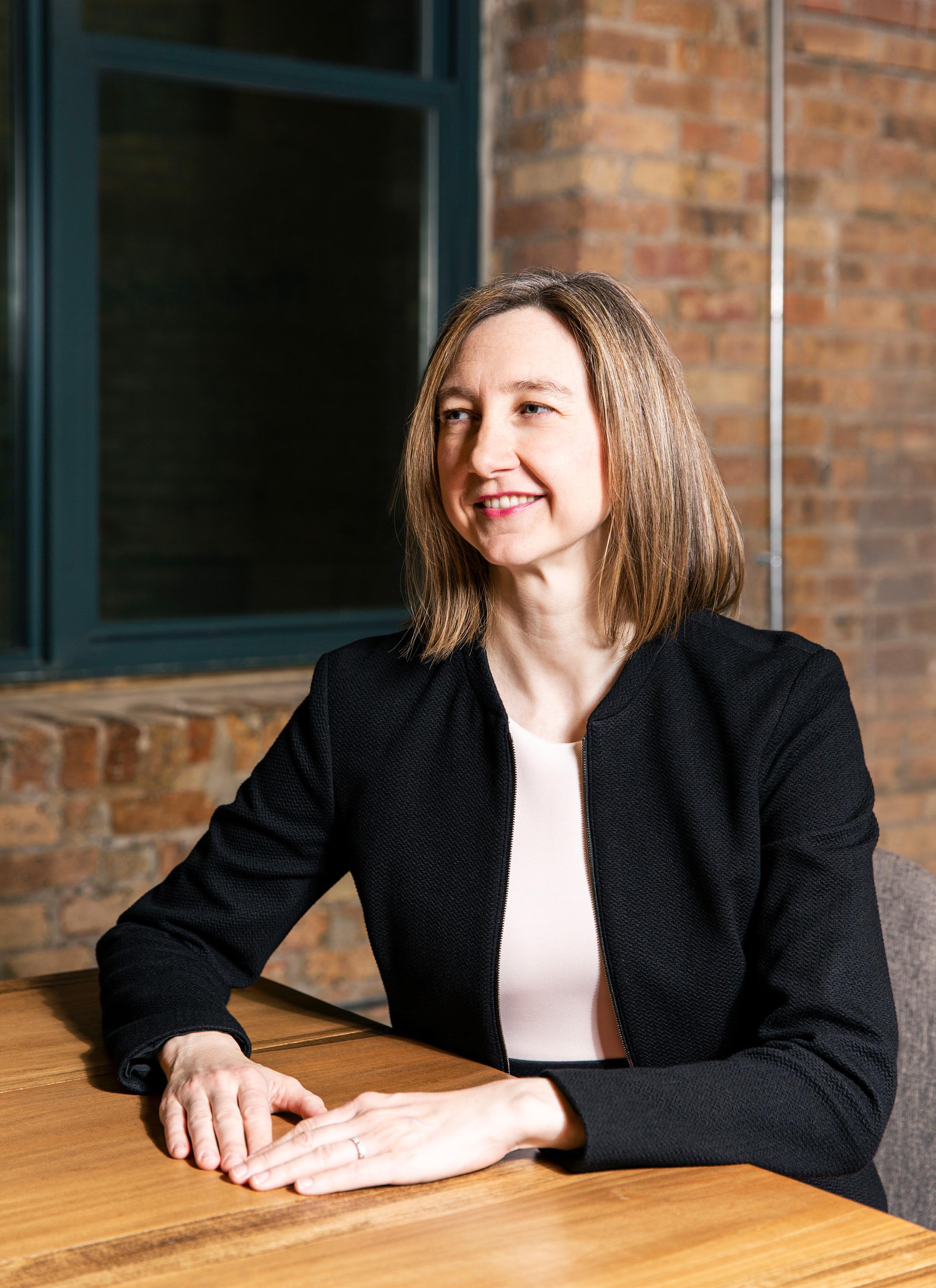
Modern Counsel 111
Expertise Spotlight
Kirkland & Ellis LLP is one of the world’s leading law firms, with more than 2,700 lawyers practicing M&A, private equity and other complex corporate transactions, litigation, arbitration, white collar and government disputes, restructuring, and intellectual property matters from fifteen offices in the United States, Europe, and Asia.
As a leading adviser to some of the world’s largest public companies and their directors and officers, Kirkland is well-equipped to advise on the entire spectrum of corporate and securities matters. We integrate top attorneys from our M&A, litigation, executive compensation, securities litigation, government investigations, and crisis management teams with experience in public company advisory and governance, shareholder activism, fiduciary duties, shareholder relations, disclosure, and compliance issues to adeptly guide clients to desirable outcomes. This cross-disciplinary approach combines best practices and practical judgment to withstand today’s heightened regulatory scrutiny and litigation risk.
We also represent clients in a wide variety of securities offerings, including investment-grade, highyield and convertible debt offerings; private placements of equity and convertible securities; initial public offerings; and follow-on and secondary equity offerings. Kirkland advised on two of the top ten largest corporate bond deals of 2019, including Bristol-Myers Squibb’s $19 billion bond offering to finance its $90 billion acquisition of Celgene, the largest biopharmaceutical transaction of all time.
the deal, but when the announcement was made in January 2019, it sent shock waves through the industry—and the company itself.
“People were excited, but we had very strict limitations on when and how we could talk about the deal based on securities laws and other regulations,” Kelly says. “I was on a SWAT team of a few core lawyers who fielded questions and put together easy-to-understand guidance, complete with illustrations, so people could easily grasp the rules of the road for the foreseeable future.”
Kelly’s colleagues admire her energy, among other attributes. “Kate’s passion for her work is surpassed only by her commitment to helping patients prevail over serious diseases,” says Sophia Hudson, capital markets partner at Kirkland & Ellis. “Kate leads Bristol Myers Squibb’s corporate governance and securities teams with an eye toward ensuring that BMS is best positioned to deliver for patients. Her

unwavering commitment to mission critical was never more apparent than in our work together on Bristol-Myers Squibb’s merger with Celgene, a monumental effort to bring innovative medicines to patients around the world.”
The transaction was complex, and made even more complicated by the fact that not long after the planned merger was announced, one BMS shareholder publicly announced its opposition to the transaction and its intention to try to convince other investors to scuttle the deal. Despite the difficulties, Kelly says that it was an “incredible experience to have lived through.” She’s proud that BMS was successful in the end.
“There’s nothing like working alongside a trusted team of people when there’s a critical matter,” Kelly says. “Being able to successfully navigate to this point, there’s a lot of excitement and energy directed toward the future of our combined company.”
Lead 112

Modern Counsel
Defining Success Through Leadership
As VP and deputy general counsel at Builders
DERYL WARD’S LEADERSHIP
philosophy is born of personal experience: one of the main lessons he teaches his direct reports, he says, is that being exposed to new things is the best way to build skills, experience, and confidence. When Ward was hired at Builders FirstSource in 2003 as senior contracts manager, his experience was as a litigator—working for a leading supplier of building products, components, and value-added services in the US was an entirely new experience for him.
“When I went in-house [at Builders FirstSource] my main focus was to negotiate construction contracts for a $1.7 billion company, and I had never done it,” Ward says. “My first task at this company was to learn something totally new and become an expert in it as quickly as I could.”
By Bridgett Novak
Seventeen years later, Ward is vice president and deputy general counsel for Builders FirstSource, which is now a Fortune 500 company, but he still vividly remembers his first few years on the job. “They were growing quickly, acquiring eighteen businesses in eighteen months, and needed a more formalized process for contracts. I established rules regarding their content, who could sign them, and who should review them,” he explains. Those efforts were put to the test in 2005, when the company launched its $2.3 billion IPO. The internal controls that Ward helped establish assisted the company in meeting the Sarbanes-Oxley requirements in that area without any compliance infractions.
Ward also helped facilitate Builders’ $1.6 billion acquisition of ProBuild Holdings in 2015. He was integral to the extensive due diligence and integration process and designing the organizational structure for the newly
FirstSource, Deryl Ward has helped the company expand exponentially—but it’s his leadership role that drives him
Lead 114
combined legal department. (Builders had four people in its legal department before the acquisition; it now has fourteen.) “That was a transformative acquisition for us,” Ward notes. “ProBuild was three times larger than Builders. We had operations in nine states; they were in forty. We went from reviewing seven hundred contracts a year to four thousand.”
Ward spent considerable time studying how ProBuild conducted its business and mitigated risk. “To make sure I understood everything properly, I worked in the ProBuild legal department for one month after the close,” he says. “All that effort ensured a smooth transition throughout the process.”
One of the things Ward enjoys most about his job is that he’s constantly given opportunities to grow—both as an attorney and a manager. “The culture at Builders FirstSource is one where we really value capabilities,” he says, “so it’s a fertile ground for people who want to expand their skills, expand their knowledge, and expand their confidence.”
And as a manager, Ward takes his leadership role very seriously. “It’s my responsibility to provide the best
Deryl Ward VP and Deputy General Counsel Builders FirstSource

career path that I can here at the company and to be a mentor, be a source of information, and also to make sure that they are challenged and grow as attorneys and managers,” he says.
Ward emphasizes to his direct reports that Builders FirstSource is a company that cares about its people, their development, and their careers. He strives to have that development occur in a culture that has been focused by his leadership on fostering teamwork and cohesiveness. Although on a daily basis he has many challenging responsibilities to deal with, Ward says he prioritizes his time in a manner that allows him to mentor team members on how to achieve their professional goals and meet the expectations of a rapidly evolving, successful company.
Ward says the dedicated leadership philosophy he follows has been one of the catalysts that has helped create a legal department that consistently provides cutting-edge advice and counsel to its corporate constituency. Looking forward, Ward’s overriding goal is to continue to assist in the process of developing and cultivating a legal department of consummate professionals.
“It’s my responsibility to provide the best career path that I can here at the company and to be a mentor, be a source of information, and also to make sure that they are challenged and grow as attorneys and managers.”
Beau
Bumpas Photography
Modern Counsel 115
Expertise Spotlight
Builders FirstSource partner Goldberg Segalla is one of the largest and fastestgrowing Am Law 200 firms headquartered in the US, with a footprint reaching from Los Angeles to London. With more than four hundred attorneys and teams based in New York, Chicago, Philadelphia, Miami, St. Louis, and other major business and economic centers across ten states, Goldberg Segalla is positioned to assist large, industry-leading companies like Builders FirstSource with virtually any legal need—from complex commercial litigation and bet-the-company claims to transactions, employment counsel, risk management, and regulatory concerns.
The firm’s over seventy-lawyer construction practice, under the direction of chair Christopher J. Belter, is stacked with trial attorneys, experienced construction litigators, and trusted counselors to the largest suppliers, contractors, and other players in the industry nationwide. With robust construction defect litigation capabilities—and experience serving as litigation and trial counsel in high-stakes matters, monitoring counsel for claims in jurisdictions across the country, and expert consultants on design and construction coverage issues—Goldberg Segalla’s construction practice also includes deep benches representing worksite injury defense, rapid response, OSHA, and other services.
Longtime clients rely on the same level of collaborative, proactive, and cost-effective counsel from other firm practices, including trucking, employment and labor, product liability, and more. This consistency of service across the firm’s footprint and diverse practices derives from a commitment to the same foundational value that inspires leaders like Builders FirstSource’s Deryl Ward—to be excellent professionals, and even better human beings.
Another facet of Ward’s leadership philosophy involves working on philanthropic projects with his colleagues. The legal department has won the company’s food drive twice. In 2018, they collected more than fourteen thousand pounds of food for the North Texas Food Bank. More recently, the department adopted three families as part of the company’s support of the Family Place, which helps victims of domestic violence. “Giving back to one’s community is the right thing to do,” Ward says, “and doing it with other members of the team strengthens our bonds, both personally and professionally.”
How does Ward handle such a wide variety of tasks so successfully? “I’ve become adept at taking on new areas of law and becoming a subject matter expert in those areas,” he says. “To make that happen, two things are critically important: time and focus. You’ve got to make time to find the right resources and then study them completely.
“In addition to book knowledge,” he continues, “it often helps to contact someone who has experience with similar situations and ask them to ‘download’ to me what they know. That’s one reason why nurturing relationships and helping others when they ask is so important. It takes a lot of discipline and a focus on efficiency, though. These days, you have to guard your time with great diligence so you can focus on things that will drive the success of those you lead, mentor, and provide counsel to.”
Goldberg Segalla:
“I am so proud to work with Deryl, and I know his colleagues at Builders FirstSource feel the same. He is inspiring to be around. His leadership, sophistication, and long-term view, coupled with his broad experience, help achieve optimum outcomes in pending litigation.”
—Neil Goldberg, Partner
Lead 116
“The culture at Builders FirstSource is one where we really value capabilities, so it’s a fertile ground for people that want to expand their skills, expand their knowledge, and expand their confidence.”
Striving for “Yes”
FOR THE THIRD YEAR IN A ROW IN 2019,
Farm Credit Mid-America has elected to return money to eligible customers as part of its Patronage program. The number, $146 million, was yet another record. “With this year’s Patronage, the total returned to our customer/owners since 2016 will be $262 million,” says Bill Johnson, president and CEO of Farm Credit Mid-America. “This is an especially meaningful year because of the challenging economy and market uncertainties farmers have and continue to face.”
Farm Credit Mid-America delivered thirty-six-thousand checks, often in excess of $20,000, all over rural Indiana, Ohio, Kentucky, and Tennessee. “Our commitment to sharing profits with our farmers comes from our structure,” Johnson said in a statement. “Our farmers are borrowers, but they’re also investor/owners—they have a stake in the association and in our success.”
By Will Grant
FCMA has made more than $23 billion in loans to more than 100,000 different borrowers since its 1908 inception. And senior vice president and general counsel Greg Hoffman is helping ensure the Louisville-headquartered agricultural lending cooperative is able to continue doing so into another decade.
Hoffman has led legal operations, government relations, and corporate governance for FCMA since joining in 2018. Prior to his current role, Hoffman served as managing counsel for global sales and strategic initiatives for GE’s Appliances division. FCMA’s one hundred offices across the greater Midwest and eleven hundred employees are a world apart from Hoffman’s north Florida upbringing in a town of less than fifteen hundred.
The legal head says he and everyone on the legal team are business leaders
Modern Counsel 117
Farm Credit Mid-America’s Greg Hoffman keeps legal and business aligned in ways that allow the company to give back to its customers by the millions
first, before all else. The goal is always to understand how the legal department fits into the overall goals of the business. That effort requires being less transactional and instead developing a more holistic business focus.
That sort of mind-set requires a particular kind of talent and an openness to the idea of operating as a true business partner. Hoffman says in hiring talent, he empowers them by removing barriers so they, in turn, can help strengthen the teams of which they are part. FCMA’s rural roots can offer a challenge in terms of location for lawyers who think they might belong in Manhattan, but Hoffman contends that the culture of the organization speaks for itself.

Hoffman says that he’s endeavored to get his team to align on simple behaviors like thinking big, living agilely, pushing for excellence, and striving for “yes.” The chief legal counsel spends a great deal of time thinking about the ways in which he can empower his own people to be their best.
And while people are Hoffman’s passion, the lawyer says tech and data are used to ensure efficiency, manage outside counsel, and help maintain a great internal customer experience. That focus on greater operational success and an empowered team may just be one of the contributing factors to FCMA’s ability to give so much back to the communities it serves, but it’s no small feat to continually align legal with business, and Hoffman continues to keep his team well ahead of the curve.
T-I/Shutterstock.com Lead 118
Farm Credit Mid-America is rooted in rural areas like the one pictured above: a Michigan cornfield in September, set against the backdrop of a red farm building and tree line.
Good Energy
Collaboration is the
to success
By Keith Loria
JACQUELINE HOBBS BECAME INTERESTED IN THE law at a young age, thanks to her mother, who worked as a legal secretary. “There were times I would have to go to work with her. I remember meeting all the lawyers in the office and sitting there pretending to do legal research,” she recalls. “I would see the clients come and go, and I knew early on that was what I wanted to do.” Today, Hobbs is an associate general counsel at Duke Energy, one of the largest electric power holding companies in the United States, founded in 1904 and headquartered in Charlotte, North Carolina.
Hobbs attended the University of Cincinnati for both undergrad and law school. During an in-house legal externship, she realized that working as in-house counsel was her ultimate goal. Right out of law school, she was hired at the law firm of Ulmer & Berne in Cincinnati, Ohio.
“I practiced law for about eight years and at that point, felt like I had developed the skills and experience to allow me to transition successfully into an in-house role,” Hobbs says of her time with the firm. “I was really fortunate to get opportunities that more senior attorneys typically get.”
For instance, as a junior associate, she was second chair in a jury trial and first chair on the appeal, first
chair in a number of bench trials, and prepared and argued significant motions in both federal and state courts, including a motion involving the right to a jury trial under the WARN Act as well as an issue of first impression in Ohio.
In 2005, Hobbs took the position of counsel for Duke Energy doing employment litigation work in its Cincinnati regional office. Although she had never done work in the energy industry before, she was looking for a challenge, so she powered full steam ahead. “During my time at the firm, I worked with pharmaceutical companies, construction companies, and many other industries, but never an energy company,” she says. “I was excited by the opportunity.”
Making the switch to in-house counsel was just as rewarding as she’d expected: Hobbs appreciated having a close relationship with her clients and spending significant amounts of time with them, something that rarely happens in private practice. “There’s a lot of benefit to that. You get to know them really well and really get to know the business,” she notes. “The energy business is complex and ever-changing, so early on, I decided I was going to learn as much as I can from my clients.”
Over her fifteen years at Duke Energy, Hobbs’s range of responsibilities has increased in proportion to
Modern Counsel 119
key
for Jacqueline Hobbs, an associate general counsel for Duke Energy
Expertise Spotlight
Founded in California in 1942, Littler is an international law practice with more than fifteen hundred attorneys devoted exclusively to representing management in employment and labor law matters. Client service and innovation are among the cornerstones of our practice. Littler has represented more than fifty thousand employers in virtually every industry, on a regional, national, and global basis, across the gamut of labor and employment matters. As a result, we understand the issues affecting small companies as well as the world’s largest corporations. Clients with operations in different locations rely on our broad experience and geographic reach to help them strategically, efficiently, and cost-effectively manage their employment and labor matters across multiple jurisdictions.
the exponential growth of the company itself. When she first started, there were about seven thousand employees, but through a number of acquisitions and mergers, that number has climbed to more than thirty thousand. “I started out doing employment litigation, and as the company got bigger, I transitioned into an employment law advice and counseling role and also started doing a lot of traditional labor law,” Hobbs says. “I love advice and counseling. It’s a way to partner with your clients and get a glimpse into the inner workings of the business and how our leaders think and what’s important to them.” As far as her leadership style, Hobbs describes it as “very collaborative.”
“When I go into a meeting, I think it’s important to involve everyone at the table so we get diverse opinions and recommendations so whatever decision we end up making, I can make sure it’s in the best interest of our company and our customers,” she says.
Today, she is part of a team of seven labor and employment attorneys—a tight-knit group that she says is extremely supportive of one another. “The HR legal team is committed to educating clients on day-to-day legal issues and compliance issues that affect how we operate,” Hobbs says, noting that it involves proactive training. For instance, she will travel to power plants and give presentations on topics such as employment law basics for first-line
supervisors, coemployment issues, and traditional labor law concepts.
Since starting with the company, Hobbs has handled more than seventy-five labor arbitrations, represented HR legal in multiple contract negotiations with labor unions, and provided day-to-day support and guidance to HR and management on employment and labor matters. According to Hobbs, though, that isn’t her biggest professional achievement.
“My greatest accomplishments at Duke Energy are the relationships I’ve been able to build—not just with clients but also with colleagues,” Hobbs says. “In my role, I realized early on how important it is that you have people around you that you can go to for mentoring, support, collaboration, and information. I would not be where I am today without both my clients and colleagues.”
Hobbs also appreciates the pro bono work that Duke Energy does. Not only does she enjoy taking part in offering free legal services to nonprofits in the Cincinnati area through the Pro Bono Partnership of Ohio, but it’s a topic she’s passionate about.
“Duke Energy is dedicated to giving back to the communities we serve, and in the legal department, we make pro bono work a priority,” Hobbs says. “I feel like I’m giving back to the community with my pro bono work, and it’s an easy way to get involved and pay it forward.”
Lead 120
“I love advice and counseling. It’s a way to partner with your clients and get a glimpse into the inner workings of the business and how our leaders think and what’s important to them.”
An Unexpected Course
Jennifer Judge had never planned to go in-house, but as Caliber Home Loans’ senior vice president and deputy general counsel, she’s found her place
By Stephanie Zeilenga
AS A LAW FIRM LITIGATOR, JENNIFER JUDGE USED to think one thing when she heard about lawyers who went in-house after an opportunity just fell out of the sky: “Yeah, right.” But then it happened to her.
One of her former coworkers—a mentor from when she was a summer associate—had recently gone in-house at Caliber Home Loans, and called her up on a Friday to tell her about a new position for labor and employment work: Judge’s specialty. At the time, Judge was a senior associate at Littler Mendelson, on track to make partner. She loved her job and said she wasn’t looking to make a move. But she also had two young sons and a husband who traveled extensively for work. “I ended up working Friday night and all weekend. On Monday morning, I asked my mentor to do lunch. I thought there had to be a better way.” Within a week, she had an offer.
Judge came on board at Caliber Home Loans in 2015 as vice president and assistant general counsel and, just thirteen months later, was promoted to senior vice president and deputy general counsel. Her responsibilities are broad, encompassing white-collar and capital markets issues, internal investigations, real estate management, vendor contract review, and
Modern Counsel 121
Jennifer Judge
corporate governance. A newer addition to her responsibilities is overseeing cybersecurity and IT issues—she makes sure Caliber’s bases are covered legally and, in the event of a breach, heads up the review and investigation, working closely with the company’s CISO and CIO. She’s also twice acted as interim HR chief, requiring her to perform two roles simultaneously for months at a time.

It wasn’t a path Judge had ever expected to take. “My entire goal had been to go partner, but specializing in noncompete, nonsolicit work meant a lot of temporary restraining order and emergency injunctive work, which is unpredictable and heavy on the hours and simply not sustainable long-term for my family,” she says.
Although the move to Caliber was an unexpected twist in Judge’s career, she has thrived there, particularly in earning the trust of the business and tailoring advice for individual stakeholders. “So much of in-house work is not what you say but who you say it to and how you say it—you’re not giving legal advice in a vacuum,” she says. “You can’t just say ‘no’—you have to engage them in a dialogue and provide guidance that’s practical and effective so the business can reach its goals in a way that’s compliant.”
Case in point: Judge’s work advising and collaborating with loan officers, whom she describes as naturally entrepreneurial and creative, full of ideas to benefit the company. “Because the mortgage industry is heavily regulated, it’s often tricky to do what they want without introducing risk,” Judge says. “As opposed to me saying ‘No, you can’t do that,’ I try to understand what they’re hoping to achieve, and we work together to find a better solution.”
Ryan Judge
SVP and Deputy General Counsel Caliber Home Loans
Lead 122
“My biggest piece of advice is you have to play the ‘game’ with the boys’ club and learn to talk like them so they learn to trust you and gain confidence in your abilities. Once you gain that trust, that’s your opportunity to push back and challenge biases.”
The mortgage industry poses additional challenges outside of its regulatory standards: it’s also heavily male. But Judge is doing her part to make it a more welcoming sector for women by mentoring and partnering with female attorneys, hiring them onto her team, or engaging them as outside counsel.
“My biggest piece of advice is you have to play the ‘game’ with the boys’ club and learn to talk like them so they learn to trust you and gain confidence in your abilities,” Judge says. “Once you gain that trust, that’s your opportunity to push back and challenge biases. You have to gain that power, then use it to make an impact.”
Judge says she is lucky that Caliber’s CEO and executive team value and promote diversity and empowering women—they recently chose her to participate in an intensive women’s leadership institute in Dallas that is only open to the top senior managers in the city. The company, and her team especially, are also understanding of the complications of nonwork life, particularly the demands of family. “My company is extremely considerate and know I have to pick my kids up at a certain time and they may hear kids in the background if I’m taking calls from the car or home,” Judge says. “It’s never a big deal—it’s one of those things where everyone here understands life happens.”
The people Judge works with appreciate her wide-ranging skills. “Imagine problem-solving and litigating with a modern Renaissance lawyer who possesses the skills and vision of a business leader, a regulator, a law firm partner, and a mom—and you have just imagined Jennifer Judge,” says Michael J.
Expertise Spotlight
Rubin Fortunato earned a national reputation for enforcement of restrictive covenants and protection of trade secrets in the securities industry, especially through swift and deft filings for injunctive relief when minutes matter. The practice has grown. Today, the firm’s long-held “minutes matter” approach applies to every client, spans many industries, and drives all of our legal advice, whether writing employment contracts, hiring from the competition, drafting employment policies, providing advice, counseling on disciplining and separating employees, investigating allegations of employee misconduct, providing employee training, enforcing restrictive covenants, or litigating a wide range of employment issues. We get the job done. We get the job done right. We get the job done right away. Rubin Fortunato is proud to be at the top of the list of law firms in the Commonwealth of Pennsylvania for highest percentage of female attorneys. Our statistics reflect not only our commitment to diversity in the legal profession but also our commitment to the pursuit of excellence for our clients and our community.
“Because the mortgage industry is heavily regulated, it’s often tricky to do what they want without introducing risk. As opposed to me saying ‘No, you can’t do that,’ I try to understand what they’re hoping to achieve, and we work together to find a better solution.”
Modern Counsel 123
Fortunato, president of Rubin, Fortunato & Harbison. “She has intellectual firepower, boundless energy, and cool judgment, while never losing sight of the business goals. She also affords us the freedom to exercise our expertise. With that wisdom, we believe that we never work for JJ; we feel that we are working with JJ.”
It also doesn’t hurt that Caliber’s legal team has a supportive dynamic, low turnover, and professional development available for anyone who wants it. “We’re basically all long-timers, and we all like and respect each other,” Judge says. “We’re protective of this part of our culture, because we know if you’re interviewing for a job in-house, that means you can cut it skills-wise, but we want to make sure you’re going to fit in with us and be able to advise and collaborate with the business.”
Modeling the example set by her general counsel, Judge manages her own team with a similar balancing act of support and trust. “My hope is that I can trust people implicitly to do their work,” she says. “I don’t want to smother them with things like status updates—it’s inefficient and we’re all professionals here, so I trust they can go get their job done.”
The company-wide appreciation for work/life balance was exactly why Judge made the switch to go in-house in the first place. She still works hard, of course, but toiling away on the weekends is now a rarity, freeing her up to live a fuller life and spend more time with her husband and sons. “I feel lucky because I genuinely enjoy my job, and I wake up thankful I had a job like this fall into my lap,” she says. “As a litigator here each day is different, and I still get that thrill of thinking on my feet and solving problems.”
Stradling:
“Jennifer is smart, practical, and adept at navigating litigation in the challenging context of the mortgage banking industry. She understands Caliber’s business objectives and connects the dots internally to get critical buy-in on litigation strategy.”
 —Jeremy Suiter, Shareholder
—Jeremy Suiter, Shareholder
Lead 124
“My hope is that I can trust people implicitly to do their work. I don’t want to smother them with things like status updates—it’s inefficient and we’re all professionals here, so I trust they can go get their job done.”


www.rubinfortunato.com salutes Jennifer Judge, 10 S. Leopard Road • Paoli, PA 19301 • T: 610.408.2000 • E: rf@rubinfortunato.com Rubin, Fortunato & Harbison P.C. A Law Firm of Action. We know that every minute matters. a modern warrior and a thoughtful, meticulous partner who inspires excellence, vision, and resilience.
A Broad-Gauged Banking Practice That Offers Best-in-Class Solutions
Ranked among the leading practices in the United States, the Debevoise Banking Group advises banks and other financial institutions on the gamut of regulatory, litigation and transactional matters.
As banking industry regulation has evolved in the wake of the financial crisis, the Debevoise Banking Group is able to address client issues with interdisciplinary, coordinated expertise. The practice advises financial industry clients on mergers and acquisitions, U.S. and international regulatory and compliance issues, enforcement matters, capital markets activities and new product development.
The Group’s work on U.S. and global efforts at financial reform has, according to Chambers USA, put it on the “cutting edge of regulatory advisory and transactional work.”

New York | Washington, D.C. | London | Paris | FrankfurtMoscow | Hong Kong | Shanghai | Tokyo www.debevoise.com
We are proud to join in recognizing Christopher Garvey of Fifth Third Bank. Chris’ exceptional skill and leadership are exemplary of Fifth Third’s continued excellence.



128
Courtesy of Fifth Third Bank
An Environment of Trust
Fifth Third Bank’s Christopher Garvey discusses his strategies for success in both private and in-house legal circles
By Sara Deeter
Modern Counsel 129
TO AN OUTSIDER, FINANCIAL LAW MAY SEEM extremely complicated—and extremely difficult to navigate. But Christopher Garvey says that at the end of the day, it’s all pretty straightforward. Modern Counsel recently caught up with Garvey to get his perspective on the strategies that have driven his success throughout his eighteen years as a private practice attorney and ten years as an in-house counsel.
“I’ve had a bit of an eclectic career,” Garvey says of his journey from undergraduate studies at the Rensselaer Polytechnic Institute—The Lally School of Management and Technology to his current role as senior

vice president and deputy general counsel of litigation and regulatory enforcement at Fifth Third Bank.
After graduating from the Albany Law School of Union University in 1992, Garvey spent nearly two decades in the private legal sector, primarily working as a trial lawyer and equity partner at New York–based law firm Goodwin Procter. And as he sees it, that private practice work was an ideal foundation for the rest of his legal career.
“From very early on in my career, I got to experiment and try out different trial styles,” Garvey recalls. “I made mistakes, of course, but I was able to work
Garvey SVP and Deputy General Counsel, Litigation & Regulatory Enforcement Fifth
Christopher
Third Bank
Lead 130
Courtesy of Fifth Third Bank
on all sorts of cases, big and small. I also had people who took an interest in my career and who exposed me to many different types of people so that I could watch them and see what works and what doesn’t.”

While Garvey loves practicing law, he says he’s “never been one to want to work on the same types of cases or issues over and over again.” So for him, that variety of experience was essential. He emphasizes, though, that lawyers don’t need to wait for other people to expose them to different working styles.
“You can do that yourself while working with your colleagues, while working with opposing counsel, or even sometimes on your own,” Garvey says. “If you spend a lot of time in court, you’ll see what arguments work, what doesn’t work, what your audience is, and what makes each case is just a little different from the last.
“I really believe in effectiveness, but I use that term situationally,” he adds. “Each situation has a slightly different solution than those you’ve encountered before. You may have to change your tactics and your strategies and adjust on the fly.”
Garvey left Goodwin Procter in 2011 to join the in-house department
Expertise Spotlight
Debevoise & Plimpton LLP is a premier law firm with market-leading practices, a global perspective, and strong New York roots. Our clients look to us to bring a distinctively high degree of quality, intensity, and creativity to resolve legal challenges effectively and cost-efficiently. Ranked among the leading practices in the United States, the Debevoise Banking Group advises banks and other financial institutions on the gamut of regulatory, litigation, and transactional matters, including Volcker Rule matters for US and foreign banks, foreign bank regulation, AML and sanctions compliance and enforcement issues, Dodd-Frank Act reform, M&A-related regulation, and industry-wide advocacy efforts. Our team includes lawyers who have held senior positions at regulatory and enforcement agencies and who have advocated before and negotiated with regulators in the United States, the United Kingdom, and other jurisdictions, including the Federal Reserve and other US banking regulators, the Consumer Financial Protection Bureau, the Department of Justice, state attorneys general, and the New York Department of Financial Services. Our nuanced understanding of the regulatory terrain, combined with the firm’s strong litigation and transactional resources, gives us the ability to handle the most esoteric technical issues, manage critical enforcement and compliance challenges in the new regulatory environment, and lead complex and sophisticated transactions.
Modern Counsel 131
“You’re building an environment of trust so that you and everyone on your team functions at the highest level possible.”
WELL DONE
at Bank of America. More than six years later, he was hired as part of the in-house team at Fifth Third Bank, which is now one of the largest banks in the country.
“The head of litigation and regulatory enforcement is a critical legal role at any prominent bank, and Chris fills it superbly,” says Gregory Lyons, partner at Debevoise & Plimpton. “Bright and collaborative, he strategically evaluates alternatives and also ensures his approach is consistent with Fifth Third’s broader objectives.”

Banking law is a perfect fit for him, Garvey says: given its complexity, there are always “new and interesting challenges and solutions to new and interesting problems.” But as Garvey has learned, many of the solutions to those complex problems center on simple principles that have stood the test of time.
“It all starts with partnership and communication,” he says. “I’ve worked in smaller organizations and for Fortune 500 companies. But wherever you are, it always comes down to respecting your colleagues and respecting how your work may touch upon or impact them.”
Litigation disputes often involve or impact the overall company, people working in other departments within the company, outside counsel, or external constituencies, Garvey explains. By opening the lines of communication and keeping your relationships with those internal and external partners strong, you’re better able to prevent those disputes from disrupting everyone’s working rhythm.
Learn more at goodwinlaw.com.
“Communication isn’t just the right thing to do. It may also help you get to a better result,” Garvey says. “When you bring everyone together and talk across business lines, you begin to see trends: other groups may be seeing a similar issue and may have great thoughts on it, which can trigger
Lead 132
“Communication isn’t just the right thing to do. It may also help you get to a better result.”
At Goodwin, we use law to enable our clients’ success.
When we partner with our clients to practice law, we do so not just with integrity, but with ingenuity, agility and ambition. And in so doing, we are able to make a powerful, positive and lasting impact.
Goodwin congratulates
Christopher Garvey, Fifth Third Bank’s SVP and Deputy General Counsel, on his accomplishments and recognition by Modern Counsel.
Garvey Senior Vice President & Deputy General Counsel


congratulates Christopher
on his accomplishments and well-deserved recognition by Modern Counsel www.gibsondunn.com
CHRIS GARVEY
the conversations that will help you find different ways to navigate risks.”

Every attorney out there, whether they’re in private practice or an in-house role, needs to have those conversations about risks, Garvey says. In fact, the necessity—and complexity—of those conversations was impressed upon him during the early days of his legal career.

“You have to forecast in many different dimensions of risk,” he notes, “not just whether you’re going to win or lose or how much money is at risk but also factors such as what it’s going to cost to get from point A to point B and how your reputation might be affected.”
And once you’ve assembled a portfolio of all the potential risks, it’s your responsibility to develop the tools to communicate those risks to all of your internal colleagues as well as your client, Garvey says, making sure that everyone has not only been told of the risks but also truly understands what they mean.
“When you are regularly and proactively communicating what should be communicated, you’re empowering those around you,” Garvey says. “You’re getting your client the information they need, and you’re building an environment of trust so that you and everyone on your team functions at the highest level possible.”
Goodwin:
“Chris Garvey’s dedication to leadership and excellence, and his unparalleled experience in regulatory and litigation matters, is apparent through his continued success at Fifth Third. Working with Chris and Fifth Third is always a great pleasure.”
—Tom Hefferon, Partner

Lead 134
We are proud to support our friend and client
www.wc.com Modern Counsel (11-13-19).indd 1 11/13/2019 4:04:10 PM
of Fifth Third Bank and congratulate him on his dynamic career and continued success.
The Mantle of Mentorship
Glenwood Hill, assistant general counsel of Preston Hollow Capital, is dedicated to helping others and advocating for diversity in the law
By Keith Loria
GLENWOOD HILL HAS LONG BEEN inspired by an Alex Haley quote: “Anytime you see a turtle up on top of a fence post, you know he had some help.” Hill has worked hard to get where he is today—assistant general counsel of the finance company Preston Hollow Capital—and he’s been dedicated to helping and advocating for others along the way.
Growing up on a farm in Fort Valley, Georgia, about ninety minutes south of Atlanta, Hill excelled at just about everything he did in high school—football, tennis, public speaking, and debate. After getting an undergraduate degree in biology from Florida A&M University, he entered the Army, eventually serving as a company commander at Fort Sam Houston in San Antonio, Texas. He was responsible for everything that occurred in the unit, including maintaining the “good order and discipline” of his charges—which included regular conversations with the higher organization’s assigned attorney.
“After personally conducting numerous investigations of inspector general complaints and equal opportunity complaints and recommending disciplinary actions—and leniency— for soldiers in my unit and others, I came to know and understand the Uniformed Code of Military Justice quite well,” Hill says. “Given that familiarity with legal reasoning, when I left active duty service, I figured law school was a reasonable next step.”
He not only went on to earn his law degree from the University of Texas at Austin but also got an MBA from Webster University. After practicing public finance law with the practices of Bracewell and Vinson & Elkins for
Modern Counsel 135
almost a decade, Hill joined Preston Hollow Capital in 2017 as assistant general counsel.
At the Dallas-based firm, Hill’s chief responsibility is working with the Originations Group, which identifies transactions it might be interested in, ensuring all deal points are negotiated properly and evaluating transactions for compliance purposes.
Hill’s work—along with lessons learned from his parents while he was growing up—has inspired him to advocate for issues including diversity and inclusion, community service, mentoring, and veterans’ issues.
“My parents instilled many lessons during my childhood: prioritizing work, keeping your word, and giving people a fair shake,” he says. “Although I incorporated those and many other values from my parents and added in a large helping of Army values, nothing has inspired my focus on diversity and inclusion initiatives and mentoring like my years of practicing law in international law firms.”
Hill’s dedication to helping others stems partly from his own experience: although both his parents have professional degrees, there were no attorneys in his extended family, let alone anyone who could advise him on excelling in a corporate law practice. Practicing in “big law,” he notes, pulled back the curtain in a sense and allowed him to see the benefits and vagaries of opportunity.
“No one accomplishes anything of note or worthy of accolade without some help—neither Sergey Brin nor Mark Zuckerberg nor Oprah Winfrey nor Michael Bloomberg nor Shawn Carter,” he says. “No one. Once you understand that any success you personally enjoy flows from an amalgamation of individual hard work and preparation, the randomness of opportunity, and the intervention of others, you would be churlish not to feel the need to pay things forward by sharing opportunity with others.”
For the past six years, Hill has served on the State Bar of Texas Standing Committee on Diversity in the Profession. As a member and chair he makes recommendations to the State Bar of Texas Board of Directors for how the bar can take action to enhance employment and economic opportunities for minorities in the profession and to increase involvement by minorities in the bar. He has also helped plan and lead programs aimed at helping law school students
 Assistant General Counsel
Assistant General Counsel
Glenwood Hill
Preston
Hollow Capital
“Once you understand that any success you personally enjoy flows from an amalgamation of individual hard work and preparation, the randomness of opportunity, and the intervention of others, you would be churlish not to feel the need to pay things forward by sharing opportunity with others.”
Lara Bierner Photography
Lead 136
understand how to create a successful legal career as well as helping current attorneys build their professional network.
“Most importantly, our committee members, in association with their local bars, have made presentations to hundreds of public school students to explain what a lawyer does and how they can become lawyers,” Hill notes. “I sincerely believe that the key to creating diversity in law firms is developing a diverse recruitment pool, and these programs directed at law students and grade school students are simple steps to achieving that talent-pool diversity.” Additionally, Hill relied on his network of like-minded colleagues across Texas to help draft an amicus curiae brief in connection with the State Bar of Texas’s response to McDonald v. Sorrels, a complaint filed in United States District Court for the Western District of Texas (Austin) that, among other things, challenged State Bar of Texas programs promoting diversity and inclusion as well as access to justice.
Hill’s commitment to mentoring and community service extends well beyond areas related to the legal profession. “For many years, I was a community match volunteer with Big Brothers Big Sisters Lone Star, and then I transitioned to the organization’s Mentor 2.0 program, which provided mentoring opportunities using email and in-person communication,” he says. “Helping my mentee with homework, talking about college and life plans, and just showing an interest, I hope, made a difference. There are children who just need to spend time with adults who are doing the right thing.”
For Hill, giving back to others isn’t just an obligation; it both reminds him to be grateful for what he has and pushes him to do more.
“Mentoring and community service help me realize each day how much I have to be grateful for, and how much I yet have to accomplish,” he says. “I urge everyone to take up the mantle and find some way to mentor regularly.”
We applaud our client and colleague Glen Hill on being recognized by Modern Counsel for his firm dedication to inclusive communication and collaboration in his role as assistant general counsel at Preston Hollow Capital. Utilizing our deep local and global resources to represent public and private sector clients in economic development projects, we are delighted to work with Glen and our Preston Hollow Capital colleagues to continue to achieve success.
To find out how we can help you, contact:
 Greg Daniels Partner, Columbus
Greg Daniels Partner, Columbus

T +1 614 365 2789
E greg.daniels @squirepb.com squirepattonboggs.com
Modern Counsel 137 Congratulations
“There are children who just need to spend time with adults who are doing the right thing.”
Work for What You Want
Megan Ryan toiled tirelessly to become a top-level executive and legal leader at Nassau Health Care Corporation—and now she works even harder to manage her 3,300 employees
By Sara Deeter
MEGAN RYAN ISN’T AFRAID OF HARD WORK. As executive vice president, general counsel, chief legal officer, and chief compliance officer at Nassau Health Care Corporation (NHCC), Ryan works tirelessly to not only lead the thousands of people under her management but also to support and empower the thousands of medically underserved individuals living in Nassau County.
A graduate of St. John’s University School of Law, Ryan spent nearly seven years as a law clerk and attorney at private practice firm O’Reilly, Marsh, and Corteselli before transitioning to an in-house counsel role at Liberty Mutual Insurance. “I worked for a lot of smart, driven attorneys,” Ryan says of her early career. “But those attorneys never asked us to do anything that they wouldn’t do.”
Ryan follows the same ethos: of all the people whom she currently manages at NHCC, she wouldn’t ask a single one to work on weekends or nights if she weren’t willing to do that herself, she says. “I keep myself in the midst of things. When I first started running the legal department, I was just trying to streamline different processes, run different contracts, and stay mindful of corporate governance. And especially now that I have 3,300 employees, it’s critical that the legal department flows and stays responsive to questions from both employees and patients.”
However, Ryan’s mission to improve the legal department’s efficiency is complicated by the fact that Nassau’s primary hospital, the Nassau University Medical Center, is the only public hospital in a county where approximately sixty thousand people live in poverty.
“It obviously means we have a very high patient population,” Ryan says of Nassau’s status as a public benefit corporation. “But because it’s a government hospital, it also means that we have to navigate a lot of different regulations. Every day we get new questions and issues that we didn’t have the day before.
“But that’s what keeps it exciting,” she adds. “Whether the patients are requesting access to records or their family members have questions or they’re trying to get into a certain program, I just try to do the right thing and be helpful to the community. I think that drives what we’re all doing, and certainly what I’m doing.”
Lead 138
Putting the “Service” in Board Service Outside
That sense of drive has come in handy in more ways than one, Ryan notes. Despite the fact that three different hospital systems—not to mention a twenty-person corporate board— had to unanimously approve her hiring when she first came on board at Nassau, Ryan has still had to work hard to prove her expertise to those around her.
“The hospital is a male-dominated field, just like the legal department. If I’m at the hospital, people will assume I’m a nurse. I’ve gone into meetings and have been asked to take notes or to get coffee,” explains the two-time recipient of the Long Island Power Woman award.

Over the years, Ryan has been successful in altering that dynamic. “Things have changed since I started here,” she says. “People leading all sorts of different departments come to me with their questions, to ask for help, or just to seek out advice. I think you just have to really let your work ethic be known and, little by little, build up your reputation so that people are aware of the kind of work you do.”
To Ryan, the idea of “really working for what you want” holds true no matter what circumstances you find yourself in—and is something that she tries to model on a daily basis for her young children. “I always try to do the right thing for them,” Ryan says of her kids. And often, the attorney points out, doing the right thing means “showing my daughter that she can be anything she wants to be. My own mother taught me that, and I’m very proud to have gotten to where I am now.”
So just keep plugging away, Ryan advises, even when you think you might not succeed. “Because eventually,” she says, “I think you will succeed.”
of Nassau Health Care Corporation, Megan Ryan puts her expertise in board compliance, corporate governance, and strategy to good use as the president and a trustee of the North Merrick Board of Education.
“I’ve been a lifelong resident of this district,” Ryan remarks. “I think it’s important as a community member to know what’s going on—and to help shape what’s going on.”
Abrams Fensterman:
“Meg Ryan brings intelligence, passion, commitment, and a tremendous work ethic, to her position as general counsel of NUMC.”
Modern Counsel 139 Garfunkel Wild is proud to salute and work with MEGAN RYAN NASSAU HEALTH CARE CORPORATION Congratulations on the well-deserved recognition. garfunkelwild.com GARFUNKEL WILD, P.C. ATTORNEYS AT LAW GW Great Neck, NY 516.393.2200 Stamford, CT 203.336.0483 Albany, NY 518.242.7582 Hackensack JN 201.883.1030
–Howard Fensterman, Managing Partner
Changing Lanes
After thirty-five years at a prominent corporate law firm, Leigh Ryan has brought her considerable expertise to an in-house role at Teleperformance
By Clint Worthington
FOR
LEIGH RYAN, MOVING TO A NEW COMPANY
after thirty-five years wasn’t the easiest decision. But after spending more than three decades in various branches of global law firm Paul Hastings, she felt it was time for a change. Now, as chief legal officer and chief compliance officer of omnichannel business services company Teleperformance, Ryan finds herself in a whole new corporate culture—it’s one she’s familiar with, but the transition still comes with its own unique challenges.
The decision to leave Paul Hastings was a difficult one for Ryan, who joined the firm right out of law school. Having worked at the firm as a summer clerk while studying law at Georgetown, she quickly accepted a full-time position in its LA office after graduation. A few years in, she found herself acting as a culture setter for the firm as it opened new offices, first in New York, where she worked for more than fifteen years, then in San Diego, where she worked for more than twelve years.
Ryan was familiar with Teleperformance before she made the leap: at Paul Hastings, she’d represented the company as primary outside counsel for more than twenty-five years. “I’d known them for a long time before I joined them,” she remarks. Founder, Chairman, and CEO Daniel Julien had broached the subject
Lead 140
of bringing her in-house several times over the course of their working relationship, but it wasn’t until late 2015 that Ryan finally decided it was time to try something new. That rapport made it uniquely appealing for Ryan to move in-house: “I would never have left Paul Hastings for another law firm, nor any other client except Teleperformance, which I knew so well and had a strong, deep relationship with,” she explains.
When she moved to Teleperformance in early 2016, Ryan found it tremendously exciting to be in a totally new corporate environment after decades in the client-based world of a big practice. “You get bombarded with information,” Ryan says. “Although I knew the company well, there was a lot of new information to master, myriad aspects of the company and its business that I wasn’t familiar with.”
This, for Ryan, speaks to the difference between outside and in-house counsel. With the former, you’re brought in to represent the company on significant matters for which they need special expertise. When you go in-house, she says, “you have to grasp all the inner workings of the company, not just the major deals.”
The culture change was also significant: Teleperformance has 330,000 employees in 80 countries around the world, all with varying levels of knowledge, seniority, and experience. To better familiarize herself with the company, Ryan spent much of her early days “asking a lot of people a lot of questions,” learning the intricacies of the business, its finances, and what major strategic decisions were coming up.
At the same time, she focused on bringing her own perspective from her time as outside counsel to her in-house team. One of her biggest priorities has

Pascaline Goret
Leigh Ryan Chief Legal Officer and Chief Compliance Officer Teleperformance
Modern Counsel 141
“As the world becomes more specialized, and we tailor our approaches to our clients to match that, it’s important that we, as lawyers, develop more vertical industry expertise.”
Eric A. Gordon
Labor and Employment Practice Group West Palm Beach,
T:
eric.gordon@akerman.com
700+ Lawyers
25 Offices akerman.com
been instilling the importance of specialization in her legal team: “As the world becomes more specialized, and we tailor our approaches to our clients to match that, it’s important that we, as lawyers, develop more vertical industry expertise,” she notes.

For instance, working with healthcare clients requires a lot of specialized expertise given the number of laws and regulations those clients must follow. Similarly, when working with banking and financial services clients, it is important for the legal team to be very knowledgeable about the regulatory environment in which those clients work. Ryan is also training her legal team to become more knowledgeable about the company’s proprietary intellectual property and how it is used in delivering services to clients. “There’s always room for improvement,” she remarks.
That push for improvement extends beyond her work at Teleperformance to the issue of gender representation in the legal field—one that Ryan feels particularly passionate about. As a woman who’s worked in law for more than three decades, she has seen tremendous progress and change when it comes to opportunities for female legal professionals. Along the way, she’s done her best to use her own experience and platform to promote gender equality in the legal field.
When Ryan first joined Paul Hastings in 1980, there were no female partners at the firm. “It was very much a male world,” she says. “There were very few role models for women [in law] when I first started.” Now, she’s glad to see progress for women in the legal profession, with more and more law firms throughout the country increasing the number of female partners and more of those women partners taking on leadership roles.
What turned the tide? In Ryan’s estimation, it came in the early 2000s with greater representation of women in in-house counsel positions. Suddenly, outside firms had women as clients, which required those firms to adapt and include more women on teams working with in-house counsel. It’s a principle she adheres to in her current role; when working with outside counsel, she often insists that her external legal team include women. For encouraging female representation in her field, she says, “It’s certainly the best tool I have.”
Whether taking on the challenge of a new job track after thirty-five years in the business or advocating for opportunities for women in corporate law, Ryan certainly has her hands full. But with her experience and skill, not to mention her passion for gender equality, she’s found a way to make the most of her significant platform.
Lead 142
Akerman applauds Leigh Ryan for her visionary leadership and impressive career. We are proud to work with Leigh and Teleperformance.
We help the world’s most successful enterprises to navigate change, seize opportunities, and overcome barriers to innovation and growth.
Chair,
FL
+1 561 671 3651
©2019 Akerman LLP. All rights reserved.
Evaluate
A look at the logistical challenges, evolving regulations, industry shifts, and cultural concerns outside the office that lawyers must analyze and navigate to manage their impact inside the office
Waves
Change of
A+E Networks Senior Vice President and Deputy General Counsel Stephanie Plasse has an eye on the future of television
By Sara Deeter
Evaluate 144
THE TELEVISION INDUSTRY IS NEVER going to become less complicated than it is right now. Consumers today can watch television on virtually any digital platform, no matter where they are in the world, and can curate their own viewing experience through videoon-demand sites such as Netflix and Amazon Prime. As senior vice president and deputy general counsel at A+E Networks, Stephanie Plasse has had a frontrow seat to those changes and has spent the past six and a half years helping the company maintain its place at the forefront of the industry.
Plasse has always been interested in media and journalism, even securing the post of editor-in-chief of the Yale Daily News while pursuing a bachelor’s degree in history at Yale University. When she started law school at Stanford University, Plasse was drawn to the subjects relating to media—“not just first amendment issues but also changes that were happening in the industry and in business,” she explains. “I was in the heart of Silicon Valley and was very interested in the telecommunications industry as well as the development of the Internet and digital.”
After graduating from Stanford in 2000, Plasse worked as an associate at well-known law firms Cravath, Swaine & Moore and Greenberg Traurig. She then spent nearly five years as director and vice president of networks business and legal affairs at HBO before joining the legal team at A+E.

Recently promoted to deputy general counsel, Plasse is now responsible for managing legal aspects of global revenue, partnerships, and distribution for A+E, a leading global media company (joint venture of Hearst and Disney), and a collection of culture brands around the world, encompassing channels: A&E,
Stephanie Plasse SVP and Deputy General Counsel A+E Networks
“Disruption, consolidation, and globalization have all been forces for massive change and have been upending content creation and content distribution ecosystems.”
Modern Counsel 145
Tess Steinkolk
Congrats to our client and friend Stephanie Plasse
We are proud that you are featured in Modern Counsel magazine. Your work as Deputy General Counsel of A&E Television and your commitment to the legal profession has earned you the respect as a leader and role model.
We look forward to our continued relationship.
Measuring Media






When A+E Networks was founded in 1983, it had only two cable channels. Today, the company has a global presence and an entertainment portfolio that includes ten linear television channels and an array of brands and media platforms.
By the numbers:
500+ million digital users 335 million people reached worldwide







8 out of 10 American households reached
Lifetime, History, and Viceland (with partner Vice Media) and beloved TV shows such as Vikings, Pawn Stars, Live PD, and Married at First Sight, among countless others. The company also has its own in-house scripted and unscripted production units, A+E Studios and A+E Originals, respectively; as well as growing its endeavors in the realm of digital/SVOD/AVOD, consumer enterprises, e-commerce, and experiential.
“I’m now overseeing—from a legal perspective—the distribution, digital, M&A, international, consumer enterprises, and technology and operations aspects of the company,” Plasse says. She explains that these focus areas allow her to align her work with the current needs and priorities of the business—which are far different from what they were even a few years ago, she adds.
“Disruption, consolidation, and globalization have all been forces for massive change and have been upending content creation and content distribution ecosystems,” Plasse says. For A+E, she adds, the first wave of that change was a proliferation of channels around the world, plus an effort to work with domestic partners that could offer digital access to the company’s video content in initiatives such as TV Everywhere. “The nature of high-quality content, like the content our company strives to create, is such that it often has global appeal to audiences all over the world.”
In addition to that push toward globalization, Plasse notes, an array of virtual multichannel video programming distributors (vMVPDs) has launched. For A+E, she says, that means “our digital platforms carry our portfolio of networks alongside our tradi-
GTLAW.COM | 2100 ATTORNEYS | 41 LOCATIONS° GT_Law Greenberg Traurig, LLP GT_Law GreenbergTraurigLLP
Greenberg Traurig is a service mark and trade name of Greenberg Traurig, LLP and Greenberg Traurig, P.A. ©2019 Greenberg Traurig, LLP. Attorneys at Law. Attorney advertising. All rights reserved. °These numbers are subject to fluctuation. 33087 Barbara Meili Chair, New York Entertainment and Media Practice MetLife Building | 200 Park Avenue New York, NY 10166 | 212.801.9200 WORLDWIDE LOCATIONS United States Europe Middle East Asia Latin America 146
tional distribution partners, such as AT&T, Comcast, DISH, and Spectrum.”
But globalization and platform diversification aren’t the only challenges the industry is facing. In recent years, subscription services such as Netflix, Disney+, and Amazon Prime have exploded onto the marketplace, and those services will soon be joined by other “giant players” like HBO Max and Peacock. “That really feels like the next big wave of change,” the SVP says. “These digitally oriented companies all have their roots in the US but have potential to become global offerings.”
And A+E has found its own way of responding to this rise in direct-to-consumer subscription services. “We’re licensing our content on a global basis and supporting the distribution of our international channels. We’ve also developed our own products, like the Lifetime Movie Club and History Vault, which are geared toward superfans, with a curated offering of the library content that they love,” Plasse says. “When it comes to the new video-on-demand services that have a lot of advertising support, we’re well-positioned as a seller to license either our program library or content from our other content creation engines and studios.”
Facilitating this ever-growing need for high-quality content as well as new revenue sources is an ongoing challenge for not just A+E but the industry as a whole, but according to Plasse, the company is more than up to the task.
“Our leadership is very proactive—it’s part of our culture to have a lot of foresight and to be prepared very early on,” says Plasse, who was honored with the CableFox Top Lawyer award in 2018 and 2019 and named a Wonder Woman by Multichannel News for 2020. “We constantly keep an eye out for new areas of content creation or technology development to help ride these waves of change.”
“Our leadership is very proactive— it’s part of our culture to have a lot of foresight and to be prepared very early on.”
Boston | London | Los Angeles New York | San Diego San Francisco | Washington © 2019 Mintz, Levin, Cohn, Ferris, Glovsky and Popeo, P.C. mintz.com Mintz is pleased to congratulate our friend and client Stephanie Plasse for her leadership at A&E and her valuable contributions to the telecom and media industry. 147
Lawyer Generates Lift Through Caring
Director of Litigation and Regulatory Counsel Brian Friedman on how JetBlue Airways’ commitment to caring fuels involvement in local communities
By Sara Deeter
Evaluate 148
AT JETBLUE AIRWAYS, DIRECTOR OF Litigation and Regulatory Counsel
Brian Friedman is more than just a talented attorney. He is also an “aviation geek,” an athlete, an environmentalist, and an LGTBQ+ rights activist. And Friedman isn’t just allowed to merge all of those passions into his work at the company—he’s actively encouraged to do so. Because JetBlue itself is more than a major US airline and award-
Brian Friedman Director, Litigation & Regulatory Counsel
JetBlue Airways
winning travel company, Friedman says. It is a partner with the communities it serves in the United States, the Caribbean, and Latin America. It is an investor in innovation and an impactful customer experience. And it is a network of people determined to help change the world, through both bold moves and individual volunteerism.
“I’ve always had an interest in aviation law, ever since law school,” Friedman says of his JD studies at the Georgetown University Law Center. “As I began my career in law, I followed the JetBlue website carefully to see when an opportunity might become available.”
In his years watching the JetBlue site, Friedman rapidly gained the practical experience he would need, first as an associate at LeBoeuf Lamb Greene & MacRae and later as a general commercial litigation associate at Sidley Austin.

“One day, I saw the perfect position,” Friedman recalls of his opportunity to join JetBlue in 2009 in a litigation manager role. In the decade since, Friedman’s role has dramatically expanded, encompassing all types of litigation as well as customer claims, regulatory work, and even a position on a committee assembled by the US Department of Transportation to draft proposed regulations on accessible airline travel.
Today, Friedman officially serves as director, litigation and regulatory counsel. But as he tells it, the actual work he handles is far more exciting—and broader—than his title might indicate.
“About a year and a half ago, I had the opportunity to branch out within the organization,” Friedman explains. “I took on the marketing, advertising, brand, and trademark counsel role— I now manage the legal work for all
“Caring isn’t just for our customers or for each other. It’s also for the communities that we serve.”
Modern Counsel 149
Courtesy of JetBlue Airways
the promotions, the contests and sweepstakes, and pretty much everything else we do with respect to the JetBlue brand.”
But as Friedman has learned, the heart of the JetBlue brand is far bigger than contests and tropical getaways.
“JetBlue is truly a values-driven company,” Friedman remarks. “We really do go back to those values—safety, passion, integrity, fun, and caring—in everything we do. And caring isn’t just for our customers or for each other. It’s also for the communities that we serve.”
According to Friedman, JetBlue has a “strong tradition” of giving back to those communities. The company has instituted a number of programs and initiatives encouraging JetBlue employees to get involved, from an annual dinner recognizing employees who have spent more than 150 hours volunteering in their communities to a training program enabling JetBlue attorneys to offer pro bono services.
“We’re always trying to give back,” Friedman says. “Involvement with our communities is part of our DNA at JetBlue; it’s encouraged as a part of what we all do.”
And Friedman certainly makes it part of all that he does as a leader at JetBlue. In addition to supporting the company’s environmental sustainability and corporate social responsibility teams, in 2019 Friedman combined his passions for fitness and activism by leading a team of JetBlue employees on a three-day Boston-to-New-York bicycle ride called Cycle for the Cause. Working through the JetPride Crewmember Resource Group, Friedman assembled a team of ten riders to benefit the LGBT Community Center in New York City. Together, Friedman’s Team JetBlue raised more than $31,000 for the HIV and AIDS work of the center.
“It was an opportunity to put together a team and amplify the support that JetBlue already provides as an official supporter of this nonprofit through my personal commitment and the engagement of my colleagues,” Friedman says of the fundraiser. “Everyone did such a great job of carrying that torch, and I feel so close to the people who did the Cycle with me.”
Friedman also sits on the board of the NYC Anti-Violence Project, the largest antiviolence organization in the United States. “I’ve never felt like there
was anything but praise and encouragement for my involvement in these organizations,” Friedman remarks. “It makes me doubly proud when I get to throw the weight of JetBlue towards some of my nonprofit initiatives.
“I get to support something I care deeply about,” Friedman continues, “but I also get to bring to bear a company that wants to be known for this work and, more importantly, wants to support our people who are both involved in and being helped by these activities.”
JetBlue may be only twenty years old, Friedman notes, but there is a reason it is already world renowned. “Like so many at JetBlue,” Friedman says, “I’m truly inspired by what we do here.”
Pellerano Nadal LLP:
“Brian Friedman, whose good judgement and pragmatic acumen have been invaluable to JetBlue— we wish him the best as he continues in the industry for which he is particularly talented and passionate.”
–Luis Rafael Pellerano, Partner
Slack Lawrence Berger + Comerford, PLLC:
“Brian comes to every challenge with thorough preparation, flawless attention to detail, and unequivocal loyalty, combined with a quick wit and an uncommon humility.”
—Patrick J. Comerford, Partner
Rigby
Evaluate 150
“Involvement with our communities is part of our DNA at JetBlue; it’s encouraged as a part of what we all do.”
Steely Strength
employs lessons learned from serving his community to his tiny but innovative legal department at Canam Steel
 By Joseph Charney
Ron Peppe
By Joseph Charney
Ron Peppe
Courtesy of
Ron Peppe VP of Legal & HR, Corporate Secretary, and Director Canam Steel Corporation
Canam Steel Corporation
Modern Counsel 151
“I ACTUALLY WENT IN-HOUSE REALLY early in my career—before it was trendy,” says Ron Peppe, vice president of legal and human resources, corporate secretary, and director at Canam Steel Corporation. After a six-year stint as an in-house counsel for Prudential Financial, Peppe was hired in 1996 by Canam as a general counsel and corporate secretary.
Now entering his twenty-fifth year at Canam, the largest fabricator of steel components in North America, Peppe has witnessed and overseen the company’s transformation from a publicly traded Canadian manufacturing company with four steel plants in the United States to a manufacturing and construction behemoth with twenty-five plants across the continent.
Although most of his learning and preparation for his current role came on the job, Peppe credits the development of his leadership and professional skills to his work in public office in his local communities. In 1997, Peppe was appointed by then-governor of Maryland Parris Glendening to the Board of Education of Frederick County, Maryland. Shortly after Peppe’s appointment, the Board of Education became an elected body, and Peppe not only won re-election but also served as vice president and then president.
As president, Peppe learned critical skills that he would apply to his work at Canam. “There is nothing like trying to get a school board to agree on anything,” Peppe says. “That’s what taught me mediation skills—how to really get stuff done.”
When Peppe moved to northern Virginia, he became the chairman of the local school board and also served on the city council. According to Peppe, Canam is a family-oriented company
that encourages community engagement. “They told us to go out and get involved in the community,” he explains. “They were very supportive of my doing this, which made all of the difference in the world.”
All of his work in the community, Peppe says, allowed him to build a strong career at Canam and continuously take on new roles. As the company grew, so did the scope of Peppe’s responsibilities. While Canam used to be purely a steel manufacturing company, it’s now a construction company as well. For example, Canam was contracted to build the new stadium used by the Atlanta Falcons, which involved manufacturing, welding, engineering, design, and construction.
And, Peppe says, Canam has entered into many government contracts, including with the federal government, which has added unique legal challenges. “As we progressed to that kind of work, legal issues naturally got more complicated,” he says. “The environment that we work in used to be a lot simpler: the lawsuits were simpler; the regulations were simpler.”
The ever-changing regulatory environment and employment requirements, which have “exploded” in recent years, pose new challenges for Peppe and Canam. The steel industry is a cyclical field, where political and economic forces often guide business practices. For a company as large as Canam, staying abreast of the regulatory environment, which varies from state to state, is critical.
Peppe is currently Canam’s only lawyer in the United States. There’s also one legal assistant and a contracts manager, but Peppe’s legal department at Canam is particularly small—espe-
Evaluate 152
“We want to be the employer of choice. We will always need welders and engineers, and we have to stay on top of that.”
cially given the ten thousand annual contracts into which Canam enters. As a result, Peppe must leverage smart technology solutions to facilitate smooth legal operations. When he started at Canam, there was no legal library. Now, in part because it was recently acquired by a private equity firm, Canam has become an early adopter of new, innovative legal technologies. Peppe, relying on sophisticated data-mapping and analysis tools to pinpoint inefficiencies and areas of risk, has helped build Canam’s technologically savvy legal department.
Of course, at its core, Canam is a company of people, without which it would fail. Peppe has worked hard to oversee the legal department’s transition while maintaining Canam’s entrepreneurially inclusive culture. “We want to be the employer of choice,” Peppe says. “We will always need welders and engineers, and we have to stay on top of that.”
“You need economies of scale to survive, and we have the depth and the capital,” he says. Canam’s global reach and reliable product has allowed the company to test and implement these unique technological solutions, and Peppe is eager to continue guiding the company during this time of robust technological advancement.
FrantzWard.com
Frantz Ward is
proud to recognize
FW117_ModernCounselAd_2.3x10.5_101719.indd 1 10/17/19 1:59 PM 153
Ron Peppe, Vice President Legal & Human Resources of Canam Group, for raising the bar in the construction industry.

America Alcatel-Lucent Enterprise
Evaluate 154
Karina Tiwana General Counsel, VP, and Secretary, North
Marcia Michael Photography
Expanding the Mission of a General Counsel
Alcatel Lucent Enterprise’s Karina Tiwana explains why a general counsel should be more than a legal adviser, serving as a strategic partner to the executive management team
By Sara Deeter
Modern Counsel 155
KARINA TIWANA KNOWS THAT VICTORY ISN’T something one can achieve alone. As general counsel, vice president, and secretary of North America at Alcatel Lucent Enterprise (ALE USA Inc.), she doesn’t just rely on her close-knit legal team to mitigate risks— she brings midlevel and upper-level managers from across the company into the effort as well.
A veteran of the US Air Force, Tiwana decided to pursue her law degree at Lincoln Law School of San Jose, which allowed her the flexibility to take night classes while working as a paralegal at a litigation firm in Palo Alto. To this day, she remains proud of her alma mater and its consideration for prospective lawyers who need to take classes outside of a normal daytime routine. “These people already have careers,” she notes, “or maybe they are mothers or are learning English as a second language.”
Lincoln gave Tiwana the confidence to actually see herself as a lawyer, she says. That confidence, as well as the “incredibly kind” group of classmates and staff she met at Lincoln, propelled her through strategic positions at eMeter Corporation, Lucent Technologies Inc., Alcatel-Lucent, and now Alcatel-Lucent Enterprise.
A global provider of cloud services and solutions, enterprise network, and communications, ALE is known for its rich one-hundred-year history in technological innovation—and as general counsel, one of Tiwana’s official jobs is to help protect that innovation by leading the company’s intellectual property litigation management. But to Tiwana, the role—and mission—of a general counsel is far more complex than that.
It begins with support for her legal team and the businesspeople who must also participate in legal matters as stakeholders to make the company successful. “It’s my job to take notice of the folks on the team. It’s not about taking the glory upon myself. It’s the team that accomplishes the mission; there’s no glory alone,” Tiwana asserts. “None. If you don’t recognize your team, how are you going to get anything done? Well, you’re not.”
People join companies and leave bosses, Tiwana says, so she strives every day to be the kind of boss she would want to work for. Personally, she’s found that kind of boss in Michel Ozanian, VP and chief legal and compliance officer of Alcatel Lucent International.
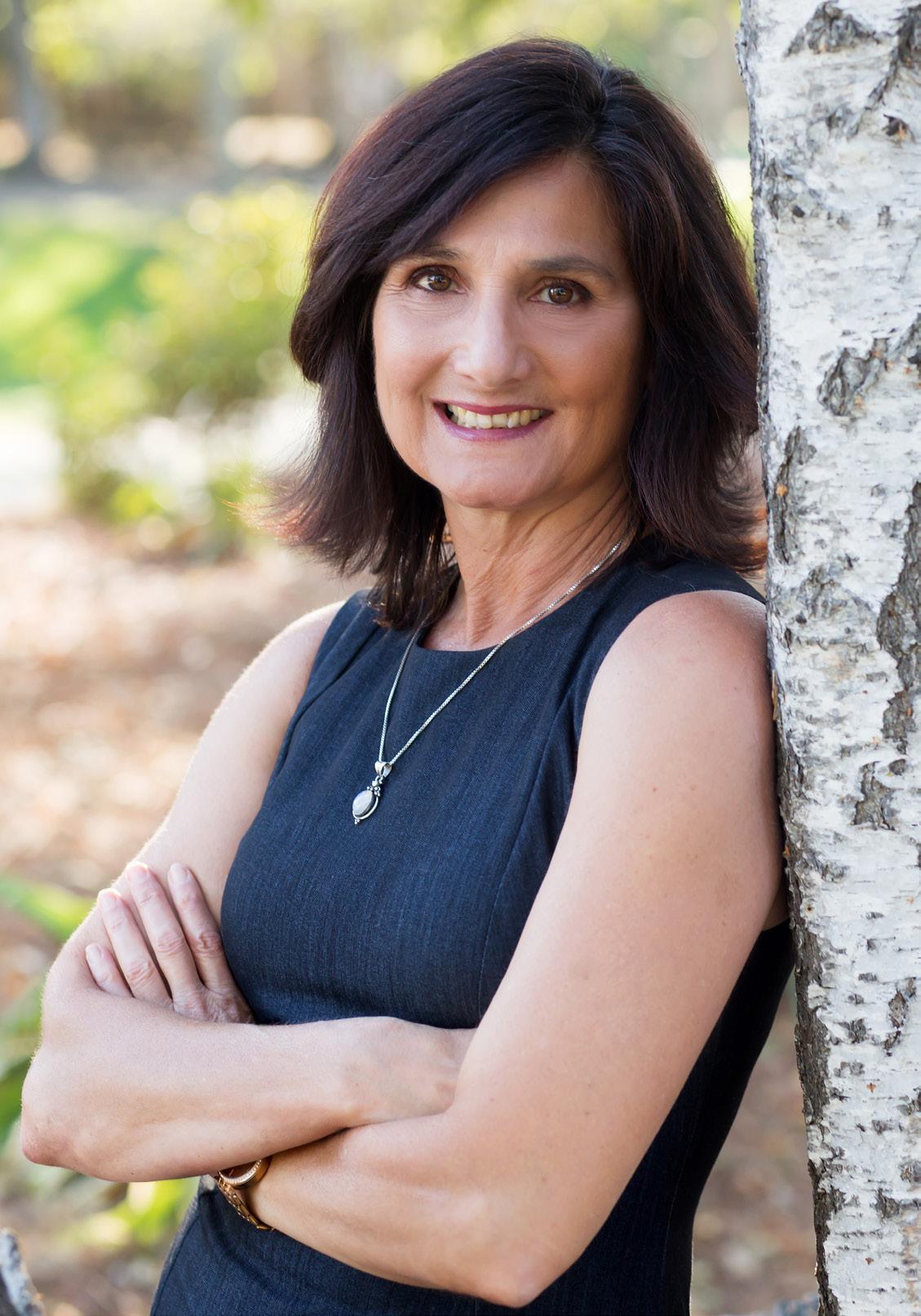
“The only reason I took this job is because of Michel,” Tiwana says. “When I started my law department here at ALE USA, it was thrilling, but I wanted to make sure that if I took on a job like the general counsel role, the boss would be someone I cared about, someone who respected me, and that I respected and liked as a person.”
According to Tiwana, having a boss like Ozanian is crucial for a demanding job like general counsel—not
Evaluate 156
“It’s my job to take notice of the folks on the team. It’s not about taking the glory upon myself. It’s the team that accomplishes the mission; there’s no glory alone. None.” Marcia
Michael Photography
because of the legal scope of the position, but because of “soft risks” that all too often go unnoticed.
“The legal technicalities, the knowledge, and the skills that are required for the position—those aren’t that hard,” Tiwana says. “They’re fairly easy to manage, especially with the many years of diverse experience I have and tools like Bloomberg Law. What may look easy but really isn’t is managing the soft risks, the difficult-to-navigate risks like personality risks, people risks, and corporate political agenda risks.”
Those risks are incredibly complex, sensitive, and often difficult to explain, Tiwana notes. Not only that, but they frequently come into direct opposition with one another, such as when the company’s goals contradict the legal department’s position or recommendation.
“In those moments, I have to explain to all sorts of different audiences what’s best for the company from my perspective,” Tiwana explains. “I have to become a business partner, a finance partner, a human resources partner, and a sales partner. But the real question is, how do you do that effectively?”
To Tiwana’s mind, it starts with simply getting out of your chair. “Go and talk to people,” she stresses. “Meet the people. Be yourself; bring your authenticity with you. When you genuinely empathize with that person’s position, you’re irresistible to them.”
Of course, this doesn’t mean that you have to agree with everyone. “I butt heads with people all the time,” Tiwana laughs. “But now, for example, if something changes in my world that impacts the financial side, I don’t have a hard time justifying it to our CFO because she trusts me and is likely fairly versed herself in the aspects of any legal issue that would impact finance—I have learned about her world and educated her about mine, and we communicate constantly about what’s going on because overcommunication eliminates any unwanted surprises.”
When you make this effort to truly engage with people, you don’t just get support for your argument or position, Tiwana says. You get “point people”—people with influence and a voice within the company who will have your back and help you raise your voice, too.
“I’ve got plenty of quarterbacks,” Tiwana says, “and partnering with them gets us results.”
Global Immigration Partners:
With 15 attorneys offering over 200 years of combined experience, GIP has risen to the top tier of business immigration law firms nationally, processing thousands of successful cases annually. Utilizing technology, GIP can offer competitive price points to its clients, alongside expertise and bullet-proof quality controls. Testament to this has been the firm’s growth to 50 staff, primarily led by client referrals.
As a point of pride, GIP’s structure is designed so clients may have unlimited attorney contact, while their fees remain fixed. From multinational PEO and established organizations to start-ups, GIP has been fueling businesses with foreign talent, through collaborative and customized solutions, with responsive personal service.

”Congratulations
to
Karina! It has been our privilege to work alongside ALE and the team for over four years as your strategic partner in bringing in, transferring, and retaining foreign talent.”
–Danielle, Jim, and Ron Gotcher
GLOBAL IMMIGRATION PARTNERS CALABASAS, CA | AGOURA, CA Business Immigration Law I-9 Compliance imminfo.com info@gotcherlaw.com +1 818 914 6482 157
New Opportunities in Renewable Energy
Ryan Bates excels at tackling challenges and navigating the ever-changing course within the renewable energy industry at Clearway Energy
By Bridgett Novak
BEING NIMBLE AND ADAPTABLE MAY not be traits typically associated with attorneys, but Ryan Bates says that’s what it takes to work in the renewable energy field.
As assistant general counsel and deputy compliance officer at Clearway Energy, one of the largest clean energy company in the US, he explains, “We’re in a very dynamic industry. It’s not easy to know what’s going to happen and when. You have to be OK with that kind of uncertainty.”
Born into a military family, Bates moved around a lot, so he learned to embrace change at a young age. After earning a degree in business administration and finance from the University of Arizona, he spent two years as a financial analyst at Motorola. “I got to work with the in-house attorneys during a divestiture and loved seeing the company’s overall strategy, rather than just my financial niche,” he recalls.
So instead of getting an MBA, he graduated from Northwestern University School of Law, spent a year at
Evaluate 158
Ryan Bates Assistant General Counsel and Deputy Compliance Officer Clearway Energy

Courtesy of Clearway Energy
Morrison & Foerster, and then joined the project finance and real estate group at Latham & Watkins, representing clients in acquisitions and divestitures; real estate, hotel, and casino developments; sports stadium financings; and energy-related projects throughout the US, South America, and Asia. “I liked building tangible things and being able to see the results of my work,” Bates remarks.
In 2011, he joined NRG Energy as senior counsel. The Fortune 500 company had just started partnering with some of the NFL’s most highprofile teams to provide wind and solar power to their stadiums. “Renewable energy was relatively new to NRG, and I had worked on some solar projects at Latham, so it was a really good fit,” Bates says.
In 2014, Bates was elevated to assistant general counsel of renewables. Four years later, NRG sold its renewable energy business and development pipeline to Global Infrastructure Partners, creating a stand-alone company with more than 4.1 gigawatts of solar and wind energy assets called Clearway Energy Group. Most of NRG’s renewable energy employees, including Bates and four other attorneys, made the move. “Clearway was like a start-up but already had funding, so we could focus wholeheartedly on growth,” Bates says.
“It’s great to be on the front lines of such an exciting industry,” he adds. “And being in a new, comparably small company allows us to shape things the way they make the most sense. We don’t have anyone telling us, ‘This is the way it’s always been done.’ We’re able to take a fresh look at everything to empower the business and help it succeed.”
That includes building up Clearway’s legal team and compliance
Big Brother Booster
Ryan Bates enjoys taking on big endeavors in his personal life, just as he does in his professional life. For many years, he served as a Big Brother and has served on the board of Big Brothers Big Sisters of San Diego County, a nonprofit youth mentoring organization, since 2015.
His wife, Lauren, is an adoption attorney, and their dedication to youth has been nourished at home via the adoption of their now two-year-old daughter, Charlotte (“Charlie”).
“Bringing her home from the hospital and having her in our lives has been so amazing that we’re planning to adopt another child soon,” he shares.
“We can’t wait!”
program as well as identifying ways for the company to increase efficiency, both in-house and with its outside counsel firms. That is especially important given that Clearway has wind and solar projects underway in twenty-six states, entailing myriad different regulations and permit requirements.
The company is even working with outside counsel to explore ways to use artificial intelligence to streamline processes. “For instance, when it comes to financing our projects, instead of paying highly compensated professionals to dial into an all-hands call and update a closing checklist, you could utilize a program that automates the closing checklist process based on documents’ input into a database. It frees attorneys up to do what they do best,” Bates explains.
In this vein, Clearway’s legal team is also creating matrices for the common provisions of oft-repeated documents and procedures. “This will empower people working on deals by showing them what to look out for, what the acceptable parameters are,” Bates says.
This strategy, for example, could be used to more effectively negotiate provisions of an M&A purchase agreement, such as the survival period for
representations and warranties. The survival period represents the length of time during which claims may be brought. “This period can vary greatly depending on the deal and the involved parties, but once you’ve done a number of deals, your company will have a range within which it is comfortable,” Bates notes. “We can make that information available to whoever is working on a project for us so everyone can be on the same page.”
Staying on top of the best ways to tackle whatever comes his way lies at the center of Bates’s work strategy. “It requires continuous effort—reading, going to conferences, meeting with finance professionals, regulators, and other lawyers, brainstorming with members of our team. This is a constantly evolving industry that is helping transform the world we live in. You have to stay one step ahead to help your company be successful.”
Baker Botts L.L.P.:
“Ryan excels at finding sensible, practical solutions to challenging issues based on innovative thinking and thorough legal analysis. He consistently demonstrates that he possesses the legal knowledge and skills to successfully support Clearway’s growth.”
–Martin Toulouse, Partner
Evaluate 160
A Family Approach to Legal Partnerships
Transitioning from outside counsel to Rausch Coleman Homes’ first ever in-house general counsel role, Josh Carson has helped build legal tools and support the business in its new markets
 By Joseph Charney
Josh Carson EVP and General Counsel Rausch Coleman Homes
By Joseph Charney
Josh Carson EVP and General Counsel Rausch Coleman Homes
Modern Counsel 161
Rausch Coleman Development Group, Inc.
THE REAL ESTATE INDUSTRY, FRAUGHT WITH highly regulated zoning and construction laws at all levels, is remarkably litigious. For a company like Rausch Coleman Homes, whose business spans six states and more than forty municipalities, navigating the legal mazes in its wide array of markets is critical to its success.
As the first ever in-house general counsel for Rausch Coleman Holmes, Josh Carson is responsible for understanding the nuanced legal environments of each community that the company serves. Before Carson was brought on to lead and integrate the company’s legal department, he had spent more than eight years at Jones, Jackson, Moll, McGinnis & Stocks, where Rausch Coleman Homes had become a mainstay client. Carson led the firm’s dealings with the company, considering it a “family business” since he had known the Rausch Coleman family for more than three decades.
“I quickly became familiar with the pace of their success,” says Carson. “In the industry we are in, we have to be fast—that’s just part of the game. We had to make sure that we were serving the client while we ran with them.”
Indeed, Carson’s initial outside work for Rausch Coleman Homes has proven invaluable for his current in-house role. “Knowing the pace that they operate at, I knew I couldn’t miss a beat,” he says.
Despite the familiarity he had with the company, the transition to an in-house general counsel position presented Carson with new challenges and responsibilities. “There’s a misconception that you’re dealing with a lot more clients in private practice than when you go in-house,” says Carson. “The way I look at it is, we’ve got one client but many more subparts involved.”
Working an issue from A to Z, says Carson, as opposed to responding to a particular issue or problem, results in far more interpersonal work. “The expectation is to assist the client from beginning to end and then to look for ways to improve even when you’re not asked,” he explains.
Carson was hired to integrate and synthesize Rausch Coleman Homes’ legal operations. “Given our magnitude, it was only a matter of time,” he says.
“Working with the founders, we made sure that we
built it into a process that supplemented the way the company already succeeded instead of changing its course.”
In the real estate industry, a “universal way” of doing this just doesn’t exist. “Our product—the acquisitions, the land development, the home building, and the home sales—is largely governed by local and state regulations,” Carson says.
Finding the right law firms for all of Rausch Coleman Homes’ needs is the crux of Carson’s work. He looks for responsive, fast-moving firms
that can be a “one-stop shop” for the company. “We’ve really streamlined facilitating the relationships we have with our local counsel in each of our markets,” he affirms. “It has allowed us to consider those outside firms as team members, instead of third-party vendors.”
Having an experienced law firm operate at a quick pace, Carson continues, “is the equivalent of having an experienced partner right by my side in each market.” According to him, a well-established
“The expectation is to assist the client from beginning to end and then to look for ways to improve even when you’re not asked.”
Evaluate 162
system of locating and onboarding new firms allows the company to keep its foot on the gas and flourish in stride when expanding to new markets.
“Wherever our founders see us is where I want to be,” Carson says, acknowledging that spreading to new markets in addition to growing current ones is a likely next phase for Rausch Coleman Homes.
Picking the right firm and harmonizing with various local partners comes with its challenges. Working with diverse groups that operate by different rule books requires considerable flexibility and adaptation. Not only do the laws and regulations vary depending on the market, but the law firms themselves operate differently from place to place. However, with a focus on streamlined processes and selective onboarding, the company’s current partnerships with its various local firms have allowed for more harmonious operations.
In addition to seeking out and partnering with local firms, Carson and his team frequently partner with both national and state homebuilders’ associations to lobby for legislation that helps homebuilders and home buyers. This approach allows Rausch Coleman Homes to achieve its business goals, both by partnering with savvy firms familiar with local laws and by working to change the laws themselves.
Carson mentions that Rausch Coleman Homes’ family-oriented work culture is what sets them apart. “There is no ‘operational ignorance’ or disconnect as you go up the hierarchies of management at Rausch Coleman,” he says, noting how everyone in the company is both invested in and knowledgeable about ongoing business endeavors. “Every team member, including our outside attorneys, contributes to each new roof that we provide to our homebuyer.” Thanks to Carson’s efforts, more firms in more markets are becoming efficiently integrated into Rausch Coleman Homes’ family.
Hornberger Fuller & Garza Incorporated is a San Antonio, Texas based firm that o ers a group of highly experienced lawyers with diverse backgrounds and experiences to meet the needs of our clients.
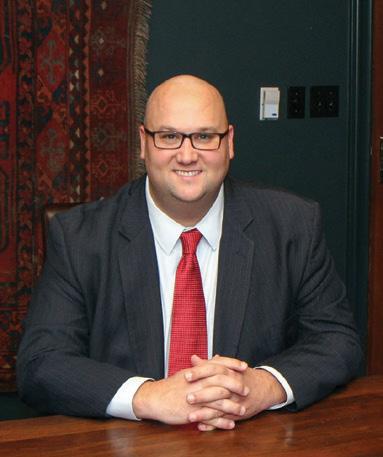













Committed to serving all clients, we o er a sophisticated practice in a wide range of practice areas, including trusts and estates, energy and natural resources, business and partnerships, real estate, and civil litigation. Our commitment to the highest ethical standards and quality of work is a significant part of who we are individually and as members of a diversified law firm.
Ty Hunter Sheehan Corporate, Securities, and Real Estate

210-271-1702
www.hfgtx.com
tysheehan@hfgtx.com
163
Stephanie Gayden’s
Fintech Focus at Goldman Sachs
Stephanie Gayden helps Goldman Sachs securely branch into fintech developments such as blockchain technology, AI, cryptocurrency, and smart contracts
By Bridgett Novak
Evaluate 164
Stephanie Gayden VP and Associate General Counsel–Technology & IP Group Goldman Sachs

FIFTY-THREE PERCENT OF CORPORATE EXECUTIVES say blockchain technology is a critical priority, with 40 percent planning to invest $5 million or more during the next twelve months on related initiatives, according to Deloitte’s 2019 Global Blockchain Survey. The survey also found that the financial services industry is leading the way in blockchain development, which is no surprise to Stephanie Gayden, a vice president and associate general counsel in the technology and IP group at Goldman Sachs.
“The blending of financial services and technology (aka fintech) is so exciting,” she says. “We’re currently seeing just the tip of the iceberg when it comes to unique tools that will be developed and implemented in the future.”
Gayden’s role puts her on the front lines of the 150-year-old global investment company’s digital transformation. “We’re looking at everything required to move transactions from paper to digital, which requires being current on all the latest and greatest technologies,” she explains.
Does that mean the attorneys on her team understand digital currencies and the technologies underpinning electronic financial transactions? “Well, we don’t have to be IT programmers or have that level of knowledge,” she explains, “but we do have to be good technicians when it comes to understanding the processes and being able to document them and ensure they are secure.”
Most experts say blockchain enables transactions to be decentralized, transparent, and immutable— all traits sought after by financial institutions and their customers. “It provides new levels of transparency and accountability,” Gayden confirms. It could also dramatically speed up the steps required for anti-money laundering (AML) and know your customer (KYC) procedures. As the Deloitte survey states, even leaders wary of tech-based solutions have come to see the transformational importance of blockchain technology.
In addition to blockchain, other new technologies Gayden’s team is studying include artificial intelligence (AI), cryptocurrency, and smart contracts. “Every new solution seems to have an AI component to it,” she says. “Over the past two years, we have begun to use a number of AI and natural language
Modern Counsel 165
“Every new solution seems to have an AI component to it.”
Glamour Shots
Strategic Solutions. Extraordinary Client Service.

processing solutions to review and analyze contractual clauses and changes.” This puts them right in line with Gartner’s recent forecast indicating that AI augmentation will globally create $2.9 trillion worth of business value and save 6.2 billion man-hours in 2021.
To ensure they stay on top of developments, Gayden’s team hosts in-house presentations on new products and services and attends legal tech and cyber conferences. “We take every opportunity to learn about the latest cuttingedge stuff.” She says this is a change since her early days at Goldman Sachs. “Back then, we thought we had to do everything in-house. These days, we turn to third parties for the best-in-class tools.”
Her US team consists of fifteen people, located in New York and Dallas. “Many of our attorneys come from the country’s top tech-oriented law firms and companies. Combining their training and experience with our understanding of the financial industry enables us to provide the best service possible to further the company’s goals,” she says.
“We put a lot of effort into ensuring these attorneys fit comfortably into both the company and the legal department. We have video team meetings and what we call ‘teachins.’ I’ve also set up programs to ensure everyone on the team has opportunities to work across divisions and functions,” Gayden notes.
Mentorships also play an important role. “Each person on the team has a mentor in the legal department to help them navigate the company and make sure they are given lots of opportunities to grow,” she explains.
Along with new technologies, another initiative Gayden works on is Launch with GS, the company’s commitment to
Perkins Coie LLP Attorney Advertising
PerkinsCoie.com
166
“Women-owned and minority businesses have historically been underserved by the funding ecosystem. We want to change that dynamic and widen the funnel of money going to these entrepreneurs.”
invest $500 million in women-led companies and investors. Since the program began in 2018, Goldman has invested $100 million in both women- and minority-owned businesses.
“Women-owned and minority businesses have historically been underserved by the funding ecosystem,” Gayden explains. “We want to change that dynamic and widen the funnel of money going to these entrepreneurs.
“In addition to getting capital into their hands, our involvement enables them to tap into Goldman Sachs’ corporate and institutional relationships and helps them network with other business leaders to build important connections,” Gayden says. “We want to invest in the best ideas wherever they come from and to increase the pipeline of future investment opportunities. We believe it is important that the investing world reflect the real world of fifty-fifty gender diversity, and we want to do our part to help it get there.”
Perkins Coie LLP:
“Working with Stephanie is always a privilege. Her depth of experience informs her handling of the most complex matters. Efficient, pragmatic, and passionate about her work, she keeps her focus on the underlying business issues in any transaction.”
–Richard T. Ross, Partner
SRD Legal Group congratulates Stephanie Gayden on her recognition by Modern Counsel and her outstanding work with Goldman Sachs as Associate General Counsel
Andy Hutcher, Senior Counsel
Jean Grevers, Senior Counsel
Suzie Scanlon, Managing Partner
SRD Legal Group is a womenowned, virtual legal services rm, skilled at leveraging the latest technology to deliver exceptional work that is high quality, affordable and ef ciently completed. We believe that our innovative model is helping to change for the better the way legal business gets done.
SRDLEGALGROUP.COM
C M Y CM MY CY CMY K SRD _ModernCounsel Ad RELEASE.pdf 1 9/26/19
167
An EverChanging World
Change is constant at JPMorgan Chase, and Eileen Shin loves it
By John Larrabee
Evaluate 168
MOST PEOPLE FIND THEIR HEADS spinning when they try to understand the ever-changing field of investment banking and global financial affairs. To Eileen Shin, however, it’s always been an exciting challenge.
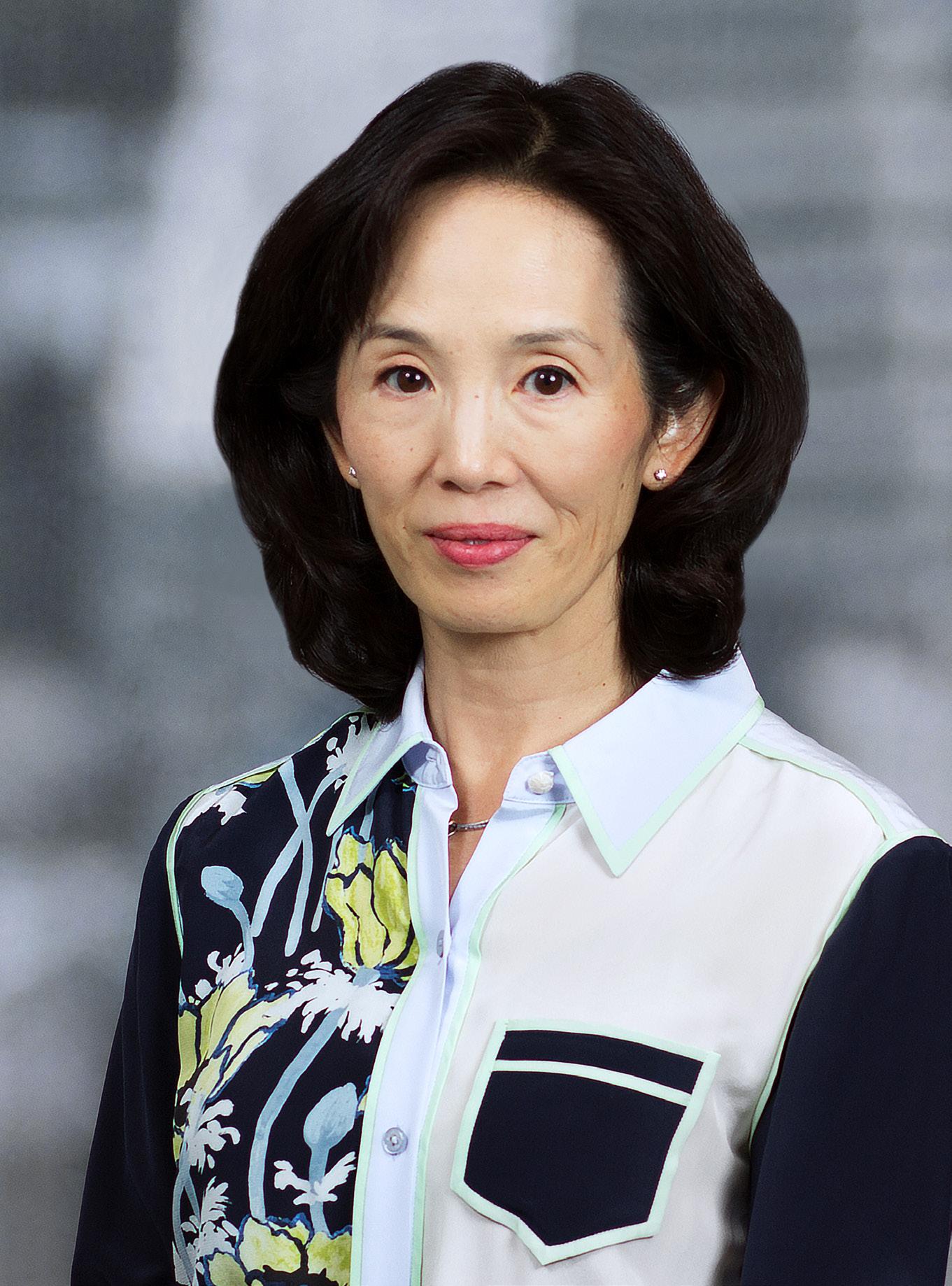
Shin is a managing director and associate general counsel at JPMorgan Chase, a leading global financial services firm with assets of $2.8 trillion and operations worldwide. The firm is a leader in investment banking, financial services for consumers and small businesses, commercial banking, financial transaction processing, and asset management.
“I love a good challenge,” says Shin, “and my work at JPMorgan provides for a highly transactional environment. The regulatory environment is always changing, and businesses are always evolving. Every day is different, and I thrive off of that.”
Meeting the Challenge of New Regulations
Transformation has been especially rapid in the financial services field since Shin joined JPMorgan twelve years ago. The economic downturn
“The regulatory environment is always changing, and businesses are always evolving. Every day is different, and I thrive off of that.”
Eileen Shin Managing Director and Associate General Counsel JPMorgan Chase
Modern Counsel 169
Courtesy of JPMorgan Chase & Co.
that swept the world in 2007 and 2008 prompted a wave of new laws and regulations impacting the industry, such as the Dodd-Frank Act, which became law in 2009.
Shin sees those changes as positive but also has some reservations. “Our CEO would be the first to say regulations have made JPMorgan and the banking system as a whole safer and stronger,” she says. “Much of what we saw in the financial crisis can’t happen again.
“But while we all recognize regulation has been good at addressing market failures, there’s also a consensus the pendulum can swing the other way,” Shin continues. “We can sometimes end up with unclear regulations that can lead to a lot of process and bureaucracy, and bureaucracy is something we try to be vigilant in fighting against.”
Today’s In-House Counsel Think Strategically
The legal profession’s adaptation to the rapid changes in today’s world is a strategy known as “T-shaped lawyering,” Shin notes.
“In the traditional model,” she says, “lawyers focus first and foremost on solving legal issues and developing specialized expertise. For example, we read the statute, research the regulatory and industry guidance, and apply our knowledge to particular facts or transactions. We review our contracts and learn how to negotiate issues.
“T-shaped lawyering refers to expanding one’s skill sets, competencies, and knowledge beyond traditional lawyering, partnering with the business in areas outside just straight lawyering. In today’s world, this means working in areas related to technology,
data governance, risk management, project management, and more. Today, lawyers are often pushed to move outside their comfort zone; you can feel like you’re a mile wide and an inch deep on many different matters. Specialized legal expertise is definitely still critical, but over time, it’s important for in-house lawyers to think strategically and evaluate how we can do our work better and more efficiently.”
All the same, Shin advises young attorneys to first focus on traditional expertise and move on to T-shaped lawyering further on in their careers. “There will always be opportunities to branch out into other areas,” she says. “But the more senior an attorney one becomes, the greater the demands that
are coming from many different directions, and one can’t afford the time or bandwidth to go deep in a particular area.”
As a young adult, Shin had the opportunity to travel in Europe and Asia, and that experience helped direct her to her career path. “I went to law school with the idea that it could fund my wanderlust,” she says.
She first worked as an associate at Simpson Thacher & Bartlett, becoming a securities lawyer who sometimes handled assignments for JPMorgan. She postponed her globe-trotting plans, opting to first raise a family, but her current position still pro -
“Over time, it’s important for in-house lawyers to think strategically and evaluate how we can do our work better and more efficiently.”
Evaluate 170
vides a worldwide perspective. “At JPMorgan, I enjoy the privilege of working with and supporting global franchises,” she says. “A large portion of the investment banking business I support is cross-border in nature, and many of the colleagues I regularly work with are in our offices around the world.”
Keeping Up with a Volatile World
These days, Shin’s work is often focused on Central and South America. “We have leading franchises in Latin America, and I support our businesses that raise capital in the international markets for Latin American companies and countries,” she says.

“Like in many emerging markets, a lot of big business is concentrated among an economic elite that goes back generations, with companies that have been owned or controlled by families or governments. In these countries, the dynamics of negotiations can be different; in different cultures, people communicate differently, and as lawyers, we need to adapt to a variety of cultural environments.”
Shin’s job allows her to live in one of the world’s most exciting cities, New York, with her husband and two children, who are both enrolled in a Mandarin immersion school. Before turning to law, she obtained a graduate degree in piano performance from the Eastman School of Music in Rochester, New York, and today, she sometimes performs with her kids, who both play string instruments.
She also appreciates her work family. “At JPMorgan, I’m lucky to have access to the best and brightest lawyers,” she says. “I’ve learned so much working for this firm.”
NEW YORK BEIJING HONG KONG HOUSTON LONDON LOS ANGELES PALO ALTO SÃO PAULO TOKYO WASHINGTON, D.C. Simpson
Supports the Work of Eileen
of J.P.
We Applaud Eileen on Her Vision and Industry Leadership
Thacher Proudly
Shin Managing Director and Associate General Counsel
Morgan
Simpson Thacher & Bartlett LLP:
“Eileen is very talented, smart, and savvy. Her leadership and commitment to excellence set her apart in the industry and make her exactly the kind of counsel that Simpson Thacher attorneys enjoy working with.”
171
—Jaime Mercado, Partner
Power to the People
Jack Garfinkle is helping PECO stay close to its customers and involved in its local community
THERE ARE FEW INDUSTRIES AS regulated as the energy sector, and for PECO’s Jack Garfinkle, organizing those regulations means harmonizing a wide set of skills he has accumulated as a lawyer in both firm and in-house roles. It’s also meant mining his political science undergraduate degree in a capacity that the associate general counsel says he hadn’t considered prior to coming to the company nine years ago.
By: Billy Yost
“I don’t think I realized initially that this position would be located at the intersection of politics and the law,” Garfinkle says. “I’ve really enjoyed the fact that we interact with the government and numerous stakeholders to work on a litany of issues, including new legislation, that will impact the
Evaluate 172
industry as well as our customers.” Garfinkle says PECO’s increasing renewable energy options for its customers, as well as the company’s front-andcenter focus on community involvement, is keeping the Pennsylvania energy company close to the customers who keep PECO’s energy flowing.
For an industry where the bare minimum of customer satisfaction begins with uninterrupted and unqualified access to energy, Garfinkle says his job requires a substantial dose of patience. “We operate in a very highly regulated environment. For most proposed projects, we can’t just flip a switch and go forward with it,” Garfinkle says. “We like to say we’re very planful at PECO; as soon as we come up with an idea, the first thing we have to do is figure out a timeline for it.” Unlike most industries, where an idea can give way to almost immediate execution, the number of regulators and stakeholders in the energy industry means that even what may seem like a mundane initiative can take a good chunk of time.
These extended timelines mean Garfinkle works harder than most lawyers to combat the idea that legal is there to put hurdles in the way of the business. In fact, it’s exactly the opposite. The amount of involvement that legal has to have because of the very nature of the business means the department is involved in a lot more of the entire business strategy from beginning to end. “Many companies have legal and business issues to contend with on a regular basis, and some also have government and regulatory issues, but for us those issues permeate through almost all of our projects,” Garfinkle says. “It’s incumbent on my team to shepherd these projects
Jack Garfinkle Associate General Counsel PECO
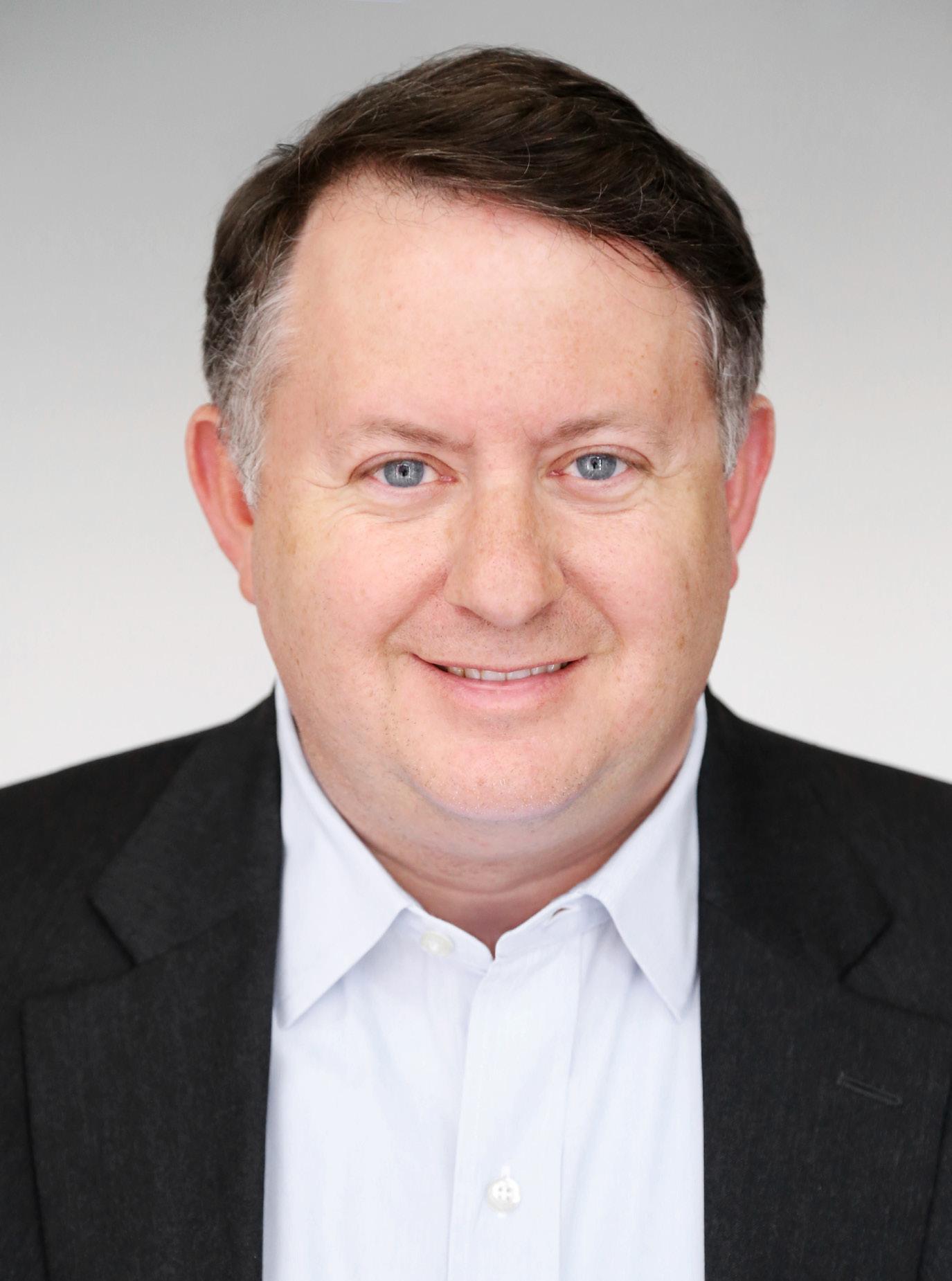
“As technology improves and customer interests become more focused on the environment and climate change, we’re making sure we stay ahead of it.”
Modern Counsel 173
Christopher Descano
through the process—you can’t get through it without the lawyers.”
Garfinkle says that aiding in the execution of strategy ultimately comes down to wanting to do right by PECO’s customers. “We spend a lot of time thinking about our customers in this rapidly changing industry,” Garfinkle says. “Only twenty years ago, we were a company that generated electricity primarily by coal or nuclear power. Clean and renewable energy is very popular with our customers, so we continue to find new ways to develop plans for what a future utility provider looks like and the various ways we can support this type of energy.”
PECO has created and evolved a number of award-winning programs aimed at helping its customers be more efficient and energy conscious. Home-energy audits, old appliance recycling, and solar innovations are all either in practice or in the works. “It may sound counterintuitive to work with our customers to use less energy, but that’s exactly what we’re trying to do,” Garfinkle says. “As technology improves and customer interests become more focused on the environment and climate change, we’re making sure we stay ahead of it.”
Along with its burgeoning renewable emphasis, PECO has earned a reputation as a strong community partner in Pennsylvania. “If you walk around Philadelphia, you’ll see our name as a sponsor on everything

“We like to say we’re very planful at PECO; as soon as we come up with an idea, the first thing we have to do is figure out a timeline for it.”
Blank Rome LLP
proudly congratulates Jack Garfinkle on his recognition by Modern Counsel.
Attorney advertising. © 2019 Blank Rome LLP. All rights reserved. 174
We are inspired by your leadership and honored to work with you!
from charitable events and museum programming to various community groups,” Garfinkle says. Along with other members of PECO’s leadership team, Garfinkle participated in a yearlong Leadership Philadelphia program that teaches participants about the city from a number of different perspectives, with the ultimate goal of promoting its graduates’ participation in nonprofit organizations.

Following Garfinkle’s participation, he joined the board of the Walnut Street Theater, which is the oldest theater in the United States and has the largest subscription base of any theater in the world. “It’s a very different business than my day job, but it’s such an interesting place to be. They provide great services to children and others in the community.”
Within PECO’s own legal department, a robust pro bono program encourages all internal lawyers to give back. Most recently, lawyers provided free name changes for members of Philadelphia’s transgender community and participated in a Wills for Heroes event, which provides wills for first responders. The general counsel of Exelon, PECO’s parent company, and PECO were among those who attended the event. “It’s not just lip service here,” Garfinkle says. “I’m proud to say that this mentality of providing pro bono service to our communities is from the top down.”
www.morganlewis.com © 2019 Morgan, Lewis & Bockius LLP We congratulate JACK GARFINKLE, associate general counsel at PECO Energy Company, for his career accomplishments and well-deserved recognition by Modern Counsel . 175
People & Companies
Greg Ansems P100
Divisional Chief Intellectual Property Counsel Honeywell International
Ryan Bates P158
Assistant General Counsel and Deputy Compliance Officer Clearway Energy
Josh Carson P161
EVP and General Counsel
Rausch Coleman Homes
Iris Chen P66 VP of Legal Google
Ryan Collins P26 VP of Legal and Assistant General Counsel NGL Energy Partners
Hoyt (CJ) Davis III P34 Assistant General Counsel for Sports Business and Legal Affairs
PUMA North America
Kerith Davies Knechtel P80 Senior Corporate Counsel Priceline
Amanda Dittmar P74 Intellectual Property Counsel Viavi Solutions
Brian Friedman P148 Director of Litigation and Regulatory Counsel
JetBlue Airways
Jack Garfinkle P172 Associate General Counsel PECO Energy
Christopher Garvey P128 SVP and Deputy General Counsel of Litigation & Regulatory Enforcement Fifth Third Bank
Greg Lyons Partner Debevoise & Plimpton 212.909.6566
gjlyons@debevoise.com
Gregory J. Lyons is cochair of Debevoise’s Financial Institutions Group. His practice focuses on serving the needs of financial institutions in regulatory, transactional, and other matters.
Stephanie Gayden P164 VP and Associate General Counsel— Technology & IT Group
Goldman Sachs
Matías Hercovich P43
Global VP of Legal
Selina
Glenwood Hill P135
Assistant General Counsel
Preston Hollow Capital
Howard Hirsch P18
Chief Legal Officer
Griffin Capital Essential Asset REIT
Jacqueline Hobbs P119
Associate General Counsel
Duke Energy
Greg Hoffman P117
SVP and General Counsel
Farm Credit Mid-America
Diane Honda P77
Chief Administrative Officer, General Counsel, and Secretary
Barracuda Networks
e efef bbfb
Index 176
Jennifer Judge P121
SVP and Deputy General Counsel
Caliber Home Loans
Michael J. Fortunato President Rubin, Fortunato & Harbison PC
610.408.2005
mfortunato@rubinfortunato.com
For nearly three decades, Mike has represented clients nationwide in court and in arbitration with respect to the employment laws that govern today’s workplace.
Daniel Kelly P22
Deputy General Counsel, Corporate Services
Vista Outdoor
Kate Kelly P108
VP, Associate General Counsel, and Corporate Secretary Bristol-Myers Squibb
Sophia Hudson Partner Kirkland & Ellis LLP
212.446.4750
sophia.hudson@kirkland.com
Named a 2019 Finance, Banking & Capital Markets Trailblazer by the National Law Journal, Sophia Hudson advises issuers and underwriters on capital markets transactions, and corporate clients on governance and securities law matters.
Michael Lanza P10 EVP, General Counsel, and Chief Compliance Officer
Selective Insurance Group
Suzy Lee P85
VP and General Counsel
Toshiba American Electronic Company
Eric Lentell P89 VP and Deputy General Counsel
FitBit
Brian Levey P92 Chief Business Affairs and Legal Officer
Upwork
Jerry Levine P71 General Counsel and Corporate Secretary IPsoft
Robert Mignanelli P14 SVP, Chief Operations Officer, and Associate General Counsel of Technology, Operations & Strategy
Pearson
Joy Saphla President, Morae Global Corporation 713.244.6003
joy.saphla@moraeglobal.com
Joy Saphla has more than twenty years’ experience delivering sustainable results and providing strategy, people, process, technology, and data-related solutions to improve law departments’ business performance.
Ron Peppe P151 VP of Legal & Human Resources, Corporate Secretary, and Director Canam Steel Corporation
Stephanie Plasse P144
SVP and Deputy General Counsel
A+E Networks
Ronald Prague P104 Chief Legal Officer
Synchronoss
Rob Rieders P96 General Counsel
Postmates
Leigh Ryan P140 Chief Legal Officer and Chief Compliance Officer
Teleperformance
Megan Ryan P138
EVP, General Counsel, Chief Legal Officer, and Chief Compliance Officer Nassau Health Care Corporation
Roland Schroeder P50 Global Executive Litigation CounselGE Corporate General Electric
Randy Sharbono P39 VP and Assistant General Counsel Schwan’s Shared Services
Modern Counsel 177
Danielle Sheer P56 General Counsel
Bottomline Technologies
Roxane Reardon Partner Simpson Thacher & Bartlett
212.455.2758
rfreardon@stblaw.com
A leading capital markets advisor, Roxane Reardon regularly represents issuers and investment banks in exploring and executing registered and Rule 144A offerings of equity, equity-linked, and debt securities.
Vishal Sunak CEO and Cofounder
LinkSquares
857.997.0022
sales@linksquares.com
LinkSquares is contract management and analysis powered by AI. Understand risks and liabilities in minutes with powerful text search, automated metadata extraction, and custom reporting.
Eileen Shin P168
Managing Director and Associate General Counsel
JPMorgan Chase
Steve Sparks P46 SVP and General Counsel
Hershey Trust Company
Karina Tiwana P154 General Counsel, VP, and Secretary— North America
Alcatel-Lucent Enterprise
Deryl Ward P114 VP and Deputy General Counsel Builders FirstSource
Deborah Wright P31 Prudential Financial VP–Corporate Counsel and Prudential Asset Resources General Counsel
Prudential Asset Resources
e Index 178
We are pleased to support the in-house leaders featured by Modern Counsel with whom we are honored to work.

Modern Counsel 179 Congratulations
AI-Powered Contract Management and Analysis






IMPROVE KEY BUSINESS ACTIVITIES


MERGERS & AQUISITIONS

Review an entire database of contracts quickly to understand risks and commitments.



















FINANCING EVENTS








Easily create reports across your entire database of contracts and search for key terms.
CRISIS MANAGEMENT




When unforeseen events occur, easily understand obligations to customers and key stakeholders.
DUE DILLIGENCE
Have key information ready at all times with instant search and metadata extraction.


BUDGETING

Set up notifications for automatically renewing contracts to proactively manage cash flow.


TRUSTED BY
Understand risks and liabilities in minutes, not months. Stop reviewing contracts manually, and start saving time with powerful text search, automated metadata extraction, and custom reporting. www.linksquares.com

REPORTING
Report on revenue recognition issues, renewal rates, and key company metrics.














| sales@linksquares.com Know What's In Your Contracts

 Michael Lanza innovates in the insurance industry with Selective Drive P10
Kate Kelly talks acquisitions and thinking forward at Bristol-Myers Squibb P108
Michael Lanza innovates in the insurance industry with Selective Drive P10
Kate Kelly talks acquisitions and thinking forward at Bristol-Myers Squibb P108



 Cover: Gillian Fry; Courtesy of Honeywell (Ansems), Jay Tsai (Chen)
Cover: Gillian Fry; Courtesy of Honeywell (Ansems), Jay Tsai (Chen)

 P96
P96

 P128
P128
 Hana Yoo Managing Editor
Hana Yoo Managing Editor

 Peter Vidor Photography
Peter Vidor Photography
 By Sara Deeter
By Sara Deeter




 Daniel Kelly
Deputy General Counsel, Corporate Services
Vista Outdoor
Daniel Kelly
Deputy General Counsel, Corporate Services
Vista Outdoor






















 Hoyt (CJ) Davis III
Counsel, Sports Business and Legal Affairs
PUMA North America
Courtesy of PUMA North America
Hoyt (CJ) Davis III
Counsel, Sports Business and Legal Affairs
PUMA North America
Courtesy of PUMA North America






 By Kathryn Kruse
Matías Hercovich Global VP of Legal Selina
By Kathryn Kruse
Matías Hercovich Global VP of Legal Selina





 Danielle Sheer General Counsel
Danielle Sheer General Counsel









 Danielle Sheer
Danielle Sheer









































































 Andrew
Andrew

 Jay Tsai
Jay Tsai




 –Karineh Khachatourian, Partner
–Karineh Khachatourian, Partner




































 Courtesy of Postmates
Courtesy of Postmates







 By Lori Fredrickson
By Lori Fredrickson















 —Jeremy Suiter, Shareholder
—Jeremy Suiter, Shareholder













 Assistant General Counsel
Assistant General Counsel
 Greg Daniels Partner, Columbus
Greg Daniels Partner, Columbus















 By Joseph Charney
Ron Peppe
By Joseph Charney
Ron Peppe




 By Joseph Charney
Josh Carson EVP and General Counsel Rausch Coleman Homes
By Joseph Charney
Josh Carson EVP and General Counsel Rausch Coleman Homes
















































































